#honerva meta
Explore tagged Tumblr posts
Text
Speculation on Lotor's Armor
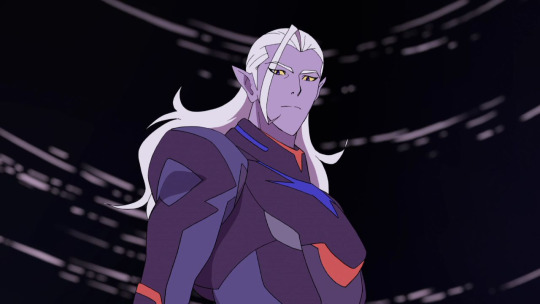
It's time for more unnecessary speculation about Lotor because I miss him. Last time we addressed Lotor's appearance, we talked about what was up with his incredible hair (here), now I'd like to discuss his iconic armor, the potential history behind it and how it services his character.
Even just at first glance in his introductory scene, Lotor clearly stands apart from his fellow Galra and not just due to his features. Even before we see his face, his unique stature and attire speaks volumes about the character we're about to meet as the colors and overall style bears no resemblance to anything we see a typical Galra wear - nor anyone else for that matter - singling Lotor out as a unique and unpredictable individual. So, why does he choose to dress so differently?

One interesting and inescapable truth about Lotor's armor is that it perfectly matches the color scheme of his cat, Kova, to such a specific degree that it can be no accident, so it only makes sense that Lotor himself decided to create or commission a suit to match. But why? Well, given the childhood that Lotor had to endure, it's not hard to imagine the inspiration was simply due to his allegiance to the fellow quintessence-touched creature. A way to honor it as the only true friend and companion he's ever had and the only thing that's ever truly been his or, at least, the one thing he chose for himself. Kova no doubt played a huge role in his lonely life and was probably the only decent thing in it as, for someone who had no real or meaningful connections, this relationship would naturally become incredibly important to him - important enough to showcase visually. In this way, perhaps the decision isn't just a matter of honoring a friend, but also perpetuating his own individuality as defined by his relationship with his cat as something that belongs solely to him.
However, if we dig deeper into this, things get more interesting.
When I was originally writing this meta, I was looking for clues in Lotor's main design that could legitimize the idea that he would have tailored it to honor his Altean side (as he clearly isn't dressed like a Galra), as I think that would make a lot of sense for his character. Unfortunately, there's nothing incredibly obvious in his clothing that matches the aesthetic of the Alteans we see in the show as the style and color palette just don't align. This makes sense, I suppose, given that Lotor would never know exactly how they dressed even if he wanted to emulate them. And then I thought harder about Kova...

Given that he was originally Honerva's pet and she's Altean and therefore is from there as well, one could argue that designing his appearance after Kova was, intentionally or not, reflective of Altean culture to some degree. And if Lotor devised that Kova was originally Honerva's, his signature look could also be a way to remember his mother as well as her culture, both of which he deeply admires and are intrinsically part of himself. At this time, he believes all Alteans to be extinct, making him (and Kova) the sole keepers of their legacy and he chooses to wear that proudly. Ultimately, Kova isn't just his best friend, he's also a connection to his mother and Altea and all the things he holds dear and thus becomes his own personal mascot of sorts.
This decision is also deliciously ironic given that his chosen appearance is simultaneously an unintentional extension of Haggar as well, whom he despises but cannot fully escape. Just as Honerva and Haggar are two halves of the same person and Kova, therefore, belonged to both, the style Lotor chooses is also inextricably a reflection of Haggar just as much as it is Honerva and what they represent to him: corruption as well as purity - which is an interesting contrast in regard to Lotor's character.
Speaking of contrast, it's worth noting that there is, of course, a distinct and purposefully clashing styles between the Galra and Alteans. The former made up of sharp edges and intimidating reds and blacks while the latter is defined by soft shades of blue, gold and pure white. Both designs are successful in respectively encapsulating a race who's known only war and another that promotes peace. With a parent from each, Lotor naturally stands somewhere in between these opposing views both in his internal struggles as well as an outward appearance that doesn't conform perfectly to either. Lotor's style, therefore, is an interesting amalgamation of his roots, an echo of their inherent conflict, and a bold statement to all who see him who he is and where he stands.
So, we have an idea of the inspiration behind the armor, but when did he implement it?
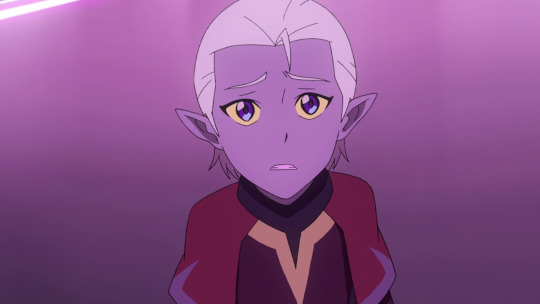
We see in some flashbacks that young Lotor did wear Galran styled clothing. Though he cannot change the reality of his mixed blood, he can try to speak, act and dress as a Galra - all actions that a young prince would be expected to uphold but also probably pushed himself to practice and perfect in order to assimilate himself better into their society and appeal to his father. However, there's a huge unexplored time gap between what we see of Lotor's childhood and him as an adult who has already adopted his very divergent final look with no real explanation. That's why I mainly want to address the flashback in 8x02, as it's the youngest adult version we see of Lotor and marks an influential event that I feel could have had a grander effect with a few tweaks to his design.
At the beginning of the flashback, we see Lotor and Kova together - the proximity affording the audience a strategic reminder of their unmistakably similar color schemes and of their bond. Now, perhaps his appearance remains unchanged here simply to make it easier for the artists and animators so they could avoid designing a new look for him for only one scene, but I personally find it a wasted opportunity to benefit the story further by showing Lotor at a very different point in his life and a different appearance would certainly help reflect that.

Personally, I would have liked to have seen him in more traditional Galran clothing here and maybe even sporting slightly shorter hair - even if only for the selfish desire to see Lotor look somewhat different at some point during the course of the entire show. The hair would help to indicate that he's a little younger here (though we don't actually know how long ago it was) and the traditional armor would supplement the story visually by showing him still bearing some ties to his Galran heritage at this point as he continues to try to prove himself to his father that he is an effective and worthy son. He does want to change things though and help his father see there are other, more merciful ways of reaching their goals and by appearing as a Galra in the best way he can, he could perhaps make his sentiments more palatable.
Of course, things go horribly wrong and this flashback details one of the biggest shifts in Lotor's life. In the span of one scene, he transforms from dutiful Galran prince trying to please his father to exile who has severed all ties to the Galra, all hopes of appealing to Zarkon and is now determined to bring him down. Until this point, Lotor has struggled and failed to be the prince his father and the rest of his people would approve of and changing his entire appearance after his exile would really punctuate his literal and symbolic divergence from the Galra by creating a look and identity all his own with no aesthetic connection to them. Lotor, at last, is taking control over his own life and no longer living in his abuser's shadow. Naturally, the change is openly rebellious - an unmistakable rejection of a culture that rejected him and a slap in the face to all who see him. He's charted his own course and pledged allegiance fully to himself and what he believes in. Lotor's generals are also tasked to wear the same style clothing as him - a clear sign to all who see them to whom they serve.
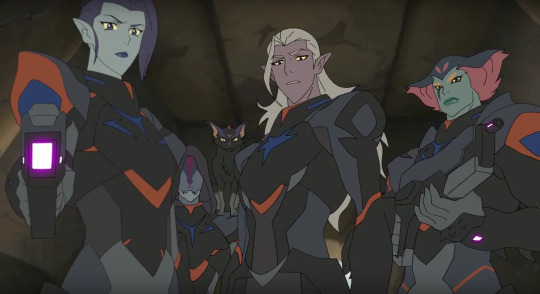
Of course, there could be other explanations that accommodate the writers need for him to maintain this look:
Perhaps Lotor just changed his look as an angsty teen who wanted to rebel perhaps. My issue with this idea though is that I don't think Zarkon would have approved of him dressing as anything less than a Galran prince is expected to and, as we see of Lotor even as an adult in the flashback, he's still trying to present himself the best he can to his father, and I don't think he'd take the risk of angering him just to feel more independent as Zarkon will use any excuse to punish him. I like to think that Lotor's outburst against his tactics in this flashback is the first real time he's ever rebelled against his father, hence the surprise and severe punishment. Lotor would never want to willingly incur his wrath unless over such an important thing as the lives of others - another reason why I think changing into his final look after his exile is the best narrative choice. Only after being formally expelled from the empire, I imagine, Zarkon would no longer care about seeing Lotor maintain a Galran appearance and would no longer protest to seeing him dressed differently.
Or, maybe he only recently adopted the new look while staying on Ven'tar's planet with Kova for a year. Perhaps, in his first real venture outside of Zarkon's shadow and Galran culture, he became more independent, more self-assured and wanted to adjust his attire to reflect that growth. To make something of himself on his own and define himself as an individual who is open to clothing untethered to just one culture. Maybe this decision was also partially bolstered by his inclination to make the people he's leading feel more comfortable around him as well by presenting himself as different than the other Galra they know and fear. Of course, during his conversation with Zarkon, we also learn that Lotor now knows about his Altean roots and that potentially recent discovery could also have played a role in his desire to alter his appearance (using Kova as his muse) as his time away gave room for him to begin to distance himself from the Galra and begin his exploration into his Altean heritage. Again, though, I don't think Zarkon would naturally approve of seeing him in foreign attire (especially inspired by Altea). He doesn't care about Lotor but he does care about maintaining his image as a Galra prince and projecting the strength and authority that title brings over others as demonstrated in this scene.
Ultimately, regardless of the exact origins, this visual separation from the Galra serves to aid Lotor in his quest to transform the universe by presenting himself as someone who stands apart from the rest of his race and their ruthless ways. He's independent with a unique appearance to match his unique manner of leadership and ideas for the future. Presenting a wholly personal choice of style that acts as a natural extension of himself and a love for his Altean heritage as inspired from the only friend he ever really had.
So, there you have it! That's my unnecessarily long take on why Lotor dresses to match his cat.
#vld#voltron#lotor#prince lotor#kova#zarkon#honerva#haggar#v:ld#voltron: legendary defender#lotor meta#vld meta#voltron meta#vld lotor#lotor vld
116 notes
·
View notes
Text
INTERESTING
I feel like very often there’s a benevolence and innocence ascribed to pre-rift Zarkon and Honerva that wasn’t really… who they were.
Yes, Honerva was interested in science and the furthering of knowledge above all else, and she wasn’t the type to tie people to operating tables and torture them for her own gain. Yes, she fell in love with Zarkon, and I really do think she meant that. Even without her memories in s2, she unambiguously worries about Zarkon, and is defensive of her place by his side, and that’s not fear of losing power- in s5 we see that Haggar unapologetically sets up Sendak as a bid for the throne without any hesitation, confident that she can win out over the other contenders.
Keep reading
423 notes
·
View notes
Text
Jesse's Blog Masterpost
Hey people of Tumblr! I've created a lot of art, fics and metas in the past few years. Although I dab into other fandoms too, VLD remains the focus of this blog - in the form of illustrations, fanfics and metas (some artworks are still available as prints in my Ko-fi shop). This is an updated masterpost of links to the most representative artworks and fanfics, as well as every meta I've written. Yup, a lot of Lotura. :)

VLD art (#jesseblue draws) Here are some of my favorite artworks created in the past few years: Dancing Allura Here's Some Alchemy Lotor gets a massage Bedtime Lotura Allura on the Moon Halloween Lotura New Year Lotura Lotura's Alchemy Lasts Forever - my most popular artwork Plance Dance Wardrobe Updates - Lotura Week 2023 entry Beach Day - Lotura Week 2023 entry Wardrobe Updates - Lotor - Lotura Week 2023 entry Wardrobe Updates - Allura - Lotura Week 2023 entry Lotura's Celestial Wedding Lilac Love - Lotura Week 2024 entry Drawings inspired by other writers' fics: "Quiet!" - a Pidge and Keith drawing Lotor clawing his way out of a muddy situation DotU Lotor chopping wood Some art was created for my fanfic "Nothing Ever Truly Goes Extinct": Story banner "Allura, please..." Lotor's Pirouette Space Mouse in Pilot Suit Melancholy Angry Romelle Don't Mess With Acxa She Is Beauty... We Will Win "Though She Be But Little" Acxa and Jesse VLD-TDP cross-art Aaravos and Lotor Find my VLD fanfiction on AO3 here (#jesseblue writes) All my VLD metas (#jesseblue writes) The Two Alluras: An analysis of some potential post-animation edits and errors in several scenes during the last episode, when the Paladins face Honerva in the Connected Consciousness.
Oh No, Lotor: Why Lotor should not be among the Paladins of Old in the final scenes of VLD.
Sleeping Allura: Some logical deductions based on basic rules of cinematography, regarding the very last scene in S8E10 - Knights of Light Part 2.
Decoding Voltron’s Rosetta Stone: My biggest meta (seriously, it’s really long), an interpretative analysis of numerous symbols in the official VLD comics - which, at a first glance look absolutely innocent, yet oftentimes eerily cryptic, especially the Yalexian Pearl book.
Lion vs. Wolf: An extension of the previous meta, focused on a comparison between the White Lion - Guardian of Oriande and Gantomor - Warden of the Sacred Hunting Grounds (comics).
So Safe and Warm: Why “Luxia’s Kingdom” actually reads “Altea” in the last commercial scene of “The Feud”.
Petrulius - What Happened to You?: Questioning the purpose of Lotor’s pods on the moon colony, by comparing the images of Petrulius and the original (doctor) Haggar.
Allura Drawn over Lotor (with gifs): Mostly a visual meta with gifs, showing Allura was drawn over Lotor in the last episode, as part of the post-animation edits.
I Have Beezer Questions: Several observations regarding animation inconsistencies during the Allura and Lance first kiss scene, most notably their flipped placement on the screen and Beezer’s trajectory.
A Noble Cause: An interpretation of Allura’s vision in Clear Day, if we were to start from the premise that Lotor was infusing his moon Alteans with the Entity. The Zarkon-Honerva-Lotor meta trilogy - an in-depth analysis of the profound reasons that led to the tragic descent into madness of these three antagonist characters. Prepare for reading some long metas, especially Lotor's: Slowly Going Mad - Part I - Zarkon Slowly Going Mad - Part II - Honerva Slowly Going Mad - Part III - Lotor I also wrote one short meta about Aaravos, from The Dragon Prince (my speculation turned out to be true, heh).
#masterpost#vld meta masterpost#voltron#jesseblue draws#jesseblue writes#lotura#I guess I can add the lotura tag#since my art is mostly about Lotura
12 notes
·
View notes
Note
Are there any particular characters we can expect to see a focus on in this meta? A lot of the old meta I’ve read have only seemed to focus on 2 to 3 characters at a time so I’m interested to know what you’ll be doing if you’d like to share !!
Ooo, wonderful question!
It'll vary - we'll be tapping into the missing plot + a multitude of characters, but more specifically the Main Paladins and their respective plots / subplots, Honerva's resolve, and Lotor's purpose.
We'll also lightly touch on Romelle and her position on the Altean Colony.
I will say that...
*Drumroll please*
Lance will have a greater exploration and focus intrinsically throughout, because the remnants of Season 8 have his DNA planted in the roots: Acceptance, Love, and trusting his own instincts.
This is the finality of his overall arc that's been culminating from season-to-season.
There's several events that occurred that was cut in relation to his own developing arc.
Zenith.
#vld#vld meta#voltron#voltron meta#allegedly#allurance#klance#lotura#macross theory#uncharted regions#get in the robot lance
10 notes
·
View notes
Text
My Thoughts on Honerva’s Arc (S8 of Voltron: Legendary Defender)
SPOILER WARNING for Voltron: Legendary Defender, obviously. Also obligatory disclaimer: the following is solely my opinion and should be treated as such. I know there were several production problems that led to the show becoming what it is, but I am not informed on those issues and won’t be speculating on how they specifically influenced the show.
I’M GONNA SAY IT: Honerva’s arc could have been soooo interesting if the lead-in had been better instead of tacking it onto the end of the whole “beating the Galra Empire” mega-arc. Honestly, the end of season seven felt like the natural end of the series, and if they had changed a few things it could easily have been an open yet resolved ending. The main plot-line has been wrapped up because all the major Galra Empire villains from the show (apart from Honerva obviously) have been defeated, but there’s still a lot of work to do in order to completely free the universe. The show could have ended with the Paladins getting ready to re-launch and looking towards the future, which also opens up the possibility for spin-offs or even a sequel series. IMO, everything from season 8 (and the weird Altean Robeast attack at the very end of S7) would have been much better if it had been its own series. There could have been more focus on Honerva’s downfall, how she plotted to use the Altean colony just as her son did, all the details that felt rushed at the end. And they could have developed their sub-plots more, especially the Allurance (Allura x Lance) romance if that was the direction they wanted to take. Plus we could have seen a lot more of the side characters that never got a chance to shine! Shay, Romelle (my beloved), Axca and her place at the Garrison, the MFE pilots, etc etc.
Anyways, back to my original point: Honerva’s arc had so much potential. Seeing her transform from this shadowy, almost faceless entity who only exists to support Zarkon to a spotlight antagonist in her own right is really interesting. Reclaiming her Altean heritage while simultaneously corrupting it? Being so desperate to regain everything she lost 10,000 years ago that she would do anything and everything to get it back? Seeing how her mindset has come full circle–a woman who loves her family more than anything–yet how it has changed and warped over the millennia? That’s some good shit right there. Honerva in the show might believe she has returned to her original state from 10,000 years ago, but if you compare them, you’ll notice how even though there are glimmers of the same person, they are exponentially different. It could have been such an interesting and nuanced take on her character and really expanded on the earlier themes of “good vs. evil” that we see early on in the show.
Another interesting part of Honerva’s character is her interactions with the Alteans on Lotor’s colony. It’s clear that she only uses them as means to an end, since she uses them as a battery for her Robeasts and kills Luca as soon as she starts talking to Romelle (and I think she kills others as well). However, if this arc had been developed over a longer period of time (say a series?? or even a 26 episode season honestly), that relationship could have been much more complex. In S8E2, “Shadows,” the entire episode is devoted to flashbacks of Honerva’s life, ranging from Lotor’s childhood to the three years Voltron disappeared. In one of those flashbacks, Honerva appears at the Altean colony that Lotor created, announcing that she is his mother, that the Alteans are great and the Galra are horrible, and that Lotor and the fake sister colony have all been murdered by Voltron and now she must help them avenge their savior’s death. The Alteans agree and Honerva takes one of them, Merla, to Oriande. As the two overlook the magical palace thing that Lotor, Allura, and Honerva visited in order to gain their magic powers, the following exchange happens:
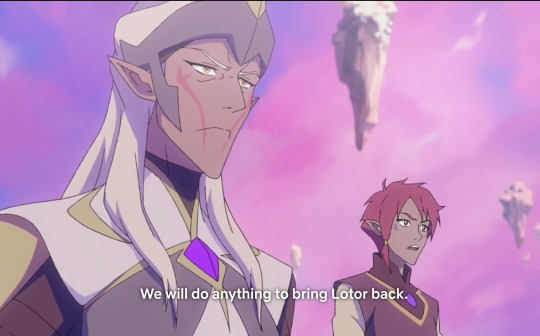

The second image is could allude to a couple things, but one of the possibilities is that it’s referring to her own mindset–how she will do anything to bring Lotor back. She understands how Merla feels because she feels the same way. However small, and however brief, there’s a connection between them. And not just to Honerva and Merla, but to Honerva and all the Alteans because they (presumably) have the same feelings as Merla. It would have been interesting to explore how Honerva views the colonists. Does she relate to them on some level because they share a deep love for her son? She exalts Lotor the same way the colonists do, even referring to him as a god during the last Kral Zera in the show (and possibly ever). Or does she resent them? Does she harbor hatred for them because they loved and adored him when she could not? Because they spent all that time with him before she even had the chance?
Not to mention the fact that the colonists are Altean, the same as she is. In fact, there was a massive missed opportunity to explore Honerva’s views of her own culture. A major part of her arc is regaining her identity as an Altean and pride in her culture. She de-camoflauges herself, though only in private at first, she learns Altean alchemy, all the good things. And yet ... she destroys everything. She proclaims that Alteans are the best of all the races, that the Galrans are lower than scum and that Galran blood poisoned her son. Yet she goes on to manipulate and use her own people, killing them without hesitation in order to further her own plans. She destroys Oriande–or at least the statues–a place greatly revered by Alteans that she searched for her entire life. If she reveres her heritage as much as she believes, how can she turn around and destroy it the way she does, with seemingly no remorse? Add to that the fact that Lotor’s (supposed) aim for most of his adult life was preserving Altean culture. Imagine if the show had gone through with resurrecting Lotor, as it was hinted at. Assuming Lotor came back sane/with his full faculties and wasn’t being controlled by Honerva at all (which would be a long shot I know but hear me out), how would he feel knowing what his mother did? Maybe he wouldn’t care about the “using Alteans as batteries thing” since he basically did the same thing, but how would he feel about her defiling Oriande, even if she only destroyed part of it? Would it wake him up to the horrors of his ways–this person whom he despises doing the same things that he did? Probably not. But it’s interesting to think about.
I actually had more to say but the train has left the station on this topic, so I’ll just end it there. TL;DR: Honerva had so much potential and she, like pretty much every character in season 8, was robbed of her chance to shine. To everyone who made it to the end, thank you and I hope you enjoyed!
#voltron#vld#voltron legendary disaster#thats hilarious#voltron legendary defender#honerva#vld haggar#haggar#vld season 8#vld analysis#vld meta#voltron meta#does this count as meta?#I have no idea#character analysis#long post
10 notes
·
View notes
Note
Hey Lightning, I was wondering if I could get your thoughts on something. One take that seems to keep returning every once in a while is the "Allura fell for Lotor only after he revealed his Altean heritage," but I know u and others have disproven this many times, which does reassure me. While I love Allura, I definitely think one of her weaknesses was her devotion to Altea and singing Alfor's praises, which sometimes became too much. At the same time, it bothers me when I see some ppl (1/?)
Continuing anon message: “ say that she thought Alteans were superior to all other races, and that when the colony plot twist happened, she became repulsed by Lotor's Galra side, which is why she rejected him. For them, that's why she forced violent memories onto an uncorrupted Zarkon, but somehow "saw the good/redeemed" Honerva, the Altean. I can kind of understand where they're coming from, but for me, it just didn't make sense that Allura suddenly had a change of heart considering for most of s8, she was angry and dead set on going after Honerva. Even with that, I think to a lot of her fans, s8 made Allura so ooc that she became unrecognizable, which hurt to watch. I guess for me it's hard seeing antis and people who don't like her claim that that's just how she is and has always been. Haha sorry for rambling, but I'd love to hear your thoughts on this, since your arguments ease my mind on a lot of things when it comes to Allura :)”
Hi, anon. Wow, thanks for your extended note! I don’t know anywhere in canon that Allura champions Alteans as a superior race. The definition of racial supremacy is a belief that inherent genetic differences between races determine cultural or individual achievement, with social/governmental policies championing intolerance of other races. To get Allura to fit into such a label:
1. A viewer has to ignore or undermine all the evidence available about who the main-universe Alteans really were before main-universe Zarkon’s massacre of them.
2. A viewer has to ignore or undermine how Allura actually responds to a variety of different races in the show, including her own.
So let’s start with issue one. To support an “Allura was a racial supremacist” opinion, a lot of antis (and even non-militant, average viewers) are favorable to the opinion that Alteans as a group, including Alfor, were actually evil and violent colonizer elitists before Galrans killed them off. In other words, they question Altean victimhood, and this allows the militant antis to poison and undermine scenes of a woman mourning her home and her beloved family. And it just gets to be a really unsettling conversation, to listen to someone actually try to justify genocide. They’ll also have suspicions that all of our foundational backstory in the s3 finale was just “cleansed” propaganda from Coran. So if antis can undermine Allura’s entire race and family as corrupt, then they can intentionally undermine any of her canonical statements about or efforts toward peace. Which is hilarious, because this racist tactic applied to Allura is actually what a lot of antis accuse Allura of doing with Lotor.
For the record, I don’t think the show production team actually intended the subliminal messaging/cognitive dissonance that I’m about to discuss. The people who designed and developed this show are fans of robot kitties and aren’t PhDs in social issues. But I think there is a very serious issue about the portrayal of genocide victims that feeds into some very real problems in our world, especially regarding the concept of racial supremacy and conspiracy theories about genocide victims.
VLD tried to play with both genocide politics for edge™ points while ALSO playing with shatterglass theory (shatterglass meaning an AU where the heroes are villains and villains are heroes). Combining these two concepts into the same universe creates some incredibly disturbing subliminal messaging about Alteans that very closely mimics ongoing neo-Nazi propaganda against Jews. Nazis and other anti-Semitists justify their hatred of Jews by equating them as terrible villains out for world domination via some underhanded shadow control of the mass populace. It’s an incredibly malicious form of propaganda, because it works so terribly well. And what do you know, VLD plays right into this kind of propaganda. In the season 3 episode, Hole in the Sky, we’re faced with team Voltron confronting an Altean Empire that was actually evil and out for multiverse domination. And oh by the way, they’re using malicious shadow tech to control a mass populace.
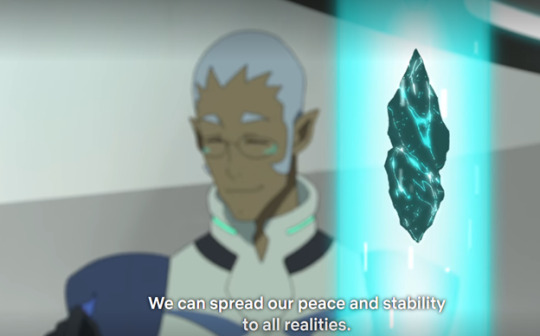
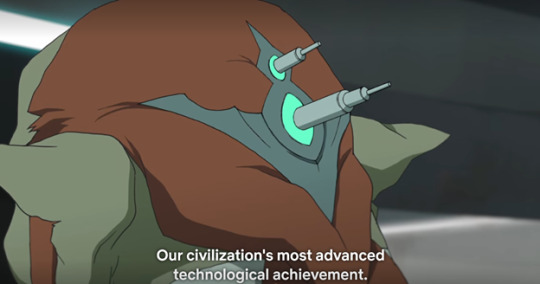

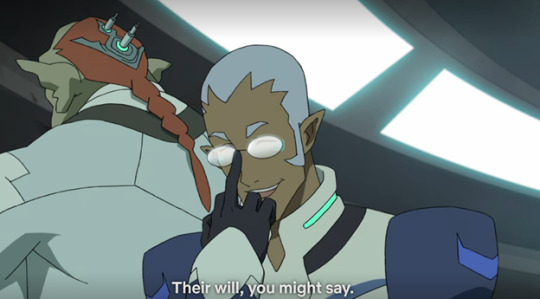
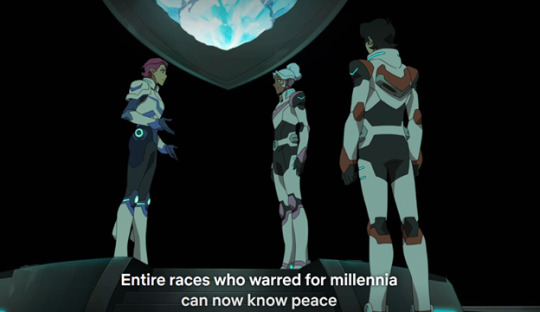


It’s like someone on the production team read the Protocols of the Elders of Zion and then just copied/pasted that incredibly damaging and widely accepted conspiracy theory right onto Alteans for s3 funsies because edge content.
This is incredibly punishing, for the narrative to wave the carrot stick in front of genocide survivors that maybe some others survived—and then to suggest that Alteans were the evil ones all along. A shatterglass twist worked very well in Captain Marvel (2019) for a lot of reasons, for example, but it just doesn’t work well in the VLD universe given that the show explicitly portrays the genocide victims as evil and validates this concept. And this episode unfortunately feeds ongoing cognitive dissonance in antis that if AU Alteans could be so evil…how certain are you that they aren’t in the main universe too? On the reverse side, the main-universe goes out of its way to portray that not all Galrans are evil, and even that Galrans were the primary resistance (BOM). But in this singular episode, we see a united Altean empire. And the only Altean who moves to stand against it once the shine wears off…is Allura. There is no AU Altean actually shown in the Guns of Gamara. So Allura stands alone as an Altean against her own people.
For this reason, this episode doesn’t function very well as a shatterglass AU either, because the moral “flip” isn’t a mirror balance to main universe. The Alteans of the AU world appear as fully united in their evil plans. And then, no doubt, anti-alluras point out other quirky things about main-universe Alteans throughout the show—the violent language-learning system that scares Pidge, and the ancient Altean terraforming technology that Haggar activates, and the fact that Oriande is a hidden place that keeps out the less magical with a violent guardian. These details, when removed from main-universe world building, create a cognitive dissonance about whether main-universe Allura and Alteans were actually genuine in how they depicted respectful “peace and diplomacy.” So anti alluras who believe Allura was a racial supremacist really rely on this s3 episode and these details to uphold their conspiracy theory.
So let’s focus on Allura in this episode, because it says a lot about who she ultimately is as a person, and people have forgotten how she actually responded in this episode. Allura is unquestionably hopeful at the thought that her and Coran might not be the last Alteans alive. Pretty understandable. If I were the last human, I’d be darn excited to find out there’s more of me left, lol. So her experience as a genocide victim initially blinds her to the evilness of these Alteans. You can even see the ache on her face, of how badly she wants to believe their narrative of peace.

So Allura is initially star-struck that she and Coran are not the last Alteans, yes, and that somehow they’ve achieved a “peace.” She is also not afraid to admit that they would be valuable allies in the war:

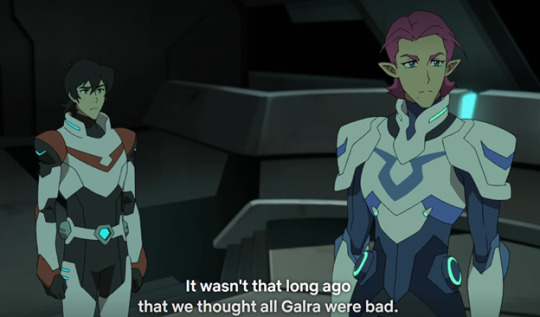
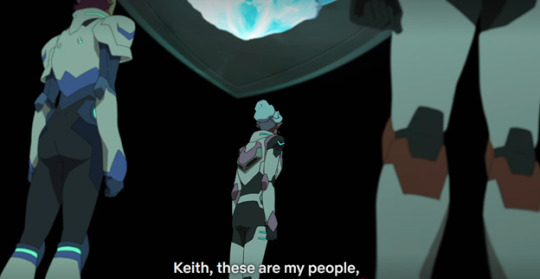
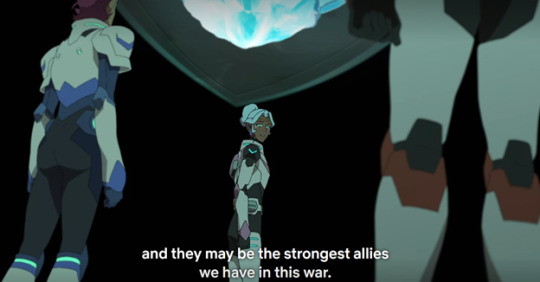
And she’s not wrong there, considering that they have what appears to be extensive military resources and a robot force of their own. But she makes a critical mistake in assuming that “these are my people” means that they share main-universe cultural sentiments. The instant Allura hears Slav (so not someone of her own race) call these Alteans out as actually evil colonizers turning people into slaves, she begins to question the narrative she’s received.
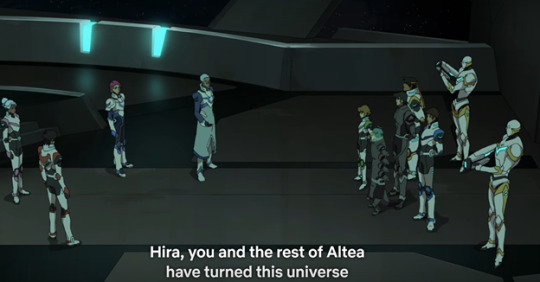
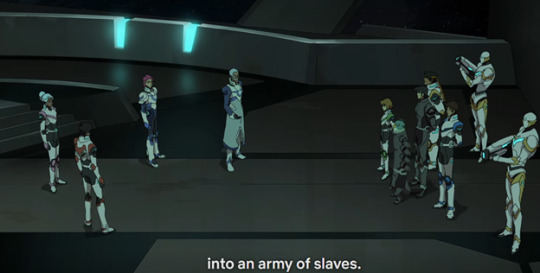


In this instance, she actually affords the Alteans the same courtesy she afforded Lotor—the opportunity to deny the accusations.

But in the AU Altean’s case, they try to turn blame back on other parties. Allura listens to Keith when he grows increasingly fearful of what the Alteans might do to the others, and she tries to plead for actual peace:
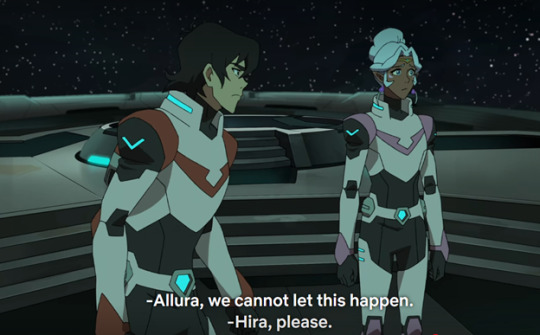



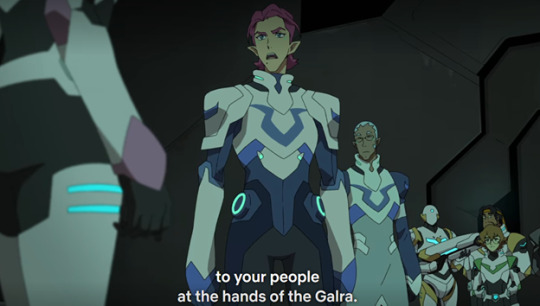
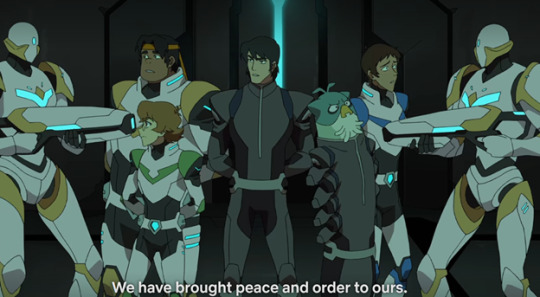
And actually, this is a pretty interesting moment for Allura. She tries to salvage an alliance…until she realizes that their differences are irreconcilable, and that their definition of peace is inherently different from her own. This probably sets the stage for why Allura was so triggered by Lotor talking about peace while also killing people—because she’s seen people misappropriate that term before. And also probably informs why she trusts the information of both Keith and Krolia (both of whom have Galran blood, btw).
Ultimately, Allura turns against her own people. Violently:

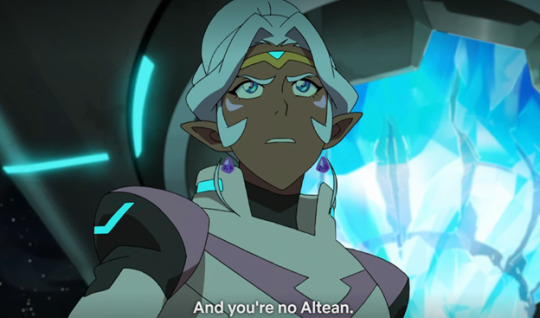

When they get angry about her wanting actual peace, Allura draws a weapon against them and rejects them from her people. This mimics how she spends several seasons fighting an Altean Haggar/Honerva for her crimes, and how she turns against Lotor too.
So case in point here, Allura loves her people, obviously—but she also is holding them to moral standards regarding their behavior, which is something that a genuine racist doesn’t do. As a matter of fact, Lotor is the only person of Altean blood that Allura genuinely bonds with ever again in the series. She’s distant with Romelle, she’s distant with the s8 Alteans… In s8, Allura even says this about Luca, which refers back to her own mistakes she made with initially being star-struck by the s3 AU Alteans who came in “peace”:
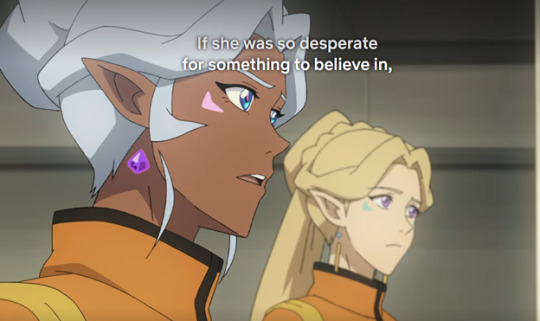
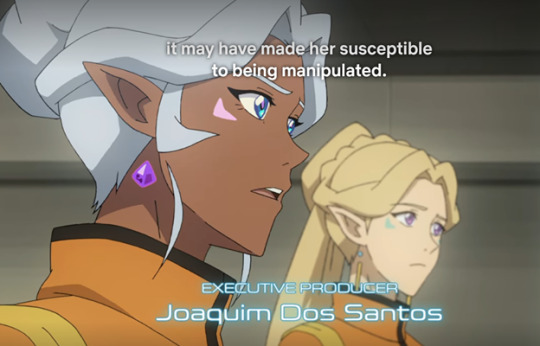
Allura herself had been manipulated in s3, wanting so desperately to not be the last Altean alive that it initially blinded her to how Commander Hira was manipulating her. The plight of the s8 Alteans who are deceived by Honerva is inherently frustrating to her, because she can see herself in them.
Absolutely none of this correlates with Allura seeing or perpetuating Alteans as a superior race. At every turn, her own people continue to disappoint her, and she increasingly and progressively separates herself from them in hopelessness, because they’re so brainwashed that they can’t see they’re just cannon fodder for someone else’s military agendas. Not exactly a ringing endorsement for a superior race, lol.
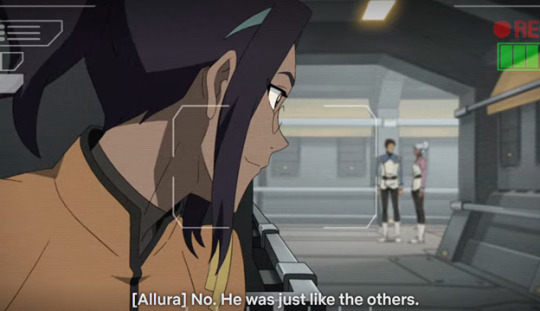

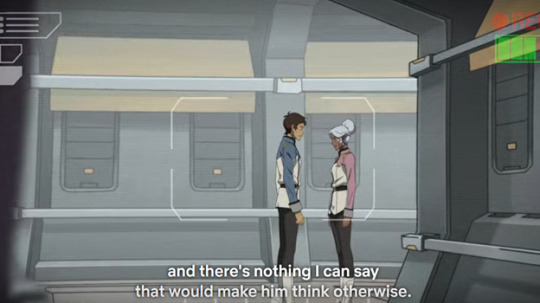
So let’s think about anti accusations here. Allura is a racial supremacist…but she’s arguing against her people who believe unquestionably in Honerva, another full Altean like herself? Nothing about that accusation makes sense with her actions.
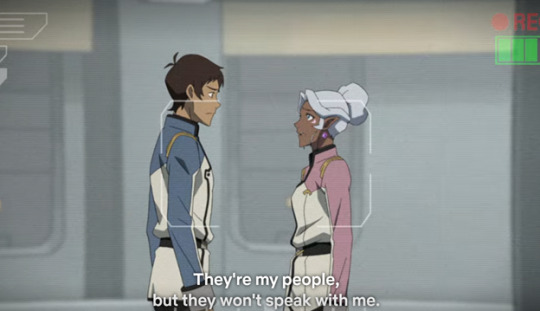
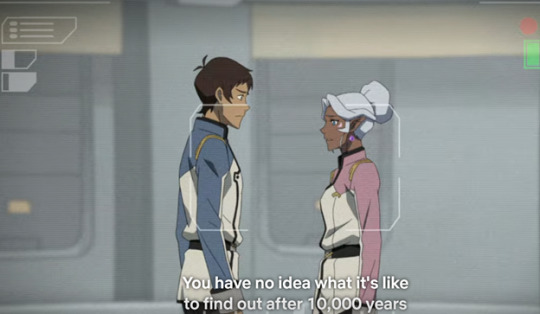


The fact is, consistently from season 3 and onward, Allura is faced with her own people morally disappointing her.
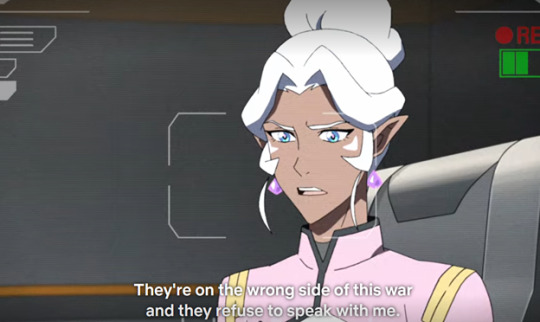
The good news for the s8 Alteans like Tavo is that Allura is able to remove the dark entity Honerva is using to control him. Which allows other Alteans to “wake up” from being manipulated and try to make amends.
Regardless, Allura makes a very clear line that simply being Altean doesn’t make someone “right.” She sees herself fully at odds with her own people who are drawn in by Honerva’s lies. And she experienced well back in s2 (revealing Haggar as Honerva) and s3 (evil AU Alteans) that any given race, including her own, can house people who do bad things.
The fact is, she’s consistently and willingly drawn weapons against even her own people when they didn’t meet her moral expectations. So her response to Lotor isn’t particularly out of line there. She’s repulsed by a moral flaw.
And actually, Lotor himself wouldn’t have known this, but he very oddly echoed the AU Alteans by getting angry that Allura was angry over the means through which he was trying to get peace:
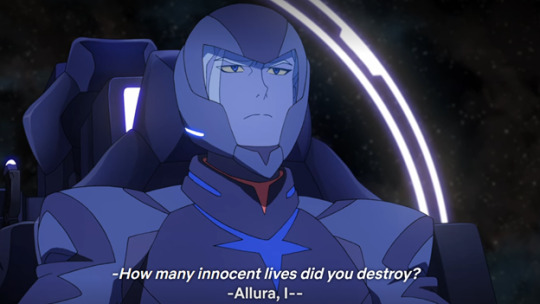


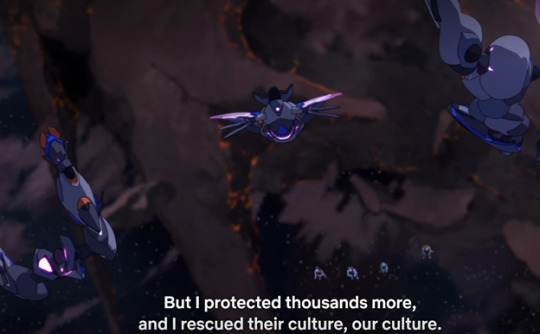

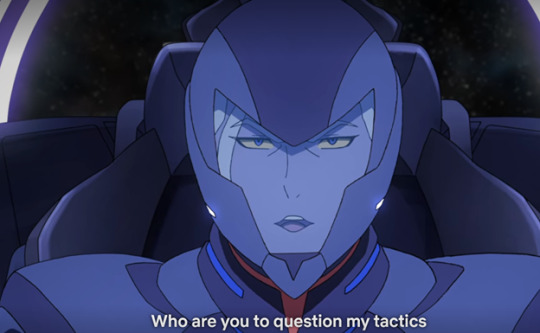
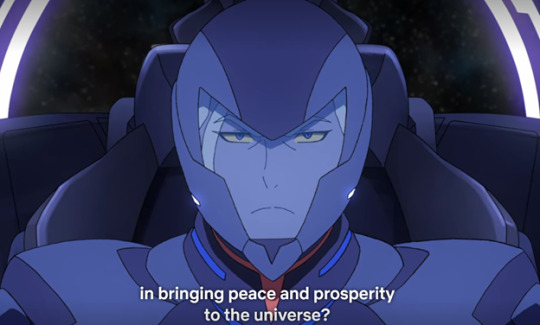
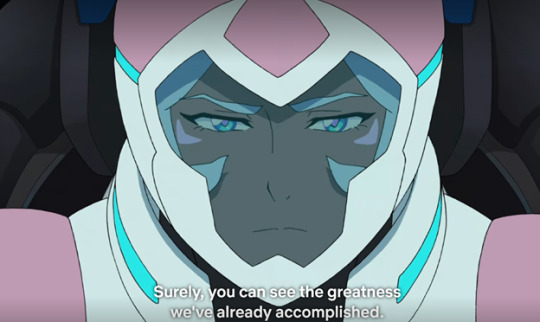
So Lotor actually reverts to the same logic of the AU Alteans—peace at any cost, just look at the results—
And keep in mind that the AU Alteans also manipulated Allura’s excitement about them, to get her to make the transreality comet usable so they could go into other realities. So Allura has felt betrayed and used before, by her own people.
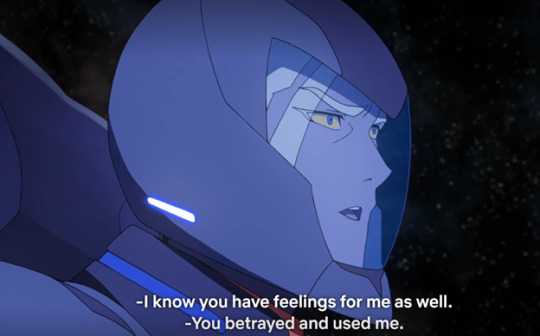
So when she says this:
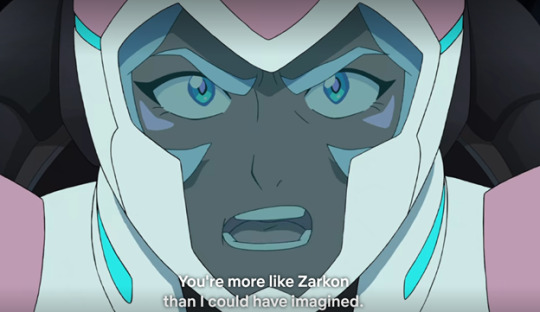
Yes, it’s a reference back to how Zarkon manipulated his friends in order to get access to the quintessence field, at the explicit cost of potentially killing his own people. But it’s not without understanding that yes, Alteans can be just as manipulative and betraying as Zarkon. Because she’s experienced it, again and again.
As a matter of fact, six out of the eight seasons of Voltron: Legendary Defender feature villainous Alteans/Alteans on the wrong side of the war, and we continuously see Allura punished again and again for wishing that Alteans still lived.
No wonder she wanted to die.
This is something that I find uncomfortable about the narrative of the show. Previous iterations of Voltron did in fact have a “blood on everyone’s hands” perspective, such as within the ages 16+ Dynamic Comics. However, Arusians/Alteans in those old Voltron narratives were not victims of genocide. VLD turns Alteans into victims of the worst racial crime possible and then also consistently portrays them as inherently antagonistic to genuine peace efforts in some way, instead of focusing on the evil of the oppressors.
And this is such a double whammy for Lotor’s characters as well, given that he was abused by his parents and threatened with slavery via his Galran culture, and that he was half-Altean too trying to connect to his lost culture.
As a matter of fact, the larger show’s narrative interest in “victims as antagonists” makes it such that when we see victims try to enact actual justice, it feels almost jarring. Let’s look at that s8 Zarkon moment you brought up as an example, where Allura destroys his innocent perspective by showing him his evil deeds.
The s8 Zarkon is a weird topic because 1) This Zarkon actually doesn’t exist outside of Honerva’s mind, so how he has any kind of actual free-will is beyond me, unless someone wants to argue that Honerva actually cursed his true soul just as she cursed the other paladins. It’s hilarious too, because Honerva-mind-Zarkon also calls Honerva a psychopath, so I guess now Honerva is psychoanalyzing herself using her dead husband as the vehicle, while also discreetly helping the paladins to stop herself—
ANYWAY, using this Zarkon as a “proof” of Allura’s “racism” is also cherry picking in the weirdest of ways. Is she angry about his horrific and incalculable crimes, including even how he betrayed the OG paladins and ruined his own planet? Absolutely. Does she want him to be aware of his crimes instead of having to pretend like nothing’s wrong? Yes.

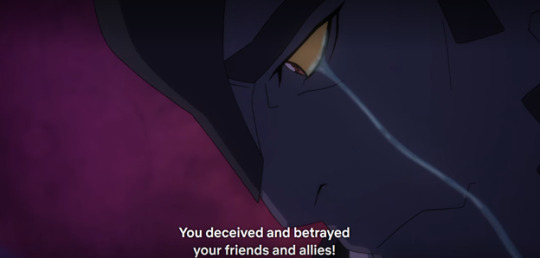
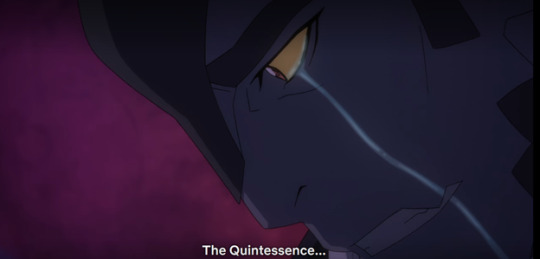
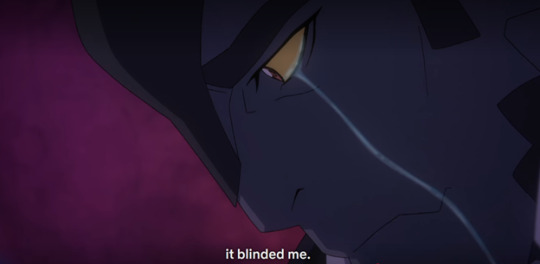
But notice here, this Zarkon actually shows remorse. He is actually crying over those memories and recognizing that he had done something wrong. And Allura can work with that. In fact, out of everyone standing around and doing nothing, it’s Allura who gives him a second chance and offers an alliance with Zarkon in order to stop a crazy Altean:
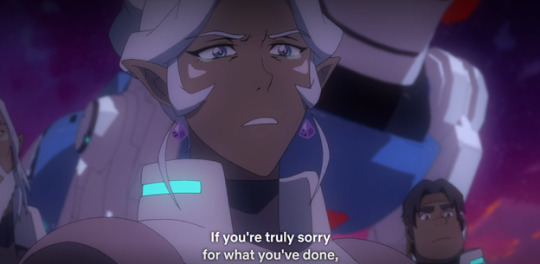
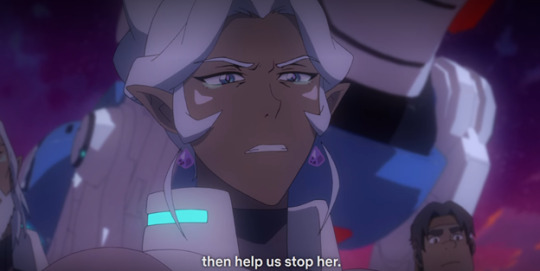
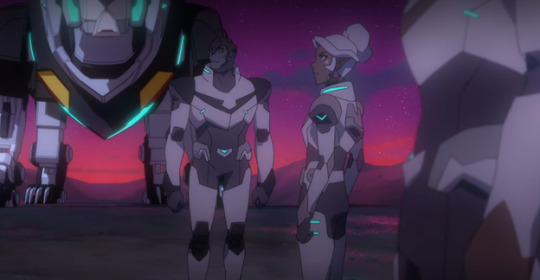
Keep in mind too, Honerva didn’t have memory loss at the end of s8. She knew exactly what she’d done and had given up and had to actually be convinced to do anything halfway constructive. That’s a very different circumstance than mind-Zarkon had, who jumped at the chance to do something to fix what all had happened, and gets even morally righteous about it, calling his own wife a psychopath, lol.
So generally, antis who believe Allura was a racial supremacist haven’t watched the show holistically. We see her hold the same standards to her own people as she expects out of others. This show would look incredibly different if Allura were a true racial supremacist.
Ah, you ask. Okay, so we’ve refuted the big pieces of “evidence” used to incriminate Allura. But what about all of those weird details about ancient Altean history? The violent language-learning program that scared Pidge? The violent terraforming tech that almost kills Voltron? The concept that Alfor tried to play “police” over the Galra and actually blew up their planet? The Alteans’ ongoing discussions of “peace and diplomacy” and spreading it throughout the universe while they happen to sit on a massive load of ancient power?
The s3 finale and other facts throughout the series very heavily smash the claim that our canon, in-universe Alteans were evil colonizers like the AU Alteans. The biggest piece of evidence to the contrary is that the Altea we know was one (1) planet. You counted right. One planet. Not an empire, but a singular planet. The s3 finale corroborates this, showing Altea as being largely isolationist from a military perspective while Daibazaal and Nalquod warred "for generations," right in front of their salad.

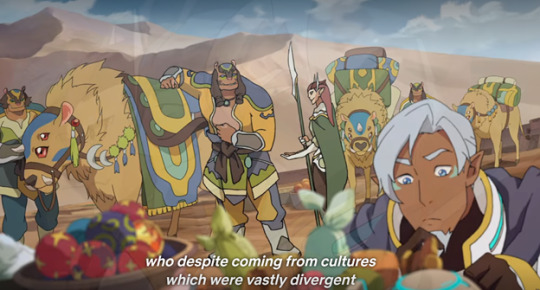


So some viewers would have you believe that Alteans were these big bad, intergalactic police state colonizers. But for all of its great power and knowledge, the singular planet of Altea didn't even canonically interfere in the wars of its own galaxy for actual millennia? And looking at the screenshots upon the stabilization of the alliance, Alfor is revealed to not have had experience with a neighboring culture. His face while exploring Gyrgan’s homeworld is an indication that it’s all rather new for him too. So again, we have evidence showing that Alteans were not colonizing or even functioning as a police state.
Note here that in the s3 flashbacks, the show confirms that it actually wasn’t just Alfor who suggested an alliance. All five leaders had common interests in protecting their galaxy from even worse threats, so all five came together at the same time. This is actually the first piece of evidence we have of Altea entering into some kind of intergalactic military agreement to stave off said worse threats.
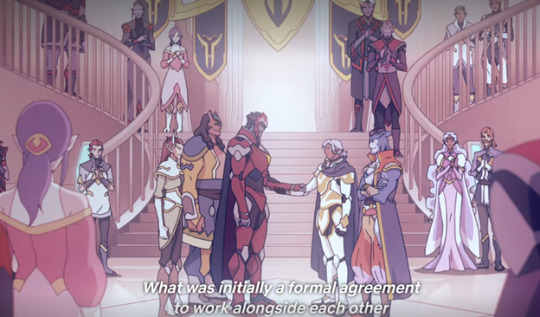

And all of this is on top of a history where in s6, the Galran Archivist confirms that the Galran Empire had existed before Zarkon for 3,000 years, with times of “expansion.” It’s very easy to see that Blaytz’s people were actively fighting off Galran occupation of their homeworld within this past.
And that’s actually what I think makes Alfor and the OG paladins some pretty interesting characters. Here, we had colonizing Galran empire setting down its sword and accepting the value and space of its neighbors. Here, we had master alchemist Alfor giving up military power within their group by acknowledging Zarkon as the superior strategist. Here, we had Blaytz who had previously been battling Galran occupation…fully accepting the Galra?

So the OG Paladin backstory represents a pretty incredible alliance that removed a lot of intergalactic toxicity and helped heal broken bonds. But it required all five leaders to agree to that. Alfor did not throw his weight or power around within this. There were several checks and balances here.
But this backstory also helps to explain some of the quirky details about Alteans. Their planet existed within an active war zone, and it’s very likely that they’d had to fight off Galran occupation just as Blaytz’s people did. So the violent robot trainers and fear-based language learning systems start to make sense. Alteans weren’t just simpering people playing harps all day and eating grapes. They were actively prepared to defend their planet and their culture.
So when Allura says in season 1 that Alteans were “spreading diplomacy” across the universe, the only pieces of evidence we have of that is the OG paladins themselves, in which Alfor was a big part in creating that alliance—and then possibly the Alteans with the Balmerans, given their deep collective rituals with that planet while the Galra literally just came in and ripped the planet nearly to death. Allura tries to mimic what it means to accept and interact with a culture without changing it well in season 1, when she stumbles through trying to respect Arusian culture and its demands on its people. Also, there is a big fact that antis like to overlook:
The fact is, despite the untold numbers of civilizations we interact with across 76 episodes, no outside race remembers Alteans as evil colonizers. If they were really so big and bad, we would have heard it, like, “Man, yeah the Galrans are bad. Just as bad as those Alteans, back in the day.” Or something. But nope, nothing.
So I heavily question the history of Altea as an ancient colonizing race. If they were, then Altea wouldn't have just been a single planet with limited resources to fight wars in even its own galaxy. All of this supports the idea of Altean children being raised to fight--because they were preparing to defend themselves when/if diplomacy fails.... But the fact that the Balmerans see Alteans fondly and that literally every other race we run into is explicitly suspicious of Galrans and not at all of Alteans says something.
I think the only piece of evidence there might be for a genuinely colonizing ancient Altea is the use of terraforming technology, as mentioned in s4. Haggar discovers it and activates it to try and kill Voltron--and she nearly succeeds, because said tech destroys the entire crust of the planet to reform it. But you have to step back for a second and wonder--if ancient Alteans were so powerful, why was Alfor struggling so hard to even hold his own planet together in the midst of all these other cultures warring and larger threats? If they had this technology--and they did know about it because Allura recognized it right away as ancient technology--why the heck wouldn't they use it? Or were they using it, and it was to reform uninhabited planets to help sustain displaced peoples? Why is it, if Alteans were so terribly bad, we have no record across ANY of the many alien races being cautious of them? Even Galran Lieutenant Lahn snapped at Allura only because he was jealous of the general security she had back on, you guessed it, explicitly Altea. There's a lot of potential explanations for a positive use of terraforming technology, and the evidence against colonization and Altea committing omnicide against other races is incredibly more aligned with the other details in the canon.
And even Alfor’s creation of Voltron and the blowing up of Daibazaal—that’s something that antis like to position as evidence of his police-state ways to underhandedly control other cultures.
So let’s tackle those too while we’re at it.
Honestly, I know people like to hate on Alfor, and I do think his character picks up some misogynism just from the writers....But I don't think he was as much of a controller as people think he was. He was already in an alliance with four other leaders to try and stop bad things from happening in their galaxy. That meant they were expending incredible amounts of time and resources to accomplish that end—resources that were not renewable and may have been straining various planets. We know that he started building Voltron with Zarkon and everyone else's blessing because he called them "clean ships," but it's only after the rift creatures attack that suddenly Alfor's perception of Voltron moves from "clean energy" to "omg we need a more powerful weapon against this unknown enemy.”
So these are his intentions BEFORE he discovers rift creatures are a threat to the universe. While Zarkon states that these new ships are to be endlessly powerful for the Galra Empire, Alfor shames him by offering what his desire is for them:
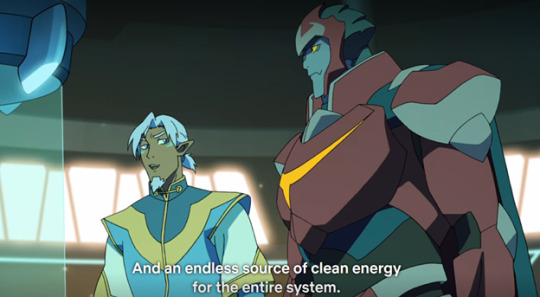
After the rift creatures nearly destroy Daibazaal, intentions change.

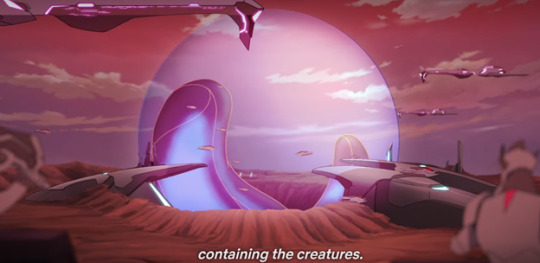
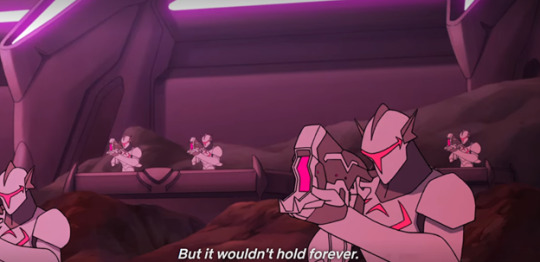
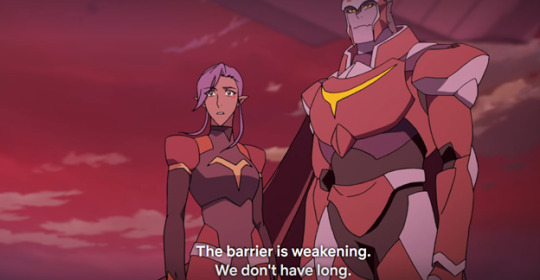

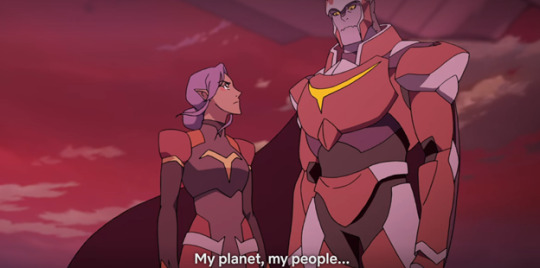

So here, we see the game change in a BIG way. Voltron is not just about offering a more renewable way of sustaining peace-keeping efforts. Alfor is now adjusting and finishing these ships with the explicit knowledge that if they are not powerful enough, then Daibazaal and the Galran people will die. Alfor’s got a LOT of pressure on him now to deliver a mighty and powerful weapon to stop this new threat. So even his creation of Voltron as a superweapon involved using it to protect people from imminent death—not to police them.
And about Alfor blowing up Daibazaal—once again, it’s Alfor trying to clean up Honerva and Zarkon’s mess. Honerva had convinced Zarkon that the rift needed to be wider, and so Zarkon deceived the paladins into widening it.
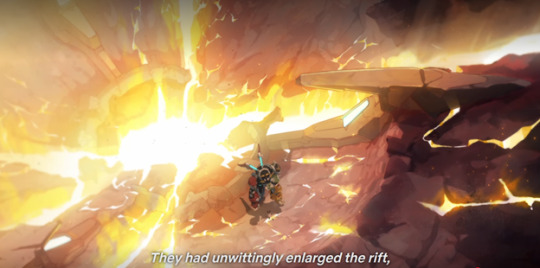

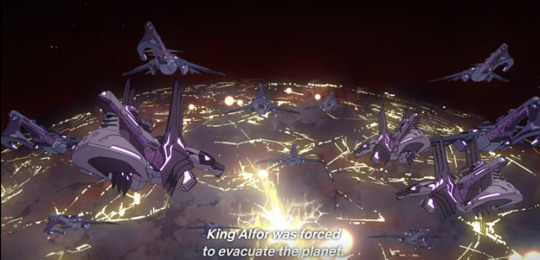
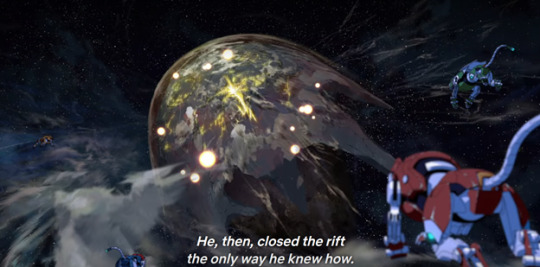

So keep in mind here, at this point in time—the rift was destabilizing and eating an entire planet. The entire universe was now at stake. Alfor had to choose between a bad fix and an even worse option of allowing everyone to die, but he very clearly evacuated people before destroying Daibazaal, as part of his promise to keep Galrans safe. So that no one would have to die.
And as a matter of fact—about that terraforming technology. How sure are you that Alfor didn’t intend to use it to build Galrans a new home? It’s entirely within the realm of acceptable conjecture that he allowed for the existence of that technology because it could restore what had been lost.
And here’s where the story gets really screwy and feeds into some anti hate. Because when Zarkon wakes up as a zombie, he desires more quintessence as zombies do.
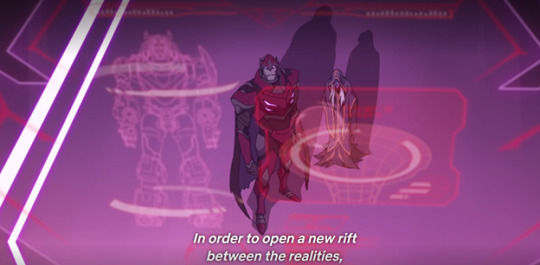

So he’s pissed that Alfor just cut off his gateway, and he manipulates his people:


And it’s here where we get the idea that Alfor was an evil controller. The idea came from Zarkon, who—we can look around pretty easily and see that he was not a man of honor, ultimately. Even if you chose to not believe the s3 finale flashbacks as being objective, there’s something wrong with Zarkon. (It’s clear that the show thought using Coran was a smart way to shell off massive amounts of info, because clearly if this were truly in Coran’s perspective, we would NOT have had intimate looks into Zarkon and Honerva’s bedroom as Zarkon is tending to her, like omg.) Numerous sources, histories, and cultures outside of Coran confirm that Zarkon hit a point of no return on the evil scale, and that he projected his own blame for Daibazaal’s destabilization onto Alfor in order to raise up his new regime in the name of Quintessence™.
So at the end of the day, even Alfor was a victim. But yet somehow, various antis choose to believe Zarkon’s victim-punishing narrative because said antis can’t or else refuse to connect one scene to another since it undermines their justifications for why they can hate on Allura. And that’s not so much an issue with the story itself as it is just poor critical analysis or malicious weaponization of content against other fans.
Now, at this point, we’ve talked about Allura and we’ve talked about Altean history. I have numerous other posts about Allura’s interactions with other races and Galrans and overcoming trauma to give the entire universe a second chance. So if there is anything in this show that suggests Alteans were in any way a superior race, then it’s probably within the show’s own worldbuilding. The show contradicts its own definitions of what quintessence even is by suggesting Alteans have “bluer/purer quintessence” in order to justify why Lotor would even be trying to sacrifice them for anything. The show-championed concept that Alteans have a bluer, purer life force above all other people, and that only Altean energy could interface with the fabric of space-time. Now, this is a problem in the later seasons’ world building itself. And you know who wrote that in? The production team. So once again, we do have racial issues in this show, in ways that shows like Star Wars desperately try avoid by showing racial diversity in who has Midi-chlorians.
That said, I’m not a perfectly woke storyteller either. I think every story and show is going to have something problematic™, but with VLD it’s very clear that its disrespectful handling of genocide politics and shatterglass conspiracy theories, on top of its weird master race angle created the perfect storm. These mishandled and quirky details have created a cognitive dissonance with the provided narrative, resulting in some people in the anti fandoms to champion what aligns very closely to actual neo-Nazi propaganda against Jews, who according to them are not victims but instead the true perpetrators of all bad things. For the sake of the antis, I’m pretty sure they’re not intentionally looking at VLD this way and are probably just looking for any easily graspable reason to hate on Allura for interfering with their ship or something.
But this kind of subliminal propaganda that undermines victims, and the effect it has had on fandom morality politics, is deeply concerning to me. I really wish that we’d had an opportunity to respectfully and critically discuss this with the production team of the show, because a Y7-FV show about “strength in unity” should NOT result in us needing to have a conversation about people walking away with neo-Nazi-ish propaganda sentiments against genocide survivors. Like. Clearly, VLD is fictional, but it’s feeding into a real-life beast that it does NOT need to feed. And it’s keeping alive ongoing conspiracy narratives against some of our most vulnerable populations on the planet.
So, we need better stories. We need a production team that, if they’re going to get paid to do something involving portrayals of genocide and politics, that they need to do their research on those topics. Nobody is going to be perfect with a creation, but VLD validated some very damaging things—and it ALL is something that could have been fixable. I think it would have been incredibly validating to hear the production talk about and accept that these were issues that cropped up unintentionally, and to hear them confirm that these issues are not the sorts of things that VLD was supposed to champion.
The greatest tragedy of all of this is the potential that this show had to really champion some great and validating messages, and the potential that we as a fandom had to come together and do something that fandom was meant to do—which was celebrate the things we love. Because that’s why we’re all here. That’s why this crazy tumblr of mine even exists. It was supposed to celebrate things.
For that reason, I’m going to end this here. I’ve written several responses now as to my thoughts on the inappropriate narrative lens of the show, its contradictory and damaging worldbuilding about the purest race, and how it champions demonizing or punishing genocide survivors again and again. Within all of that, I’ve talked at length about Allura’s character and behavior over 8 seasons and how she built even empathetic connections with militant Galrans like Commander Lahn. In fact even her own homesickness is how she emotionally connects with Lahn, because she understands that desire to call something one’s own. To have a home. A family.
I now really would like to get back to writing stories that I find meaningful to me using these characters and these worlds—and trying to find the hope in all of this darkness, haha. And maybe with any luck, I can hope to do VLD some justice, knowing that I am still on a learning journey as well.
But I appreciate your note, and I hope this very extensive response helps to settle your questions and concerns once and for all regarding VLD Allura. If you should have any remaining questions, please feel free to reach out via a private message to discuss. Thank you!
#Volron#VLD#Allura#VLD Critical#Alfor#Zarkon#Honerva#Lotor#I hope this helps explain my perspective#I think this might have to be my last refutation to the Allura as racist/racist supremacist conspiracy theory#at a certain point#people either watch the show holistically or they don't#you can't convince an anti#so this meta will probably not help an anti#but if you're sitting on the fence and felt drawn in by anti propaganda#then I hope that maybe this post provides an alternate perspective#and one that tries to be more holistically fair to all 8 seasons of the show#and to the intentions and general oversights that can occur during production#Ultimately it doesn't matter if someone likes or dislikes Allura as a fictional character#we need better entertainment that can handle these hard topics and handle them well#And we also need a fandom who's willing to look at all of the information and not weaponize it to specifically demonize and silence others#Maybe a family TV show shouldn't be appropriating conspiracy theories from the Protocols of the Elders of Zion#real-world fans are incredibly vulnerable to such conspiracy theories#and it creates a lot of real-world strife as a result
22 notes
·
View notes
Text
Highlands Poppy: An Analysis of Clone Shiro’s Role in the Story of Voltron Legendary Defender
It pretty much goes without saying that Shiro’s consciousness being merged with his clone in S6E07 Defender of All Universes was a controversial decision with the fandom. Many had been expecting the Clone Shiro plotline to be resolved the way that such stories usually go in your typical science fiction story. The clone would go through an existential crisis realizing that everything they know about themselves is a lie before eventually deciding to build a new identity for themselves independent of the original. So from that perspective, many fans saw the merging of the clone and the original as one character being killed off because the other was seen as more real, and therefore more important.
However Voltron: Legendary Defender is not a purely science fiction franchise. With its druids and magic, and the Altean basically being elves in all but name, the show has the trappings of an epic fantasy set in outer space. So when discussing Clone Shiro’s role in the overall narrative of the series, we should not be looking at it from a purely sci-fi perspective. Meaning that despite the name “Operation Kuron” and being labeled as such on-screen in Seasons 6-7, “Kuron” does not align with traditional sci-fi tropes about cloning. To more accurately describe what he is, we should first look at the function that both Shiros fill within the overarching story of the series.
A recurring narrative device used throughout VLD is to link two different characters or events by framing them as parallels. These parallels thematically tie the two together and serve to link the similar elements together in the mind of the audience, often with the additional purpose of highlighting the parts where the two are different. The most immediately obvious example would be the fight against the gladiator robeast in S1E03 Return of the Gladiator, where Voltron’s battle against the robeast intercuts with brief flashbacks to Shiro fighting the warrior it was built from back in the gladiator arena.
However sometimes these parallels are more subtle, and aren’t directly pointed out in the narrative. Instead, the more subtle parallels are depicted through similar elements, or through visual details that signal that the events being depicted are of a similar nature. For example, despite being separated by at least 18 episodes, Pidge’s grief when she finds Matt’s grave in S4E02 Reunion parallels Shiro mourning Adam in S7E09 Know Your Enemy. Meanwhile, the bits of light floating off Lotor’s body in S8E10 Knights of Light: Part 2 resemble the ones seen coming from his parents’ eyes after their resurrection in S3E07 The Legend Begins, signalling that Lotor is not dead, despite WEP removing all trace of his survival from subsequent episodes.
After Allura transfers Shiro’s consciousness into the clone body, his eyes fill with a solid pink light that contracts before fading to show his pupils as the merger of Shiro and Clone Shiro completes. After this point, Shiro has all of his and the clone’s memories (although thanks to WEP’s meddling with Seasons 7 and 8, we did not get to see this shown on screen). The only other time in the series where we see this visual of a character’s eyes lighting up with a solid color before the light contracts and fades to reveal their pupils is when Haggar leaves Oriande and completes her transformation back into Honerva.
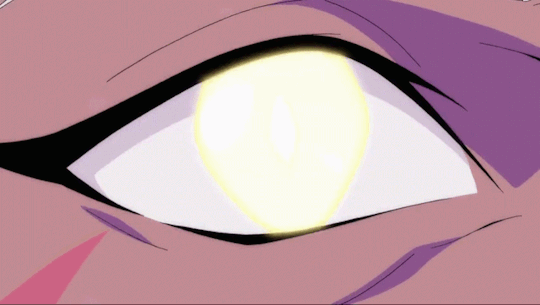

From a storytelling perspective, this signals to the audience that what Honerva experienced in Oriande after forcing her way past the White Lion’s trial in S6E01 Omega Shield is similar to what occurred with Shiro and his clone in S6E07 Defender of All Universes: a merging of two selves. This connection ties in to an existing pattern that has been present in the show since Season 4 and still remains in Seasons 7 and 8 despite the extensive executive meddling that resulted in the culmination of this plotline being removed.
When speaking with Lotor in S6E05 The Black Paladins, Honerva refers to her Haggar persona as something she was transformed into. Something different than who she really is that she was changed into against her will. Lotor also treats Haggar and Honerva as separate entities in the same episode, and in S4E05 Begin the Blitz, even though we as the audience know for a fact that they are the same person. Shiro, too, makes a distinction between his own actions and those of his alternate self in S7E06.
But despite her claims to the contrary, we are shown that the only difference between Haggar and Honerva is her memories. Even before she took a bath in the rift on Daibazaal, Honerva was always willing to push ethical boundaries in the name of science. She does not react with horror at her actions after regaining her memories, and despite attempting to separate herself from her Haggar identity, she still adheres to the same tactics to stay in control of the people around her.
In the same way, the biggest distinction between Shiro and his clone is their diverging memory post-Season 2, and the fact that the events of S3E5 The Journey added more trauma on top of Shiro’s PTSD from his time as a prisoner of the empire, making him more short-tempered and less patient. But the Shiro in Seasons 3-5 at his core is so identical to the Shiro of the first 2 seasons that despite the Operation Kuron line in S3E5, many fans before Season 6 did not believe that he was a clone at all.
We do not get any on-screen acknowledgement of Shiro having two sets of memories, however the Season 8 episode Clear Day points out that Honerva and Haggar are the same person despite the change in her name and appearance. This indicates that we should have gotten a similar acknowledgement of Shiro’s situation at some point during the final season. We should also have seen both characters be forced to confront the reality of their situation in order to move forward.
The moment where Honerva is forced to confront the fact that she cannot absolve herself of her actions as Haggar was more than likely a casualty of Lotor’s removal from the final season. Her final conversation with Lotor would have forced her to accept responsibility for her actions as Haggar, and Lotor would likewise be forced to acknowledge the cruel witch Haggar and his mother Honerva as the same person.
While Honerva’s confrontation was centered around Lotor, Shiro’s most significant relationship throughout the overarching narrative is his bond with Keith. It would make perfect sense, then, for Keith to play a major role in helping Shiro reconcile with the memories and actions of his alternate self. And since all of Keith and Shiro’s personal interactions were cut out of the season in order to No-Homo their connection, scenes that acknowledged the merger of the two Shiros were left on the cutting room floor.
TL;DR: Shiro merging with his clone at the end of Season 6 is an external representation of what happens inside Honerva’s mind at the beginning. The two were each meant to have moments in Season 8 where they admit that their other selves were a part of them instead of separate entities, but these scenes were cut as a consequence of Lotor’s removal from the season and Keith and Shiro being No-Homo’d.
#voltron legendary defender#voltron meta#vld shiro#vld haggar#vld kuron#vld honerva#character analysis#narrative parallels
13 notes
·
View notes
Text
This particular meta/"analysis" author seemed to enjoy comparing Shiro to his abusers in ways that suggest that he shares similar thought patterns and personality traits to them. I.E., their previous "analysis" that you and I took a look at which outright said that Shiro needed to learn the value of teamwork from Sendak, while also claiming that Shiro and Sendak have no personal history, and fans who insist so are overinflating Sendak's significance to Shiro's character and story arcs.
I don't think it needs to be said how wrong that is. Both factually, and morally. On so many levels.
Honerva/Haggar's story is meant to be an allegory for drug addiction, and how it ruins not only the life of the addict, but the lives of everyone who loves them. She's depicted going through withdrawal from quintessence, in a rather graphic manner that I'm sure the seven year-old target audience wouldn't find disturbing in the slightest.

And, it's her addiction that leads to the corruption of both herself and her husband. Which, in turn, results in the two of them, hellbent on obtaining and maintaining absolute power over the universe, abusing their son for his perceived weakness.


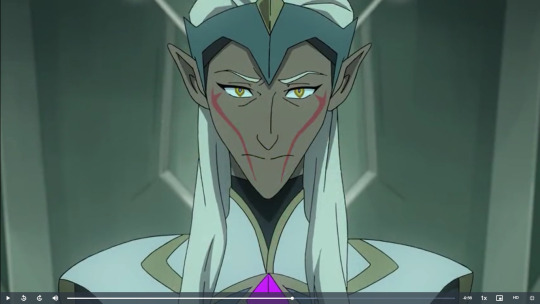
Her role in Lotor's abuse, even as a passive bystander who stood there silently while Zarkon ordered the "impurities" to be removed from the boy, is what Honerva/Haggar is determined to emotionally distance herself from.
From my understanding, as someone who has not watched the series in its entirety, and thus leaves plenty of space for correction if my assessments are wrong, Haggar/Honerva deluded herself into believing, like you said, that she is guiltless. That she can simply reclaim her old name, find a reality where Zarkon is healthy and uncorrupted and Lotor is a young, innocent boy, insert herself as she is into that reality, and the three of them will be a happy family. Hence her responding with righteous anger and preparing to attack the son and husband she supposedly loves when the child Lotor she is able to find in one reality recoils from her out of fear, adamant that she isn't his mother.





More than that, she abandons any pretense of being Galra, reverting from the blue skin tone she adopted to her natural brown, and uncovering her ears, reasserting her Altean heritage in order to command an army of Alteans who survived the attack that she and her husband orchestrated on their home world. Alteans, her victims, whose free will she callously overrides, uncaring if they're killed as she forces them to assist her in achieving her ultimate goal.
Likening Shiro to the person who ordered the amputation of his arm and its replacement with a weapon in an effort to turn him into a living instrument to be used at his captors' disposal, then attempted to kill him for escaping and rebelling against them,

is a terrible take.
Likening Shiro, who is clearly intended to be a war veteran, a prisoner of war, and a victim of human experimentation, to an abusive addict, is an abysmal take that paints a highly unsavory portrait of the author's opinion on veterans, trauma survivors, and all of the people battling with a severe mental affliction that primarily affects them.
And, claiming that Shiro, a man who is a huge proponent of free will and autonomy,

and whose biggest fear is being broken down and reformed into nothing more than a tool for his abusers, a monster,

has anything in common with an actual unrepentant monster more than willing to violate the autonomy of anyone and everyone in her midst,


torture her husband's underlings,


and kill her own son for rejecting her, is disgusting.
Haggar had to transplant Myzax and Prorok's souls into their respective Robeasts because the Robeasts were inanimate robots. Meaning they were not alive. And, as you helpfully pointed out, Myzax's essence, in particular, was necessary, as Haggar had offered him a chance at revenge on the Champion, something that required his spirit and memory to be properly enacted. In turn, Prorok's essence being ripped from his body and violently transferred into a Robeast was a punishment for his alleged treachery.
"Kuron" (literally clone in Engrish) was a living being created using Shiro's DNA. In the world of Science-Fiction/Fantasy, DNA is all you need. See Neon Genesis Evangelion, Pokemon: The First Movie, and any other piece of media ever made that incorporates clones and cloning technology, including episodes of Young Justice that Lauren Montgomery worked on. With Haggar/Honerva's desire for control of everything around her, is it really so difficult to believe that she created a version of "The Champion" that she could seize total power over, because the original Champion's will proved too strong to break?
The argument that she somehow had access to Shiro's spirit and split it up hundreds of times for each of the clones is too absurd to rebut. We all know what happened to Shiro's lifeforce after his body was destroyed, and there was no way in Hell that the Black Lion would let the witch touch her Paladin ever again. But, if we entertain this author's "logic", for just a moment... are we supposed to believe that "Kuron"'s short temper, harsher inflection, butchered fringe, short sleeves, and overall younger appearance were the product of Shiro going through an edgy phase? A phase that he is instantly over as soon as his lifeforce is transferred into a new body?
That's not how anything works.
One of Shiro's defining characteristics is exhaustion.

He's consistently tired, the way that survivors of extreme, extensive trauma often are, even after his resurrection.

This aspect of him is so apparent that people shipped him with a nap as a joke.
Again, correct me if I'm wrong, but Kuron, to my knowledge, shows no traces of this perennial fatigue. As previously stated, he even looks several years younger than his originator.


Could this be, perhaps, because his soul is not as heavy or worn as Shiro's, due to it not being the same?
Shiro died. He tells Keith point blank, "I died." And, after his resurrection, he hesitates, clearly troubled, before referring to his death as him having "disappeared", to try and soften it for everyone else's ears.

We're given no reason to believe that he's lying about having been dead and "Kuron" being an entirely separate person. As I've covered, before, Shiro's essence entering "Kuron"'s body causes "Kuron"'s hairstyle to change.

I don't know how much more clearly it could possibly be illustrated that Shiro and "Kuron" are two different people.
Haggar and Honerva, however, are, just as you said, the same person. And, no amount of cosmetic alteration, name swapping, or denial can change that.
Honestly, some people would benefit significantly from simply admitting that they don't like Shiro, instead of going through insane displays of mental gymnastics to "justify" insinuating that he's every bit as bad as the two biggest, most overtly sadistic, irredeemable monsters in the entire series.
I can't comprehend, at all, where this author got the impression that Shiro ever had any sort of support system to rely on. Shiro was blatantly denied every chance at healing because the showrunners wanted to kill him and threw unprofessional hissy fits, taking their anger out on him, the fictional character, when they were told they couldn't.
He has no family anywhere to be seen. When he freezes up, actively experiencing flashbacks to his time in captivity, he's asked the perfunctory, "Are you okay?", or "What's wrong?", and then the matter is dropped entirely. Pidge is the only one aware of the torture he endured at Sendak's hands because she was forced to listen to it, and, afterward, Shiro is casually standing around despite being visibly injured,

instead of placed inside a healing pod. He's gawked at like he's lost his mind when he's in clear emotional distress.


When he's brought back from the dead via magical transference into a body with only one arm, his total lack of a limb, his dominant limb, as he's shown to be right-handed,



and Keith being half of the reason for it, is never addressed. And, in Season Eight, he's isolated from everyone, having been reduced to a side-character. There is nothing anywhere in canon to suggest that anyone has ever offered to be Shiro's support and confidante. Mostly because a lot of the relationship-building in this show is terrible, but also because he was intended to be Keith's Doomed Mentor-- a role that entailed him offering guidance, assurance, and support to Keith without Keith ever being obligated to return the favor.


A traditionally masculine man, like Shiro, self-sacrificing and emotionally reserved, has to be coaxed into letting his walls down. It doesn't come naturally to him. Vilifying and demeaning him for that is deplorable, and shows a lack of media literacy and basic human empathy on the author's part that is utterly bewildering, ignorant, and frankly, as I previously stated, brain-melting.
I apologize for subjecting you to this appalling cavalcade of nonsense, but I do genuinely love reading all of your opinions and insights on Shiro and the rest of the Voltron: Legendary Defender cast. It means a lot to me that you enjoy reading mine, as well. ❤
As for where I get all of my Shiro reaction images... I take a lot of screenshots. (//▽//)
@sockdooe, the ignorance of this "analysis" is melting my brain.

What are your thoughts?
#Correspondence.#sockdooe#Takashi Shirogane#Shiro#You're nothingness but shining and everywhere at once.#My desire to gatekeep this character grows ever stronger by the day.#Haggar#Honerva#Kuron#Shiro's Clone With A Bad Haircut.#Lotor#Zarkon#Voltron: Legendary Defender#Meta.#VLD Meta.
8 notes
·
View notes
Text
Chasing the Ghosts of Season 8
Let’s skip the flowery intros and get to the point, because this is important.
Lotor’s vindication and reunion with Allura were originally part of VLD s8 and I can prove it. Most animation relating to this plot was excised, while other clips were re-purposed to make it look like he was dead all along: but some are still in there.
The removal of this plot line was one of the major factors in completely messing up season 8, and it was a change that was made very recently; no earlier than August in fact. There is a significant, non-zero chance that an unedited version of Season 8 exists in its entirety; completely finished.
The evidence is below the cut.
Trigger Warnings: Gore - that image and discussion of it, body horror, sexism, and major character death.

There’s something rotten in the house of Voltron, and by that I mean Dreamworks animation, because for reasons yet unknown the season 8 we got was not the one the writers had planned to give us.
The people involved likely can't talk about it due to NDAs, but I follow *most* of the cast and crew on social media, and from the way many of them were talking prior to the drop it’s obvious that whatever they'd recorded had led them to expect a very different season.
The almost total radio silence afterward is also telling.
So far as I can tell, AJ (Lotor’s VA) is the only one actively posting about it, and his posts have been expressing his distress over what happened to Lotor - a stark contrast to his excitement about the season prior to its airing. It’s very apparent that he thought Lotor would have a very different fate than he appears to. At the moment of the season drop he tweeted out “Lotor was framed”, and later didn’t seem to realize that ‘Allura’ was trending because she’d died.
Some of the other VA’s scarce posts lead me to believe that they’re having similar reactions: a now deleted post from Bex (Pidge’s VA) about having watched up to episode 6 consisted of an image of DOTU Lance captioned with “[internal screaming]”. Bex has since removed all references to VLD from her bio.
I’m certain that the VLD s8 we got was NOT the s8 that was originally planned. Or the one the writers and VAs had been alluding to in various interviews up until recently.
We know there were some very last minute changes to season 8. I guarantee you that Ezor was actually dead before the backlash over Adam in August, and you're kidding yourselves if you think that epilogue existed before then either.
Kihyun Ryu's 'last Shiro' tweet - that we now know to be from the wedding epilogue - was posted on September 13th, 2018. Less than two months ago these changes were still in progress. Less than a month before the first trailer premiered at NYCC these changes were still being made.
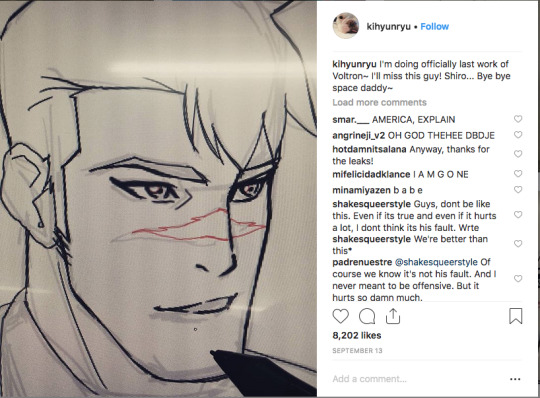
And those was absolutely not the only things which were changed. It was hinted we should pay attention to the s7 episode "the Feud" to spot some foreshadowing. Well? I've seen both that episode and s8 and I sure as heck can't find it.
This was beyond last minute.
JDS and LM were still talking in ways that would lead us to expect Lotor’s redemption roughly up to s7 in August; so whatever happened, it went down between August and November. Which is probably why s8 is so shitty; with such a terribly compressed timeline to make edits.
And edits they were, because with those time frames season 8 was either completely finished or very near to it when someone decided that things had to change.
I can prove it.
Do you know how?
Because the animation was recycled and altered to fit the new story, with only small parts made new for it. And because it was something else first, it’s still possible to partially reconstruct the original Season 8 from it.
Lets start with the big one, the one I’m sure you’re here to read: Lotor’s redemption and reunion with Allura.
One of the most frustrating things about season 8 is that it leaves the colony unexplained. The big question, the thing that results in Lotor’s murder at the hands of people he calls friends, and leads to a power vacuum that causes the deaths of untold billions of people. What was Lotor doing at the colony?
It’s never addressed or given an answer.
At least in the version of season 8 that we got.
Or is it?
Because they might have removed the conclusion to that plot thread, but they couldn’t get rid of it entirely.
In e8 ‘Clear Day’. Allura's suffers from several nightmares/dream sequences. They don't make any sense in context, and it’s never explained what caused them. Except, they make perfect sense, if you watch them as the first step towards understanding The Colony.
Allura sees herself standing in a Juniberry field on Altea. Her mother greets her and proclaims that Allura has arrived just in time, and that only she can save them, “Only you can protect us.”
A Galra fleet passes over head, raining down laser fire.
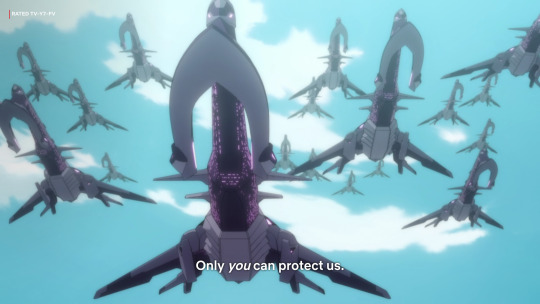
Allura suddenly finds herself the pilot of one of the white mechs. She plunges her spear into the ground, draining the quintessence, and then fires on the fleet; obliterating it.
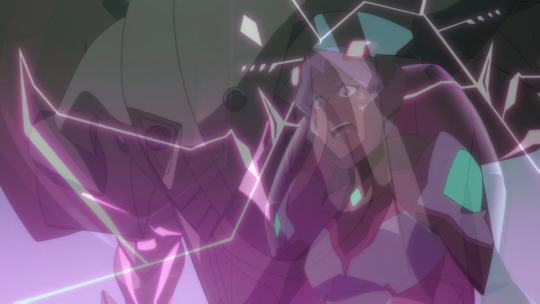
But as she grins in victory she realizes that the quintessence she siphoned from the planet has turned her immediate landscape to ash, including her mother. Allura is horrified, but as her mother crumbles away her voice echoes, telling Allura she is so proud of her.
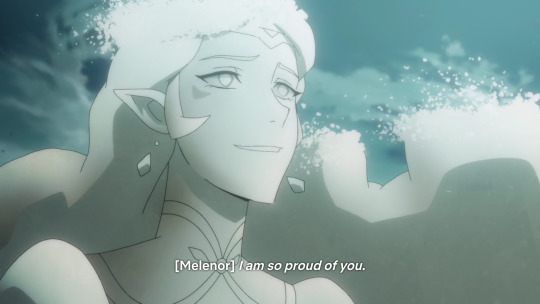
In case me describing it wasn’t clear enough: what just happened to her was that Allura was literally put in Lotor’s position, operating one of his mechs. The places and the people were those that Allura cherished deeply, so that she could understand how terrible Lotor felt about what he had to do. It literally puts Allura in Lotor's place: having to take the responsibility of destroying parts of something she loves in order to protect the whole.
And her mother? The Altean who was ‘sacrificed’ in this scenario? Praised her for taking the actions she did, because Allura was the only one able to do it. And the only choice was to save most of Altea, or none of it.
When Allura eventually does take the entity into herself we see the lights of Honerva’s mech’s faceplate lighting, then flash to a scene of Lotor in Sincline. He’s laughing, grinning as he did during s6′s finale, and as the camera zooms in on his face he shouts “Follow me!”

Briefly we see Voltron in front of the planets of Earth’s solar system, which is drowned out by a peculiar scene transition: an intense white light that appears to obliterate everything as though in an explosion.
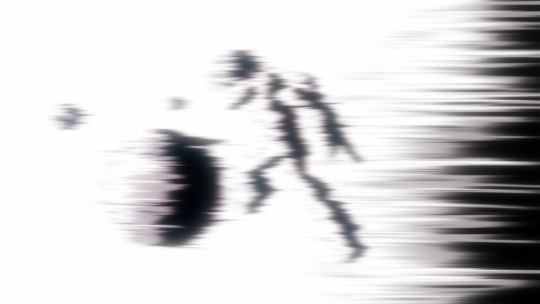
None of these scenes are ever explained, but it’s reasonably comparable to the flash of images that Haggar sees in season 3 when she is first confronted with Zarkon’s memories. We’re left with the impression that we’re about to be enlightened, and the end of the episode reveals that Allura has passed out on the floor unconscious.
In this version of season 8, we never are told what exactly caused Allura to experience those visions. We can guess: was it perhaps the entity tempting her with its dark magic? Honerva attempting to place her under a spell?
But is the entity really dark magic? It’s different from the types of magic we’re used to, and the colors of it are certainly dark, but it in itself never actually causes Allura harm. Any harm she suffers after taking it into herself is caused by Honerva exploiting it.
Could it be a spell by Honerva? Unlikely. It took her almost two whole episodes of the paladins fooling around inside her mind for her to notice they were even there. If Allura had never taken the entity none of Honerva’s plans would have ever been found out. Yes, she did steal all the energy from the Atlas’ crystal, but she did that primarily to combat the Atlas and disable it. She didn’t need to get it from there, the energy her Komars were able to provide was all she needed.
So what caused those visions?
Lotor did.
Once he was free of the rift he was able to connect with Allura somehow and reach out to her. That was really him. Where he is now, trapped under Haggar’s control, he has no means to combat the witch. But Allura does. Everything he says to her? Is true.
The next episode, s8e9 “Knights of Light: Part 1″ begins with Allura awaking, Coran and Lance by her bedside. She’s been asleep for two quintants (days). She has apparently come up with a plan to infiltrate Honerva’s mind, but from whence she gets this plan is never explained. That’s because we’re missing an entire episode between these two. This is where Lotor’s redemption happens, where he and Allura finally reunite. God knows what else was in that episode, what else was happening while the paladins were waiting for Allura to wake. Lotor bids Allura to follow him, to finally allow him to tell his side of the story, and for some reason we weren’t allowed to hear it.
But from what we did get to see? It all but confirms @crystal-rebellion‘s Colony Theory. Albeit, the white mechs were built by Honerva, but Lotor was attempting to keep the colony safe in the only way he knew how. The Alteans who died did so willingly; to preserve the lives of all the others.
There’s a repeated narrative that the only person who encourages Allura to take action, to strive and push forward, is Lotor. Sometimes others accept it, but they never encourage her. Everyone else seems to consider her too fragile, or not capable of making her own decisions. They want to protect her and coddle her, don’t believe she should be taking any risks. They are supportive emotionally, but want to limit her physically. They care about her, but don’t truly trust her judgement or want her to be making her own choices.
With Lotor though, it’s different. He truly sees her as an equal, respects her judgement in her areas of expertise. This plot line revolving around the entity is a prime example. Lotor provides Allura with the information, that she has everything she needs to take down Honerva right in front of her; she just needs to utilize it. But from the moment Allura wakes the people closest to her doubt her decisions and choices.
And yes, those choices lead to painful consequences, but in the end they are proven to be the right ones, to have been necessary. Allura took a calculated risk, and it pays off - if she hadn’t they’d have never caught Honerva in time to stop her from destroying everything. They wouldn’t even have discovered her plan in the first place.
If Allura hadn’t made the choice to listen to and trust Lotor, by her own judgement, reality itself would have ceased to exist.
Both Coran and Alfor are given specific scenes this season where they judge and approve of Lance in his pursuit of Allura. But key, neither of them ever ask - or even mention - Allura’s feelings on the matter. The s8 we got, rather disgustingly, portrays this as the right thing. I believe the original s8 was meant to subvert this. Because Lance is everyone else’s choice for Allura, but when Allura was allowed to make her own choice? She chose Lotor.
Allura once again ends s8e10 ‘Knights of Light: Part 2′ unconscious. I firmly believe we are missing more moments - if not an entire episode - with Lotor here, in s8e11 ‘Uncharted Regions’ - probably explaining somewhere along the way how exactly he is able to contact her in this manner.
Which, uh... as to my personal theory on how that is, well... what did Lotor and Allura do together that might have crafted a unique spiritual bond between them?
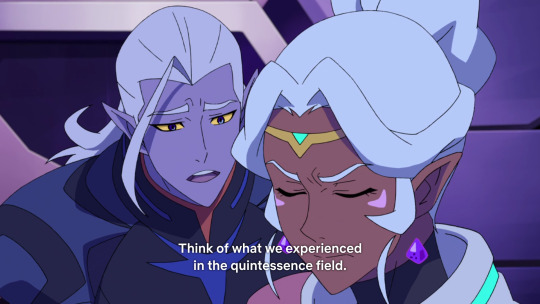
What did you two experience in the quintessence field Lotor?
But, those were happier times...
I also think this is the episode, this missing one, that that particular image properly belongs to. We now see it in the previous episode, as one of Honerva’s memories. But the reason we see it is that the paladins apparently see it too. The only problem is, they don’t react to it at all. They literally have a stronger reaction to finding out they can see Honerva’s memories in the first place. There’s no possible way that Allura saw the melted corpse of the man she loved and had no discernible reaction. We see her reactions to Lotor’s presence multiple times over the course of s7 and s8, and they’re always intensely emotional ones.
But speaking of that image, since we’re on the topic. That’s a very detailed image.
There’s details there you don’t immediately spot, because you’re too distracted by the horrific imagery of the corpse of a main character. A character who’s tragic, abusive childhood was the focus of almost an entire episode earlier in the season.
Details such as the motes of light floating up from his body.
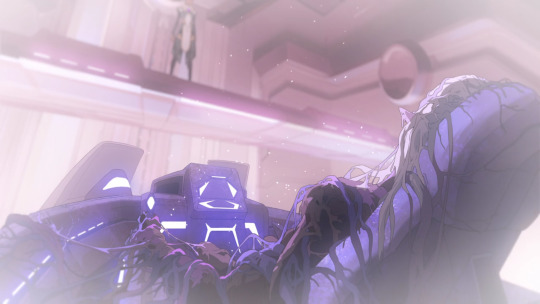
Motes of light we’ve seen in exactly two instances before: from Zarkon and Honerva’s eyes immediately after they were restored back to life by the rift.

And from Zarkon’s body: vanishing after he died.
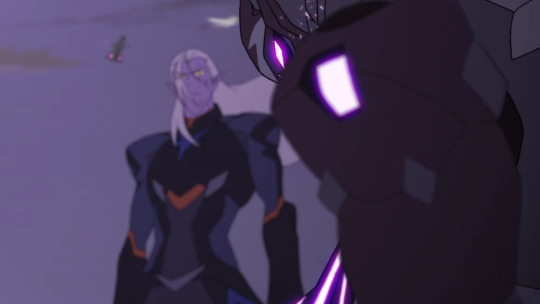
Yeah guys, I’m about to make that image much worse.
That’s not Lotor’s corpse, because he’s not dead.
He’s still in there, in that state, and he’s been in there for over three years.
Melded, physically and mentally, with Sincline by his time spent in the quintessence field.
What. The. Fuck.
As the season progresses it becomes much more difficult to tell what was supposed to be happening because of how badly it’s been chopped up, re-arranged, and edited.
But there is a very distinct difference between Sincline’s two appearances in action - that is, it’s only in the first one that it actually is in action.
The last time we see Sincline move of it’s own accord is e6 ‘Genesis’. From the moment he reappears Lotor is on the attack; he is stopped only two times, once of his own accord and once by Haggar’s mind control.
And that one time he stops himself? Is when he takes aim at Allura. She’s running across the ground, about to strike Honerva with her bayard, when he raises his right arm and takes aim. We see her in his sights, through his eyes. And the view zooms in on Allura’s face.
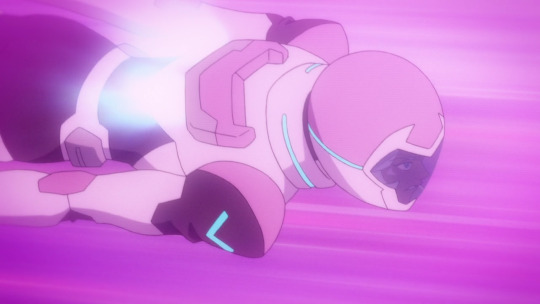
Lance sees what’s happening and dives in Red to stop him, but is blocked by one of the white mechs.
Yet. He lowers his arm and doesn’t take the shot.
Lotor never fires.
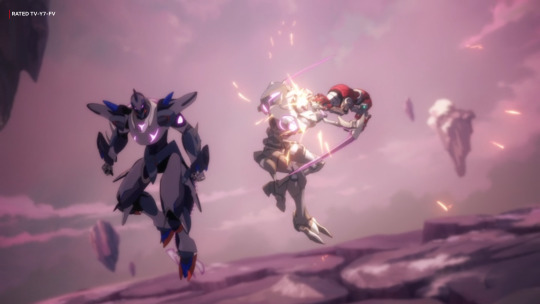
But immediately afterwards the white mech lingers too close and Sincline impales it with it’s tail. It’s not an aversion to killing that stayed his hand.
It’s that it was Allura.
This scene unambiguously shows that Lotor is both alive inside that mech and somewhat aware of himself. He’s become a robeast.
Yet after that episode the mech never moves again. It hangs lifeless in space during the battle at the pyramid; the white mechs having to do the fighting. The lights on it’s chest have gone out, only relighting when it is charged with quintessence from the Komar. For all intents and purposes, Sincline is empty.
Oh, and speaking of Sincline, up until s8e9 it’s only ever referred to as “Lotor’s mech,” but suddenly, in e11 ‘Uncharted Regions’ they’ve learned its name and Allura calls it “Lotor’s Sincline”.
I think that at some point between ‘Knights of Light’ and the second half of e11 ‘Uncharted Regions’ Lotor was to have been rescued. 'Uncharted Regions’ is one of the worst episodes this season for flow: it’s extremely choppy and hard to follow - flicking back and forth between scenes without anything really happening in them.
But the most telling thing?
‘Uncharted Regions’ begins with Honerva in her haloed mech searching Alternate realities for her ‘perfect’ one. We see several clips of her doing this, the mech floating in front of the pyramid, alone, with the spinning disk of its wings as a viewport.
Suddenly, almost exactly halfway through the episode, we get an image of Honerva kneeling inside the pyramid, in her Altean commander uniform, one uniformed Altean to either side. She says “The princess has awakened,” and then the scene changes.
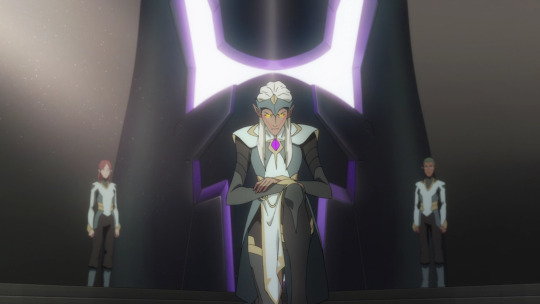
When next we see Honerva she’s floating above the pyramid, the silent and immobile Sincline by her side.
The entire time this is happening there is combat going on around the pyramid, first with the coalition fighters and then with the Atlas itself. This sequence appears in episode as though it all happens successively in a very short period of time. But it doesn’t make sense like that. Why should Honerva stop what she’s doing, and exit her mech just to check if Allura is awake?
In this scenario why does Honerva even care if Allura is awake? By this point she’s apparently found her perfect reality and is prepared to move on to it? She doesn’t need Allura for anything, none of her plans require Allura. Why should she even bother to announce that Allura is awake, as though this is something she’s been waiting for?
This entire episode, including the fight scenes, has been chopped into little pieces and rearranged. Other scenes have had edits to their animation, or were re-done entirely. What we have in ‘Uncharted Regions’ is a frankenstein’s monster of an episode constructed of the tiny remnants of of at least two, possibly three, original episodes.
If you watch this episode carefully you’ll notice that there’s a clip out of order. The lights on Sincline’s chest are dark until it’s charged with the quintessence from the Alteans on the Atlas. But. The close up shot of Sincline the paladins see immediately upon exiting the wormhole in front of the pyramid has the lights lit up. This clip clearly is part of the sequence we see later in the episode just before the mechs combine. So when the crew on the bridge of the Atlas is shown reacting in horror, whatever they’re actually reacting to has been cut out.
These original missing episodes would have contained what I’m fairly certain was our big Alchemist vs Alchemist reprisal fight between Honerva and Allura; something we’ve been waiting for since season 2′s finale.
Why was such an anticipated fight removed?
I think it’s because the fight was over Lotor, and ultimately Allura would have rescued him.
Every time Allura uses the powers she obtained in Oriande it’s mentioned where she got them, and often that she has them because of Lotor.
She’s shown again and again restoring life and health.
What happened, what we’re missing, is her using the abilities she has thanks to Lotor, to save him.
Allura is supposed to storm that pyramid, infiltrate it, and rescue Lotor from the evil witch holding him captive. She’s supposed to find him in that horrible state we saw him in, and she’s going to heal him. She’s going to fight for him, to protect him, when no one else in his life ever has.
There’s also a clear switch. When Sincline is active and alight Honerva several times refers to it as ‘my son’ but afterwards, she stops and uses Sincline as a tool for her to reach an Alternate Reality and obtain a ‘new’ version of Lotor. With the exception of one shot, where, since we can’t actually see her speaking it seems that the audio and animation are sourced from different original scenes, Honerva ceases treating Sincline as Lotor after the lights go out.
The line that causes Honerva to snap s8e12 ‘The Zenith’ is when the little alt Lotor says “My mother is dead”. It’s framed like a deliberate callback, like it should be echoing something. But it’s a line we’ve never heard. I’d hazard that this final rejection, this line was spoken by *our* Lotor as Allura is rescuing him.
Lotor was not dead in there, he was alive, and he was saved.
There is a really good theory going around, my friend @tsunemori told me about it. I don't know who first came up with it, but I fully support it, because I noticed the scene in question was really off too.
But the theory is that that hospital bed scene? Was originally Lotor in the bed after they rescued him, and Allura was in Lance's place. Which makes total sense, because after that scene, when Lance takes Allura to the bridge? His height is all wrong, and he is hanging onto her for support instead of the other way around: it should be Lotor there.
Do I have any concrete proof of this one? No. But there is something off about that scene. It just doesn’t feel right.
So yeah, if I ask myself, “Is this a scene that might have been re-animated, the characters traced over and re-drawn as different ones?” I can absolutely see that. When looking for places where actual edits to the animation have been made you have to factor in several things: the complexity of the animation - how many characters, how many settings, how much movement, who is the focus/moving/talking.
This is both a pivotal scene, and an incredibly easy one to alter, comparatively. Two characters, one laying still in a bed and only getting a single one-syllable line - the other character’s name, which might have been taken from anywhere. Lance has a long string of dialogue, but he’s sitting beside the bed the entire time, and he moves very little.
I strongly believe this scene was either altered significantly or created whole-cloth for this edited version of s8.
Things that are much harder to alter, because they’d be much more expensive, are the fight scenes. It’s where I started looking once I suspected what had happened with season 8, and it’s where I started finding things.
S8e12 ‘The Zenith’ is one of the best episodes in terms of flow, and I believe that’s because it suffers some of the least editing.
We are however missing at least two scenes: a farewell between Allura and Coran - presumably as Allura boards the Blue Lion - and an explanation as to how Voltron followed Honerva into her destination reality after the rift closed on them. I believe both of these scenes were edited out because Lotor was key in them; several scenes in the following episode s8e13 ‘The End is the Beginning’ lead me to believe that he spent the final battle in the Blue Lion with Allura.
Two scenes during the fight stand out to me: the first, a split screen where Keith is mysteriously given a double width section as compared to the others. It’s especially noticeable, because he’s not even centrally placed and he’s scaled to a different size than his fellow paladins. In the entirety of the series we have never before seen a split screen cut among an even number of characters where one of them is given odd prominence like this. The screen is arranged so the characters appear in a color gradient, Keith is red-black and immediately to his left is Allura who is blue. If there was a missing section here, the color space would correspond to indigo/purple - and those are Lotor’s colors.
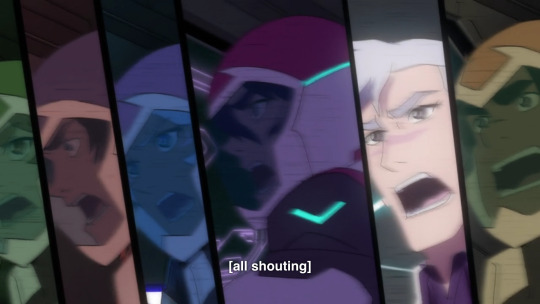
The second is a moment when Allura is speaking facing forwards and very clearly looks to the side and makes eye contact with someone. Now, VLD does have moments when the paladins will react in their own lions as though they can see each other, but this isn’t like that. It’s the way her eyes move, and look, she’s talking to someone who’s point of view we’re seeing her from. And that person is Lotor.
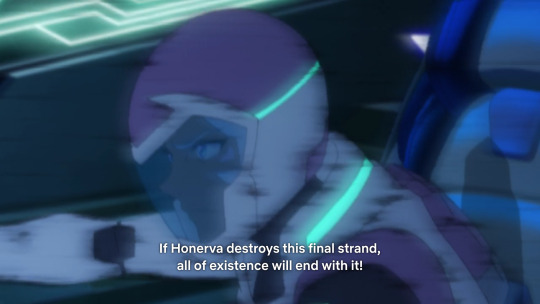
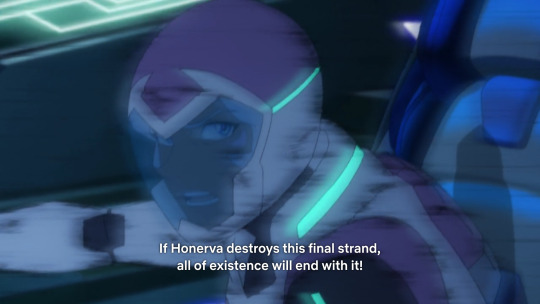
There’s also a peculiar moment in this episode where the same split screen is used twice; another thing which has never before happened in the series. It appears first about a quarter of the way through the episode as the paladins enter the stage for the final showdown and then again as they push Honerva into the glowing whiteness at its center. I believe that the second one of these is its proper place, and that the one that originally went in the first instance had Lotor included in it.
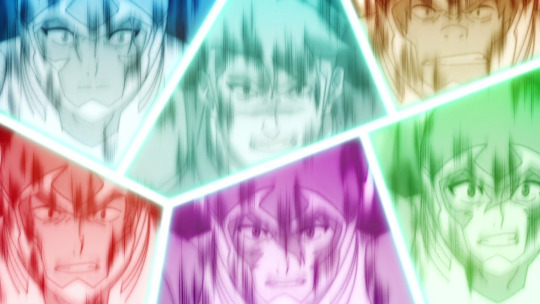
Finally, and this is going to take several images, so be warned. When the paladins appear before Honerva in the heart of it all, fading into view, they’re spaced very strangely.
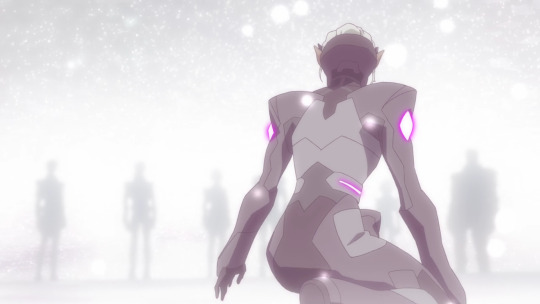
There’s six of them, so you’d expect they’d be spaced something like this:
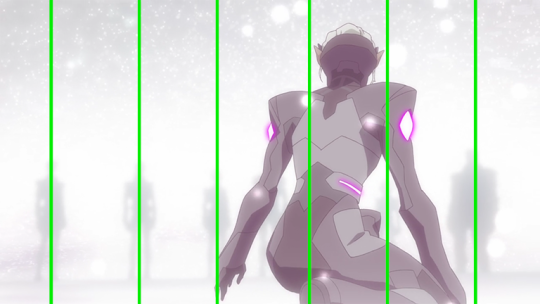
But they’re actually spaced like this:
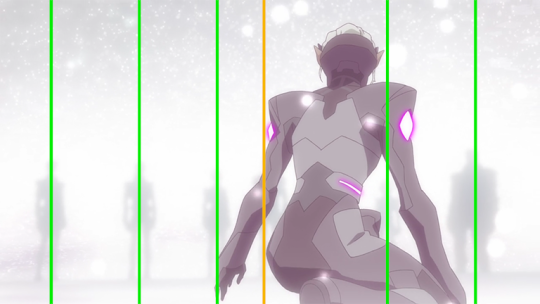
(yes, I know Honerva would be blocking someone there. She moves. I just picked this cap so you could see all the shadows; there’s no point showing you the empty space)
It rather looks like there’s someone missing.
The last half of the final episode is so heavily manipulated that it’s difficult to say what actually happened. But we have two very strong clues from which we can reconstruct it.
Remember the leaks?
Now that we know the leaks were real, it begs the question, why was this scene one of them. Unlike the others, which were all from the epilogue, this scene is from roughly halfway through the episode.
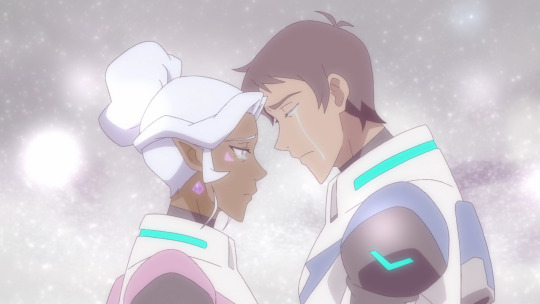
Well, I believe we have the answer now: whoever leaked them chose those because they were the scenes they had on hand. These were the scenes that were not originally part of VLD s8, and were added only in the last minute edit.
This one in particular is another where I think it’s taken an actual scene and traced over it to make it into something else. Lance is far too tall here, and doesn’t look like himself hardly at all.
It’s also very clear from the framing of the shot where Allura is going down the line of paladins and hugging them that Lance should be getting a send off in sequence to the others, not apart like this.
No, I think Lance was animated over Lotor here, and the audio was spliced in parts from Lance’s actual goodbye scene and Allura’s “I will always love you” comes from somewhere else. That portion of the line is said in a distinctly different tone of voice than Lance’s name beforehand. There’s different emotions to it than the rest of their conversation, and I’d guarantee we’re hearing it out of it’s original context.
I don’t know what else changes in the ending, but I’m very certain that it was not supposed to be read as Allura dying.
The reason we now read it that way is that Allura and Honerva are seen greeting the spirits of people we know that are dead. I’m fairly certain this scene is either new, or it was only Honerva going to meet them, and of course, that Lotor wasn’t among them.
And I think it was Allura and Lotor who stayed behind to do the work of restoring all realities. My proof of this is one of the very best and strongest among my evidence: the very last closing shot of Voltron: Legendary Defender, after the credits.
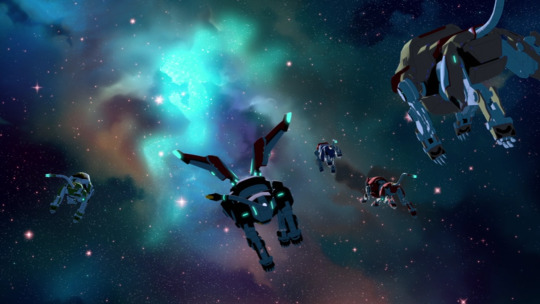
The lions of Voltron take off to rejoin their new Cosmic Entities; Allura and Lotor. Whoever was responsible for editing Lotor out of this picture only actually slightly blurred him.
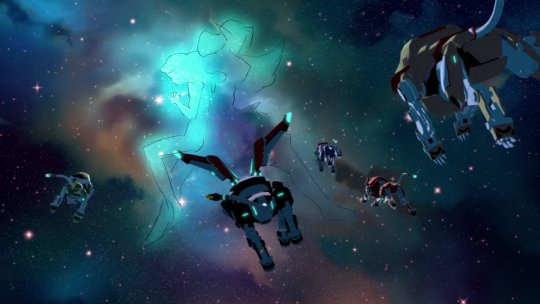
Thanks to @articianne for the outline!
If you play around with the image contrast and brightness it’s even more obvious that the both of them are there, back to back.
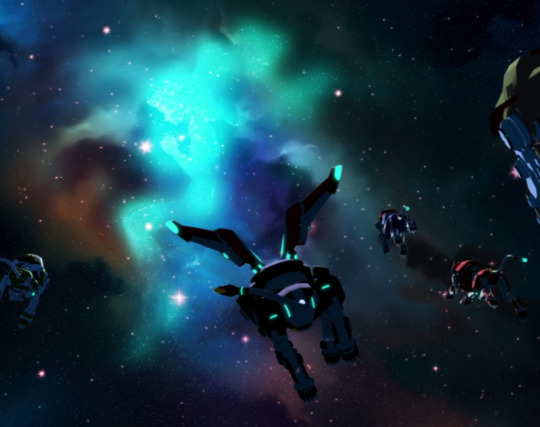
It only looks like Allura dies because the spirits but without them there? It looks like they ascended to a higher plane of existence or something.
They haven’t died at all. They’ve become, of all things, like Bob, the gameshow host from s7e4 ‘The Feud’. An ‘all-powerful, all-knowing interdimensional being’.

And y’know? Bob was perfectly able to interact with the paladins no problem.
I don’t understand why these changes were made. To me? This looks like a perfectly happy ending.
What else was cut I don’t know. But I found all this evidence by looking for the things that weren’t there, that a competently structured plot would lead me to expect would be. Chasing ghosts, as it were.
A short list of additional things I strongly suspect were cut?
Several scenes between Keith and Shiro.
A pivotal scene between Allura and Coran.
A follow up event with Pidge referencing her sacrificing her videogame to get Allura a dress.
A scene between Lance and Pidge, possibly referencing said videogame.
A resolution to Lance and Pidge competing to get Allura the best present.
A conclusion to Axca’s sub plot.
A Hunk and Shay scene, to explain how and why the Balmeras all show up in s8e12 ‘The Zenith’.
An additional scene with the blade for the same reasons.
Actually, y’know what? I’m not just going to leave this, because I have a strong suspicion what one of the other cut subplots was about.
You see, the other half of ‘Clear Day’ isn’t entirely filler - it’s specifically a callback to the season 2 episode ‘Space Mall’, and it’s not the only one in this season. The little shopping trip from s8e1 ‘Launch Date’ is also one. Specifically they’re part of a plot for Pidge about her feelings for Lance.
In ‘Space Mall’ Pidge and Lance spend their time scrounging up change to buy a videogame console. The game that they purchase is part of a series that Pidge later trades the only copy of the latest version of to get Allura a dress. During ‘Clear Day’ Pidge and Lance both spend their time trying to get the best present for Allura (hint hint, Pidge is the one who actually got the ‘”something sparkly”).
Now, as I’ve already covered, there’s missing content between ‘Clear Day’ and the next episode. Part of that content should have been what the other paladins were doing while Allura was unconscious. And in series, we never actually see Allura receive either of those presents that were bought for her. So where did they go?
I think Pidge and Lance spent the time waiting for Allura to wake up together, and they got to talking about how Lance has once again failed to acquire the sparkly thing Allura would like. Perhaps Pidge trades her mining helmet for Lance’s signed Blue Lion, and then it comes up how both times Lance went to get a present for Allura he ended up getting one for Pidge.
And that first time was the video game wasn’t it? A perfect place for Lance to find out what happened with the video game in s8e1.
So why did Pidge trade that game? To make Allura happy, yes, but also to make Lance happy. Because Lance likes Allura and Pidge wants them to have a good time, because Pidge likes Lance. Like, check e1 when Allura tells her she's going on a date with Lance, Pidge's reaction... isn't really a happy one.
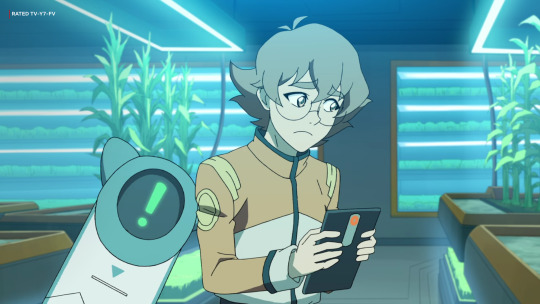
I think this should have been the turning point for Lance, where he learns the difference between infatuation and sincere affection. I think very soon after this his relationship with Allura would end, and he would naturally progress into a different sort of relationship with Pidge.
As much as I love s8e7 ‘Day Forty-Seven’ I don’t think it was originally part of season 8. I also get the feeling that s7e2 ‘Shadows’ may be composed of scenes we were supposed to have gotten throughout the later half of season seven - though I expect that this change was made in a much earlier spate of edits, likely when s7 was re-done. It’s been confirmed that this happened, and that s7e4 ‘The Feud’ was made to ease the pressure on the exhausted animators who’d been working overtime to get the other episodes done in time. It’s never been confirmed what exactly was changed about season 7 or why, but I highly suspect it was to include more content with the MFE fighters, who the higher ups at Dreamworks might have been hoping to spin off into a sequel.
I suspect that the episodes were shifted forwards, because the first half of the season has no 'event' episode. s8e6 ‘Genesis’ should have been that, and what we're missing is the mid-season event. Which was where they would have saved Lotor. They excised an entire climactic fight between Allura and Honerva, reprising their battle from season 2. The alchemist vs alchemist fight that was repeatedly alluded to being inevitable, yet we never got.
It was animated and voiced to be Lotura and Lotor's vindication.
But someone wanted that changed.
We know when and why ‘The Feud’ was created, and because we were teased in several interviews to pay attention to it so that we might spot some foreshadowing, we can definitively say that the mucking around that was done to season 8 happened at a much later date.
In fact, the animation portion was likely completed all the way back in June. These are two bumper images that were used to advertise Season 6, which released on June 15th.
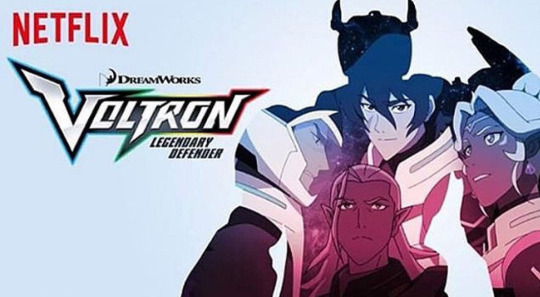
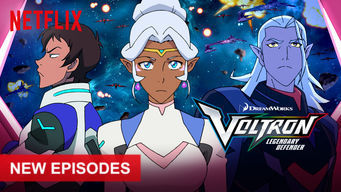
We haven’t yet seen this image of Lotor appear in the show (for what it matters, the full color one is the correct way around; Lotor’s hair always curls up over his right shoulder, the left can go either way), we have scoured every frame of him to find it, but it’s just not there (yes I know it looks like it should be from s5e4 ‘Kral Zera’, but trust me it’s not). Every other image that’s ever been used in these promotional bumpers has been from somewhere in the show, but this one is so far absent. Therefore it’s from a piece of animation yet to appear, and one which was made by the time these images showed up in June.
Now that we know what the truth is, I am sure we will get the full story eventually. It's only a matter of time before it filters out.
But right now is the key time if we want to convince Dreamworks to release the original season 8. Tweet at them, email them, snail mail if you have the time! Sign that petition!
The fandom response now will determine if we find out what really happened sooner rather than later - and later could mean years.
We are the only people who can make this happen. The cast and crew are all bound by NDAs, and publicly reacting negatively towards a show you worked on is practically career suicide.
It has historically been fans who’ve made a difference when companies interfere with their favorite shows. Fans have been able to effect change in the past, and they will again in the future; lets make sure this is one of those times. We need to fight to get the VLD we should have gotten in the first place.
Just remember to apply your energies in the right places. JDS and LM aren’t perfect people (no one is!), but this isn’t their doing. This is someone above them responsible for the mess that was s8. Dreamworks Animation is the culprit. There is a very real chance that the original season 8 is completely finished and able to be released, and we just might get it if we’re persistent enough.
Be polite, be reasonable, but be firm. Take this proof and use it. Show them that we know they changed things and that they can give us the original if they so choose.
The messages they inadvertently pushed with this slap-dash edit are vile and toxic, and people far more knowledgeable than I in those areas are speaking out about them. This needs to be fixed.
They need to say something. They need to tell us why they changed it. They need to give us the original Season 8.
Click here for Part 2: Seek Truth in Darkness
I, and any of you who enjoyed this meta, owe @nomadicism a huge thank you. She reminded me of that strange "Follow me!" scene, which prompted me to crack open 'Clear Day' for another watch... and I realized that Allura's dreams weren't nonsensical at all.
As always, thank you to my many friends in the Lotura Discord. You give me the strength and encouragement to keep going. I couldn’t have done this without you.
#Lotura#vld s8#plance#Lotor#Allura#Pidge#Lance#VLD#Voltron legendary defender#VLD s8 spoilers#voltron spoilers#Haggar#Honerva#voltron conspiracy theory#The Ghosts of Season 8#executive meddling#LotorDeservedBetter#AlluraDeservedBetter#Hate tries to Meta#hate writes too many words#it's like 6k#dare I tag it?#i dare#riftsex#i can't believe that's plot relevant#vld cast
8K notes
·
View notes
Text
Even though the ending of the season sucked it was still great in some points, like the animation and the voice acting. But it also expanded on Lotors childhood and his abuse by his parents.

Since his birth he was constantly rejected by his father, his mother not even remotely accepting him as her own. He never knew his own mother and his father refused to tell him about her.


He was brought up by dayak who cared for him but not enough to actually prevent him from being punished and hurt by his father, since she had her own interests in mind. He looks so hurt because he tries so hard to get his father to accept him. He says that everything he does he does in the name of galra. He wants his father to be proud of him.


When he's older he wants to accompany him but still gets rejected. By then he has learned that he has to accept his place and not talk back. Likely learned through punishment.


He worked really hard to harness the quintessence to earn his father's pride but still got punished for his actions. He always just wanted to be accepted by his father. He wanted a family.
#voltron#voltron galra#vld#vld spoilers#voltron lotor#lotor#prince lotor#vld lotor#zarkon#haggar#honerva#meta#voltron zarkon#galra#voltron altean
3K notes
·
View notes
Text
I was too busy contemplating tossing my laptop or myself off the roof by the time I got to this part, but I JUST realized what Allura says to Honerva when she’s asking her for her help.

Sound familiar?


Great. Now I’m crying again. One more thing to add to the endless list of things I can’t comprehend actually happened in this season.
Like. I can’t believe they would callback to this line. And after what was basically a freakin’ Lotura montage no less (again for the billionth time, what was the point????)
In a world where the writers didn’t lose their minds and actually brought back Lotor properly and gave him the redemption he deserved instead of to his abusers (seriously what the ever-loving fuck??), this exchange should have been between him and Allura.
Look, obviously I did not want either of these characters to die. While I had lost faith in the writers to do Allura/Lotor justice after season 7 and had resigned myself to suffering through an underwhelming and nonsensical Allurance relationship, I was one of those people who thought everyone worrying about Allura being killed off were crazy. I even believed the leaks were real, and still, I had NO doubt in my mind that Allura would end up ruling the Alteans in Oriande. I thought, “Calm down, guys. The writers couldn’t possibly be THAT stupid to kill off their main WOC character.” HO BOY JOKES ON ME 🙃🙃🙃🙃🙃
*takes a deep breath*
However, if the overall season had been written better so that a sacrifice had some vestige of narrative and poetic integrity, I may have been able to respect it. That being said, it should have been Allura and Lotor coming together to save and restore all the realities, not Honerva. In her plea to Honerva, Allura literally credits Lotor for having the knowledge to do so. Like?? HE is the reason they were even able to fix all the damage his bat-shit crazy, abusive mother was responsible for and save the universe. He should have been there. End of story.
While I personally appreciated Allura’s sacrifice echoing that of her pledge to the White Lion - “I seek the secret of life. I give my own” - the act itself within the context of what we got in season 8 was far from being done any justice to how meaningful that moment could have been. What we got instead was something that felt empty, rushed, and ultimately unnecessary, and was further cheapened by the fact that all it took for Honerva to finally see the light and repent for her mistakes was another overwrought inspirational speech from the paladins. Sure. That’s believable. Also, anyone want to explain to me why Allura and the paladins gave Honerva the time of day and not Lotor two seasons ago? Oh right you can’t because IT DOESN’T MAKE SENSE.
Allura and Lotor were the Chosen Ones. Seriously, romantic implications present or not, how beautiful would it have been for the finale to have harkened back to their journey into Oriande? With Lotor getting a second chance to make the right choice and offer himself, thus adding another layer to what should have been his redemption arc. Even in that scenario, they wouldn’t necessarily need to die. I personally would have loved to see them walk into the spirit realm, not to their deaths, but onto the next great adventure into the unknown, using Lotor’s knowledge of Altean alchemy and Allura’s abilities to restore the alternate realities and working together to preserve all life.
The story was right there. A prince and princess born on opposite sides of war, who have lost everything, finding each other and working together to overcome the pain of their pasts and the prejudices built by those before them would have made for such a compelling and satisfactory ending to Voltron. They both deserved so much better, together or apart.
Don't get me wrong - Honerva is a fantastic villain. However, rewarding her with redemption, in my opinion, hurts the impact of her story. A story that is incredibly emotional and complex and, at times, downright disturbing (dragging her son’s melted corpse all over the place? YIKES. I’m not even going to go into THAT scene). And yet... we can still feel a bit of sympathy for how she got there. It’s a story of someone who made all the wrong choices, desperate for the life they could have had had it not been for, essentially, a drug addiction, and the lengths to which a person will go to change the past.
But that’s the thing. She can’t change the past. The whole season spends the entire time telling us that. And the cruel irony is that, in her desperate search, she feeds the cycle of pain by continuing to commit atrocities in order to get the happiness she wants and the family she lost.
Honerva should have been the tragedy. Not Lotor.
#honerva didn't deserve redemption#thanks for listening to me rant!#voltron#vld#vld season 8#vld spoilers#lotor#allura#lotura#honerva#haggar#shiro#lance#keith#hunk#pidge#vld meta
375 notes
·
View notes
Text
Fascinating
Lotor: The Man Behind the Mask
AKA The Many Faces of Lotor and Which is His True Face?
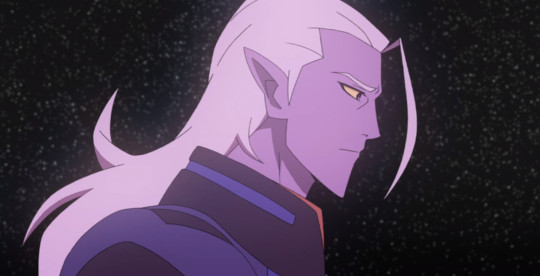
To say that Prince Lotor is a multi-faceted character would be an understatement. Born into a life of tragedy, the many masks he comes to wear are borne of his circumstances to not only further his own agendas undetected but most notably to aid in his own self-preservation both physically and emotionally. A proverbial sword and shield to protect himself. These false faces allow him to do and say what’s necessary to keep himself alive to fight another day - a practice that’s unfortunately hard-wired into him from centuries of abuse.
The character we’re first introduced to is probably what the audience expected: an antagonist (albeit a more complex one than expected) that leaves the audience questioning his true motivations. An aspect that makes him more intriguing but also works against him with many fans using it as evidence to validate their worst perceptions of him. But, as we see more of Lotor throughout the series, we begin to explore the depths of him and uncover evidence to the contrary.
So, which is his truest face?
THE MASSES
We don’t get to see Lotor interact with the masses many times in the show, but the most notable occurrences are his introductory scene in the arena and the Kral Zera - both occasions in which he presents himself as a powerful, capable warrior, a persuasive public speaker and a leader worthy of the Galra’s loyalty.
In the first occasion, Lotor almost immediately undermines his previous show of good will towards the assembled Galra by confessing to his generals in private that “the masses are easily manipulated.” This statement would, understandably, leave audience members to believe Lotor is nothing more than a liar and manipulator as a key attribute used to define all of his subsequent actions.
At first glance, this looks pretty damning. Alone, with people we can easily infer he’s closer to, he seemingly reveals that all the magnanimity of his previous words and actions were false and showcase to us a key element of his character to watch out for: an effortless duplicity that is utilized to hide more malicious intentions. At the time, it seems to scream to the audience: ‘don’t trust him’. However, as we learn on his journey, there is more to him that meets the eye, and this line should not be taken at face value.
Before we take this as unwavering proof that he’s a villain and everything that follows should be looked at through the lens of presumed deceit, I think we have to consider the context and audience here. This line was in response to a stadium full of Galra warriors who dutifully and unquestioningly serve his father - someone he’s trying to stop. Swaying the minds of the Galra is a necessary step in his quest to ultimately improve their way of life but he also doesn’t think very highly of them. His regard of them is different than that he holds towards other people and cultures as we see later. I also believe he says this to benefit the generals, but I’ll get to them later.
Unfortunately, we don’t get to see him spend time with the members of either of the peoples he looks after, but we do know that he deeply loved his time on the mining planet and there’s no doubt he cared for the Alteans just as much if not more as they were his own people. It’s also not hard to imagine that both groups of people appreciated him just as much. We don’t know how close he truly got to them, but it’s safe to surmise that Lotor is a person that respects others enough to treat them with equality, enjoy working beside them and genuinely wants to improve their lives. Though we later learn that he was ultimately lying to the Alteans, it’s clear that’s definitely not something he enjoys doing.
Among the average civilian or disenfranchised person, we can infer Lotor is more than likely very cordial and respectable based on how he speaks of them and how they perceive him in return. Despite his status as a prince, he’s clearly not preoccupied with maintaining an air of authority among the common folk in any way meant to remind them of his status above them, even allowing himself to bond with people on such an equal level that Zarkon saw it as unfit for his station.
Basically, though we know he has a turbulent relationship with the Galra as a whole, we can also see that he fights for the rights of other half-breeds such as himself and treats people in his care with respect and equality.
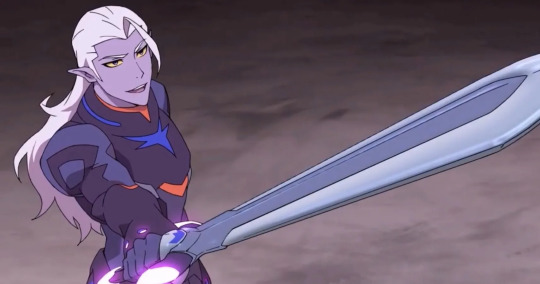
ZARKON
As a child, Lotor had to present himself as the perfect prince in an attempt to earn Zarkon’s love, and it produced a facade he probably maintained most of his life despite it getting him nowhere. Of course, as a child desperately seeking their parent’s affection, this behavior - though tailored specifically to appeal to his father - wasn’t inherently disingenuous and it’s only later in life that he learns to use it as a weapon.
Knowing that Lotor has tried to portray himself as respectable and eager to please thus far, his outburst of anger in retaliation of his father’s demands in 8x02 may have possibly been the first time he’d spoken out against him in such a way as, up to this point, Lotor still seemed to genuinely believe his father would listen to him and is surprised by his decision to destroy the planet. The mask finally slipped but, I might add, only in an attempt to help others. This speaks volumes about the kind of person he is and what his deepest motivations are as it shows he cares more about protecting the mining planet than he does for his own safety as he knowingly incurs the wrath of his violent father. Of course, upon realizing that his interjection would punish them too, he immediately tries to submit himself before Zarkon once more to keep them safe.
Despite his efforts, Lotor unfortunately fails to protect the people and this tragic situation no doubt led him to reinforce the old facade of the obedient son who would never dare act out against his father again - a mask he uses to his advantage in 4x03. After their conversation, we see Lotor smirk suspiciously upon taking his leave, clueing to the audience that his behavior with Zarkon was entirely an act to keep his father from suspecting him of any wrongdoing.
After Zarkon uncovers his ruse, Lotor’s submissive mask drops once more and, upon meeting again, Lotor no longer holds back from sharing every ounce of disdain he bears for his father before fighting him to the death.
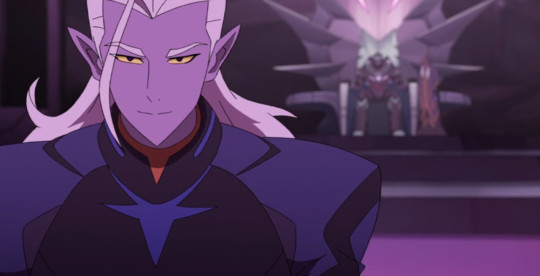
HAGGAR
Unlike his father, where he hides his emotions under a guise of respect and servility initially, Lotor shows no restraint in sharing his unbridled anger and contempt for his mother, Honerva. These feelings never waver, in fact, they only seem to intensify, punctuating a heated final confrontation where Lotor vehemently renounces her as an abomination that he will never accept as family. This distaste seems to have evolved over his life as her role to him changed. As a child, she was nothing more than his father’s witch and not someone he needed to please. Their relationship was never a good one so there’s no need to pretend otherwise.
I believe his anger towards her comes, not only from rebelling against the fact that his mother was essentially stolen from him by Haggar (which shatters his dreams of having a loving mother) but also her mistreatment of him throughout his life and even fundamentally disagreeing with and despising the kind of person she (and Zarkon) are: selfish, power-hungry and uncaring of the lives of others. He denounces them for their behavior because he knows it’s wrong and doesn’t wish to fall prey to it as well - which is a great indicator of the kind of person he is and what values he agrees with and doesn’t.
In a way, this is a true face to Lotor as well. His feelings of unfettered rage towards Honerva are not censored by any mask he’d wish to portray. There is no part to play here as there’s nothing that will keep him safe from her scrutinizing eyes on him at all times. Nothing to hide because there’s nothing to gain from it. So, instead, to keep her off his trail, he goes to great lengths to evade her detection through calculated action rather than any false pretenses.
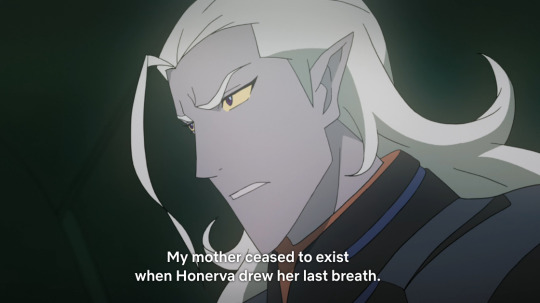
THE GENERALS
Though they’re the closest thing he has to friends for a time, I still don’t personally believe Lotor was close enough to his generals to reveal his true self (though he obviously reveals more to Axca as he trusts her the most). Overall, he still maintains an air of authority with them, seeking to portray himself as the calculating and confident leader clearly stationed above them though he still treats them with respect. Though it’s clear he cares for them, and they hold some degree of respect for him in return, he’s still very much their leader more than their friend. They may believe in him and his mission for a time, but they don’t follow him solely out of admiration and are willing to sell him out if it benefits them - which they do.
They’re, for the most part, his loyal allies, but not anyone he’d confide in or show vulnerability with as demonstrated by his lack of explanation regarding his actions towards Narti and his refusal to share his full plans with them. They respect him for a lot of reasons but don’t entirely understand him or what he truly wants which is why they often seem perplexed by his decisions. With them I think he maintains, to a degree, how he would present himself to the general masses. He has to remain collected and in charge to preserve their loyalty to him and can’t sully that depiction with the perceived weakness that comes from showing vulnerability.
Jumping off my earlier statement about the “masses are easily manipulated” line, it ties into the perpetuation of the persona he’s trying to evoke to them and which they whole heartedly support. He’s telling them what he thinks they want to hear. We also know he doesn’t tell them the full truth, so why should we believe this is somehow some deep reveal into the center of his character when we also know that he doesn’t showcase side of himself with them? It’s another piece of a persona, nothing more.
This mask was not created in an attempt to manipulate but in a desire to achieve and preserve some degree of companionship and loyalty from his generals. Lotor has no one but them and he can’t afford to lose their fealty, so he tries to keep it in the best way he knows how: by being a successful leader worthy of being followed.
Bottom line, beyond Lotor’s genuine affection for his generals - which is very much an extension of the compassion he’s capable of - he does not show his true self with them.
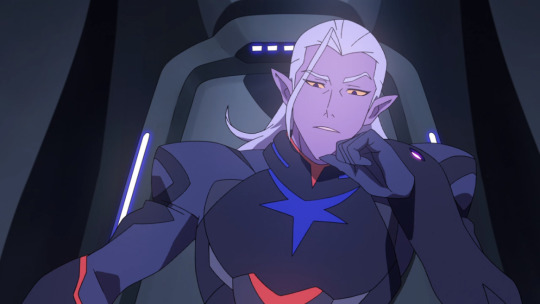
THE PALADINS
Lotor sustains his typical air of confidence upon meeting the paladins face to face in a continuous effort to portray himself as a worthy asset to them (not too dissimilar from his interactions with his generals). Though he shares vital intel with them to prove his loyalty to their shared goals for peace, he doesn’t go out of his way to ingratiate himself to them. He’s cordial and honest, as is generally his nature, but not afraid to share his opinions even if they’re opposing or adversarial.
For example, in their first scene together Lotor has no trouble calling out Allura for voicing her discrimination towards his race and generally seems tired of waiting for the paladins to truly listen to his advice and start making real strides in the war. He’s interested in action, not being liked. If he truly wanted to manipulate them, I imagine he would have been far more sycophantic to worm his way into their good graces - an act he’s familiar with due to his father whom he was trying to lie to. We know what a groveling Lotor looks like and this is not it. Of course, there’s also no need to lie to them to get what he wants when they have the same goal.
There’s frustration there between both parties at times and definite growing pains as he finds a place for himself in their group, but certainly not anger or resentment of any kind on his part. That being said, when the paladins do come to trust him and there’s no disagreements in their way, Lotor defaults to his natural state: dignified, helpful and amiable. I’m not sure how much affection Lotor truly manages to garner for the paladins by the end of their time together, but he does refer to them as ‘friends’ at one point and though that doesn’t mean they’re people he would necessarily pour his heart out to, I’d say they definitely count as favored allies that he’d support and protect just like anyone else he cares even remotely about.
However, similar to his generals, whatever degree of fondness he may have developed for the paladins is still ultimately moderated to keep them at arm’s length though, I believe that given the proper time and trust, this could have changed.

ALLURA
With Allura, we see a new, softer side to Lotor. I could write an entire meta solely about their interactions and how they’re not manipulative, but I’ll be brief here. As I said with the paladins, there’s no real evidence to suggest Lotor was just saying and doing everything he did solely to appeal to Allura and ultimately seduce her to his side. Instead, what we see is both of them slowly and organically becoming more comfortable and trusting with each other, enough so that they begin to reveal deeper sides of themselves. Just as Allura is willing to share her insecurities with Lotor, he too divulges the innermost parts of himself that he doesn’t reveal to anyone else.
If a mask is meant to hide the deepest parts of oneself, Lotor being so openly vulnerable, honest and trusting with Allura is enough to tell us that what he shares with her isn’t an act - he’s just finally comfortable enough to show his true face and the hidden parts of himself he hasn’t with anyone else. For a man who is all about survival and whom trust doesn’t come easy, this would be counterproductive and a potential liability he normally wouldn’t risk. So why does he risk it for her?
Relationships are built on trust and that takes time and true understanding to achieve. It takes a great deal of trust to reveal your true self to someone and Lotor simply isn’t at that level with the generals or paladins. He hasn’t really had anyone to share his true self with until Allura. He’s never met anyone else like her and their shared history and desires facilitates a swift journey from enemies to friends and even to something greater - an emergence of emotional vulnerability and affection that Lotor has never experienced before: love.
This is an aspect of his identity he’s no doubt unfamiliar with unfortunately or, perhaps, has never truly experienced before in his countless years of being whatever he had to be to survive. As we’re discovering this version of Lotor, he may also be discovering himself too.
There’s so much I could say about their relationship and how it brings out the best in both of them, but I won’t go off on a tangent here. Needless to say, the reason Lotor feels so different in S5-6 is because interacting with Allura is finally giving us the opportunity to see new aspects of his identity that’s open and unguarded. He’s finally put down his sword and shield… which leaves him vulnerable to attack.
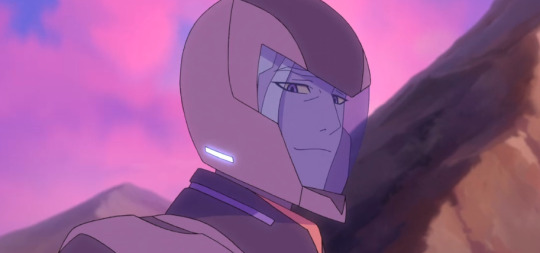
QUINTESSENCE POISONING
I want to address this specifically in its own meta but, for now, I’ll say that I found this depiction of Lotor a betrayal of the character and purposefully over-exaggerated to compensate for and push a narrative the writers failed to achieve organically. Essentially, I believe they made him so villainous - so vile despite how out of character it feels - simply to validate this new agenda that he is and always was, in fact, that very villain and, if that was always their intention for the character, they did not succeed.
Though we know that quintessence can corrupt and see that firsthand in how it turned his parents into beings acting without remorse and motivated purely by evil-intentions, even they have never been shown in such a negative and manic light, making Lotor look even more deleterious here by comparison which is an… interesting choice.
That being said, the turbulent emotions presented here do stem from underlying trauma, namely the pain of being betrayed by the one person he trusted more than anyone. The one person he showed his true face to. The person he loved. Having his true feelings be rejected and touted as nothing but more lies and deception as someone who doesn’t share them idly would be beyond devastating. Now, having put down his shield for Allura, she’s struck at the very heart of him. The pain of it unleashes a tidal wave of emotion and, like a wounded, cornered animal, he lashes out. This creates a situation which we see a side of Lotor we haven’t before. One that, though borne of genuine emotional suffering, does not actually reflect who he truly is.
Exacerbated by his exposure to the quintessence field and perhaps even that which already resides in his blood, Lotor reveals intentions of great evil - last minute motivations stemming from deeply rooted fears and insecurities that, unfortunately, are pulled to the surface here in the worst way possible but are not necessarily indicative of him having harbored and planned to enact these darker motives all along. Recoiling from the pain, it makes sense that his natural defense mechanism would be another mask - the ultimate mask.
If this was the true him, he would have truly fooled us all despite the extensive evidence to the contrary, as there is nothing to support his sudden dark desires here but plenty of prior evidence that refutes it despite the writer’s efforts to show otherwise. To say that all of this is the true, final reveal of who he is after all is insulting not only to the character but to fans.
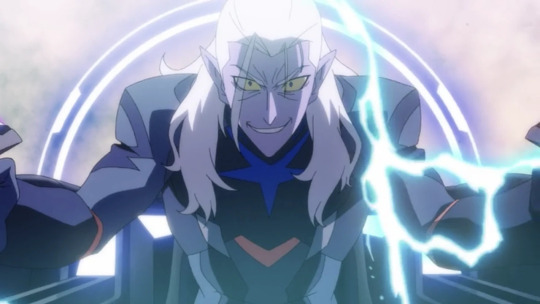
ALONE
To best know who someone truly is, we have to look at who they are when they’re alone. A great example of this is when we see Lotor alone in 4x06 as he overhears a message that there is an on-going attack that will result in mass casualties. Lotor doesn’t hesitate to potentially sacrifice his hard-won freedom to head straight back into Galra territory to try and stop his mother’s heinous plans. This is yet another scenario that showcases that, at the end of the day, Lotor is a character who simply wants to help people no matter the cost to himself.
We also see Lotor alone during his trial on Oriande where upon repeatedly being attacked by the White Lion, he understandably goes on the offensive and fights back to protect himself. After failing this test, Lotor is devastated. Rather than revealing any clues to potential villainy, this interaction instead simply shows that Lotor still has things to unlearn and is aware of that and capable of change. His anger here comes from his desperation and desires for self-preservation upon being attacked, not from a place of genuine malice.
I think it’s also worth noting Lotor’s expressions when he’s in his cockpit throughout the show but especially during his fight with Allura right before his ‘turn’. No one else can see his face but the audience so there’s no one to appeal to. No act to put on. We can clearly see he’s upset and remorseful and it feels like a sudden reversal from his previous scene with the generals because it is - not because his pleading with Allura is an act - but because his talk with his generals was. They are understandably confused here because his recent speech to them would have them believe he didn’t truly care about Allura and was just using her the whole time. This display says otherwise.
To further emphasize this point, his words and expressions here are consistent with his attempts to appeal to Allura in 6x04. The fact that his interaction with her is the same - whether he’s alone or in public - also shows us that it’s genuine. He doesn’t hesitate to share his true feelings to her when he’s trying to defend himself, nor does he bar his words in front of the paladins and generals when he’s trying to talk her down later. They might as well be speaking in private because it wouldn’t change his reaction. He’s completely focused on her and unconcerned with his unencumbered feelings being on public display - something he’s never done before and obviously wouldn’t be comfortable with. All of this continues to prove that, when it comes to Allura, he is his authentic self and his feelings for her are indeed true.
There may be more significant instances of seeing Lotor alone that I can’t recall, but, in summary, if Lotor was truly an evil, selfish person, we’d see hints of that most clearly in the instances where he has nothing to hide.
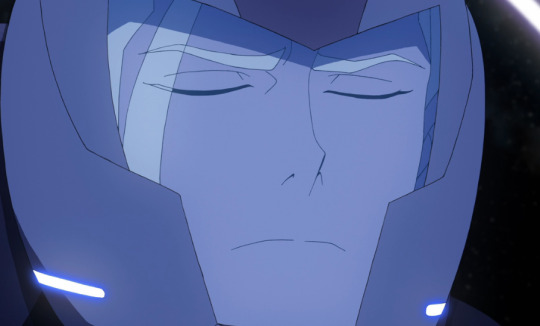
CONCLUSION
So, what is Lotor’s true face then?
As I’ve stated, Lotor is a man who has had to adopt different personas to survive, and we get to see the multi-faceted nature of his character on full display throughout the series depending on who he’s with and in what context. Regardless of some blunders in writing, overall, I think the show did a decent job portraying the different sides of him that would have logically emerged given his unique life and circumstances.
Of course, seeing the ease and skill in which Lotor can slip on these masks would naturally leave audiences to continually question him and his true intentions. As the show reveals more and more of his true self however, the answer becomes increasingly clear that, despite the resulting duplicity of his nature, there is no evidence to support that he’s anyone other than someone who wanted to do exactly what he said he did and whose goals are ultimately to help and protect others - a desire which was shown through his words and actions on multiple occasions. For all his faults, Lotor does have genuinely heroic traits despite being raised in an environment that didn’t cultivate them. A flower struggling to bloom in spite of the aridity of the soil in which he was born.
Despite the intended desire to hide his true self for his own protection, these fabricated facades do inadvertently reflect shades of his inner self too - a kernel of truth buried in each even as he has to transform to become what he thinks he needs to be to survive. By default, he tends to hide his true emotions underneath a facade of control and confidence - most notably seen in his interaction with the generals, the paladins initially and the masses (mostly Galrans). This portrayal of the proud and cunning man however is just a front to hide someone underneath who is more concerned with knowledge than power and protection rather than violence and it’s his bond with Allura that reveals the truest face of all: someone who is genuinely capable of kindness, vulnerability and even love. Given the right time and treatment, the inherent goodness in him could have been allowed to flourish and win and his true face could have been the last one we saw him with…
#voltron#lotor#prince lotor#vld lotor#vld#v:ld#voltron: legendary defender#voltron legendary defender#voltron meta#lotor meta#vld meta#voltron analysis#vld analysis#allura#lotura#princess allura#zarkon#honerva#haggar#no4forLotor
207 notes
·
View notes
Note
OK time another Honerva question (I know I've asked two already but you're my favourite person to ask): Honerva claimed to alternative reality Lotor when he rejected her that she did love him like a mother, but did she really? Admittedly I don't have any children of my own to judge maternal love, but I always got the feeling that Honerva after regaining her memories just saw Lotor as 'her' property and not as a person in his own right.
Hey, don’t worry about it, anon - I’m loving this just as much as you are.
- - -
You don’t have to have a child of your own to realize that Honerva is a bit lacking in the parental love department.
Let’s look at the scene you mentioned:

[…] I assure you, my love for you is that of a mother for her child.
What a weird thing to say, and what a weird way to say it. It’s almost as if she’s been saying this to herself, over and over, as if repeating it would make it true.
But we know it’s not. And so does baby Lotor.

She’s not my mother!
When she first regains her memories, you could almost imagine that she had been feeling guilt, not just in how she’d forgotten him, but because of the abuse she’d both facilitated and taken part in.
But as time goes on, we see that it’s not guilt - she’s lost her grip on something that she very much feels is hers.
If it was about love for her child, she would have been heartbroken that Lotor refused to come to her.
Instead…

Come to me.
That screenshot can’t capture the way she says that. There’s no warmth in her voice - it’s the cold demand of someone being denied something they think they deserve.
It’s something that begins manifesting back in S6 when she has him brought to her and he denies her. She only orders him to be taken away. She’s already had him brought to her - she’s not going to let him get away now.
And most tellingly, in S8 when she’s standing over his corpse, she says “We’ll all be together soon.”
Who’s we? Zarkon’s dead. Lotor is, apparently, also dead.
If she actually cared, if she actually loved them, she’d have been upset, inconsolable, incapacitated with grief.
But no. She just goes to get another set of family, their feelings in the matter be damned.
It’s just as before: she didn’t care about the safety of anyone else, she had to save her pregnancy. If it destroys the planet and her people, so what?
And now she has to have her family. And if it destroys space and time, well…
Objects can be replaced.
But people? Baby Lotor gets it right again.

Lotor: My mother is dead. And you cannot replace her!
The family she may have loved once is dead. She traverses time and space to find them again, but they’re not the same ones. They’re not her family. She knows that, and she doesn’t care. She’ll make them her family, whether they like it or not.
Because the price of denying her what she feels is rightly hers is death.
- - -
While I’m on the subject, can I talk about bad parents for a second? It’s gonna get slightly personal.
In several of my posts here, I talk about how much I relate to Keith, mostly in manner and disposition, but also the kid has obviously been through some emotional neglect, and like…same.
But after seeing what Lotor went throught with Zarkon, then Honerva…yeah.
I would also fly into the sun to get away from my dad. And sadly, I saw a lot of others echo the sentiment.
In the real world, these two mostly resemble Narcissistic Parents.
Psychology Today has an article titled “10 Signs of a Narcissistic Parent”.
The author defines Narcissistic Parents as:
A narcissistic parent can be defined as someone who lives through, is possessive of, and/or engages in marginalizing competition with the offspring. Typically, the narcissistic parent perceives the independence of a child (including adult children) as a threat, and coerces the offspring to exist in the parent’s shadow, with unreasonable expectations. In a narcissistic parenting relationship, the child is rarely loved just for being herself or himself.
and it includes things like this:
5. Manipulation
Common examples of narcissistic parenting manipulation include:
Guilt trip: “I’ve done everything for you and you’re so ungrateful.”
Blaming: “It’s your fault that I’m not happy.”
Shaming: “Your poor performance is an embarrassment to the family.”
Negative comparison: “Why can’t you be as good as your brother?”
Unreasonable pressure: “You WILL perform at your best to make me proud.”
Manipulative reward and punishment: “If you don’t pursue the college major I chose for you, I will cut off my support.”
Emotional coercion: “You’re not a good daughter/son unless you measure up to my expectations.”
A common theme running through these forms of manipulation is that love is given as a conditional reward, rather than the natural expression of healthy parenting. On the other hand, the withholding of love is used as threat and punishment.
….yikes, amirite?
That guilt trip one especially sounds like:


Countless worlds have fallen in to wake of my efforts to return to you. And this is how you welcome me?
It’s the classic narcissist parent: They’ve made so many sacrifices for you, and now you have to repay them.
Poor Lotor. At this point, I’m about ready to traverse the multiverse to find him so I can take him out for drinks. We’ll compare damage and reassure one another that we’re not like our parents.
So, in conclusion, you’re absolutely right, anon. There’s no real maternal love left in Honerva, just some weird perversion of the notion. At this point, to her, Lotor is just and extension of herself, a thing to be own and used. She doesn’t care about him and how he feels, only that he’s with her.
- - -
And lastly, if I haven’t broken your heart enough, look at one last thing with me:

Look at him. He’s so happy to see his mother again.
That means that in this reality, the one without the entities corrupting influence, they were a happy family.
Honerva wasn’t a bad person. One her own, she could have been a loving wife and mother. I can’t blame her for wanting that.
But she went about everything the wrong way, just as Lotor did with his colony scheme.
Honerva wanted to save her son.
Zarkon wanted to save his wife.
Lotor wanted to save his people.
What a tragic family.
#answered ask#honerva#haggar#lotor#zarkon#long post#meta#voltron meta#voltron#voltron legendary defender#vld#Anonymous
198 notes
·
View notes
Note
So you're saying this theory about Shiro being bp in pre-production, it expanded upon s7 to s8? I thought it'd be just the scripts but there're so many inconsistecies with lion color and lines it baffles me. If they had almost two seasons ready, why would they put effort in remaking them, wouldn't that make up for a higher budget? why would DW EPs change their minds about the former version? (also, I'm sure this means there's no alt s8, just a s8 over a s8)
So which of the four people I started to explain this theory to are you?
To clarify - no, they didn’t change the Black Paladin role from Shiro to Keith in pre-production. According to this -



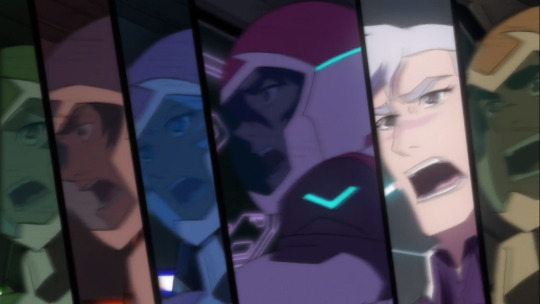
(Keith’s panel is double the size of everyone else and off-center, thus taking over Lotor’s panel.)
- the EPs changed Seasons 7 & 8 in post-production.
The Theory: Seasons 7 & 8 were a mess because essentially, we were watching different parts of Seasons 3-6 that were re-purposed following the insertion of the clone subplot.
After watching Voltron: Legendary Defender Season 8 and seeing how Allura and Kuron’s struggles paralleled, I realized - they don’t parallel. These struggles match. Honerva invades Kuron’s mind just like she invaded Allura’s, is connected to Kuron and Allura through some sort of mind-link, and eventually is able to override Kuron’s mind while Allura receives visions in hers.But why would the EPs and writers do the same fight over? Why would they choose to redo parts of the story, rather than advancing the plot?That got me thinking about other theories about reused episodes. Coupled with “Knights of Light” being Shiro’s paladin journey sans Shiro - it occurred to me – Seasons 7 and 8 are, in part, Seasons 3-6. And thus – here’s what I think the original order of the episodes were, heavily influenced by interviews and foreshadowing, and most likely, a bit of bias, too.
Season 3 (released as Seasons 3 & 4)
Season 3 up to “Hole in the Sky” was originally plotted and shown as is; however, we know from EP interviews that “Reunion” was originally slated after “Hole in the Sky” and “The Legend Begins” was a two-parter.
After the clone subplot was conceived, “Reunion” was pushed back, “The Legend Begins” cut to one episode (but footage reused later), and “The Journey” inserted. The reused footage of Lotor’s ships and Shiro being added after the fact (where he barely interacts with the rest of the paladins) puts most scenes from “The Road Home” and “The Way Forward” in Season 3.
I also want to add in here – while the EPs said they wanted Shiro to die at the end of S2, they originally said earlier that the execs told them Shiro couldn’t be out a full season. That means Shiro was slated to return – my guess within 26 episodes, a full production season, not a full release season (which is 13 episodes).
So I surmise Season 3 originally looked something like this:
Changing of the Guard
Red Paladin
The Hunted
Hole in the Sky
Reunion
Matt and Kuron’s Keith’s reunion in “Black Site” with parts of“Trailing the Comet”
The Legend Begins Part 1
The Legend Begins Part 2 (with the flashbacks we saw originally in “Knights of Light” Part 1 and 2)
Code of Honor (switching out the scene with Kuron for a scene with Kolivan; Keith returns to save the team) and/or The Journey Within
Fight scenes from “The Road Home” with paladins being captured/Zethrid and Ezor torture scenes/Black Site ending
The Voltron Show
Begin the Blitz
A New Defender
Just want to add – I wonder if originally, the five paladins stuck their bayards into their lions in “A New Defender” to give Voltron that extra punch, rather than Allura powering up Voltron with a deus ex machina. Then Lance seeing Shiro in the Void would have been the cliffhanger, not Keith almost dying. That would also explain why Keith’s near-death experience was never addressed by the team - cuz originally, it didn’t happen.
Season 4 (released as Seasons 5 & 6)
An early theory by @sol1056 was that Keith was the second son of Zarkon, born in the rift. It makes sense, particularly since Krolia had no bearing on the plot other than birthing Keith. Sure, she found the Blue Lion on Earth, but as the Galra Empire was originally announced to be misogynistic, and thus having no female warriors other than Lotor’s generals – then Krolia was never meant to be a Galra soldier and therefore, could have not found the Blue Lion.
I surmise – from Zarkon’s seemingly infiltrating Shiro’s mind in the pilot episode, to Haggar being able to hack Black and Shiro’s bond literally, and Red being on Sendak’s ship, where Shiro also spent some time – Shiro helped the Galra, perhaps inadvertently or unwillingly, to locate the Red and Blue Lions.
Also, please note - Cosmo was originally inserted into this season, and as you know from previous posts, Cosmo most likely took the place of Shiro in the script, seeing as Cosmo and the Black Lion have the same teleporting abilities. (Yes, I believe the paladins were going to go all AtLA and get powers.)
For this season, I start to get a bit creative since the blanks are gaping here, as the clone subplot came to a head:
The Prisoner
Blood Duel (with Haggar remembering Keith)
Postmortem (if not in the last season finale, then here is where Shiro would yell to Lance and Keith wouldn’t have been in the Void, seeing as he’s not the Black Paladin OR Allura missing from the Void and Keith in Red’s position)
Kral Zera (a bit different, with Keith and Lotor going to Kral Zera; also, there would have been fallout from the team finding out Shiro may be alive)
Bloodlines (Lotor and Keith finding out they are related)
White Lion
Omega Shield (Allura having issues, not Kuron)
“The Colony” – changed as Keith doesn’t find Romelle (potential deletion all together)
Black Paladin redux but this time with the team finding Shiro’s body being drained by Lotor - Lotor and Keith fight
Knights of Lights Part 1 – team goes to find Shiro with Allura feeling for Shiro’s presence, not using the entity; minus the og!paladins flashbacks, which now aired in the third season; Keith says “you’re back to Shiro,” not Black.
Knights of Lights Part 2 – Keith meets Zarkon surrounded by the paladins; found family trope achieved; Shiro’s history in the arena revealed or even “A Little Adventure” flashbacks
Defenders of All Universe - Voltron vs. Sincline
Please note: “Knights of Light” is a bit of anomaly. I feel it would work better as a mid-season climax - perhaps set in Season 7 - but if Shiro was to return prior by the end of the original Season 6 and Allura was having issues due to Honerva going to Oriande, then KoL would have to be in this season.
Also, since “The Colony” was literally an eight-minute scene inserted in the middle of an episode and later, the Alteans become pawns - there’s a chance the Colony could have been deleted all together and Honerva, as Empress of the Galra Empire, still could have completed her plan.
Season 5 (released as Season 7)
This season originally had Shiro back in Black with Lance and Keith going back to their original lions. Allura would be the one on the Atlas bridge by the end of the season, not Shiro.
Considering this - as well as the re-purposed parts from Season 3-6 - here is where budget question comes in. Moving “Prisoner’s Dilemma” here so Shiro unlocks his bayard and seeing as Pidge should have gotten her bayard upgrade after Olkarion, the original Season 5 may have looked something like this:
Shiro and Keith parts from “A Little Adventure” (originally written for “Across the Universe”)
The Ruins (Shiro teleporting him and Keith)
Battle Scars
Prisoner’s Dilemma
The Last Stand Part 1
The Last Stand Part 2
Know Your Enemy
Heart of the Lion
Trial by Fire
Lions’ Pride Part 1
Lions’ Pride Part 2
Adding in here “Monsters & Mana” and “The Feud” - you have thirteen episodes overall, but my guess is these filler episodes were added to take the place of content that eventually was ejected from the plot - such as Lotor’s redemption and Shiro’s history, Lance and Blue getting back together, etc.
Season 6 (released as Season 8)
I’m not even going to guess how this season originally looked, though we can assume “Genesis,” “Uncharted Regions,” “The Zenith,” and “The End is The Beginning” were all in the original rundown but with Allura in Atlas, Lotor returning to help Voltron, and the team back to its original line-up. And seeing as Allura went to Oriande and helped build Sincline, the natural progression of her storyline would have been to change Atlas on the fly in Season 7 and then in Season 8, merge Atlas and Voltron.
But more importantly, here’s where the budget was really made up -
Launch Date (filler)
The Grudge
Genesis (maybe the White Lion wasn’t supposed to die originally)
Day Forty-Seven (filler)
Clear Day
Uncharted Regions
The Zenith
The End is the Beginning
There are only eight episodes created here - not thirteen. Coupled with using this season’s budget for “Razor’s Edge” and some of the scenes from “Bloodlines,” that brings the total to ten. By injecting the clone subplot and choosing to redo the storyline for Black Paladin!Keith, the EPs were able to cut-and-paste together the remaining episodes of this season.
There are also short cuts in production you can see, such as leaving errors in animation and/or post-production. If the EPs and team were truly making sure VLD was the best it could be, we wouldn’t have:
Shiro calling for the MFE pilots to be ready to launch, and the Iverson doing it again less than four minutes later in “Uncharted Regions”
Atlas saying that it would cover the lions and then Keith saying they were giving Atlas a shot (A shot at what? Atlas was just supposed to help) in “The Zenith”
Quintessence colors that aren’t uniform, considering Keith’s bayard now changes to the same color of Black’s tail when Shiro pilots (There is a gentleman whose sole job at DreamWorks is make sure the colors align.)
Luca coming back from the dead, Lance in Blue, Yellow having Red’s fire power in “The Zenith”
Reused dialogue lines from previous seasons and perhaps even recorded dialogue with Shiro as the Black Paladin - Shiro as part of the field team in “Day Forty-Seven,” Shiro standing in for Griffin in “Prisoner’s Dilemma,” almost Shiro’s entire dialogue from “The Grudge”
Lance and Allura’s conversations with the original paladins not making any sense in “Knights of Light,” seeing as Allura isn’t overlooked. In fact, Honerva wanted to recruit her.
Pretty much - VLD cut corners in the last seasons to make up the budget and delivered us a torn-apart story with offensive message and yet another set of ridiculous wings.
TL;DR - Who really knows what happened with VLD, but what DreamWorks delivered wasn’t the original episode rundown, seeing as the team was supposed to be in their original lion line-up by the end of the series with Allura and Lotor being alive in Atlas and Sincline, respectively. And tbh - it hurts to see what we could have had and know there was an incredible story the EPs and DreamWorks not failed to deliver but refused to.
#Voltron#voltron critical#vld season 8#vld#shiro#it's a marketing thing#it's a business thing#meta#allura#atlas#sincline#honerva#lance#keith#voltron legendary defender
220 notes
·
View notes
Text
The Blue & Orange Morality of the White Lion and the Life Givers of Oriande
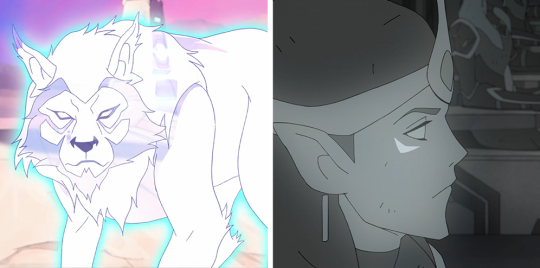
Prompted by an Ask, this very long post examines the White Lion and its condition for obtaining the knowledge of Altean Alchemy.
“Hi! I can't stop thinking about White Lion. Why is the condition for obtaining the knowledge so stupid? Give up your life? If anything, Allura wanted that knowledge for personal reasons (being Altean, father's daughter etc.), while Lotor went there with a purpose—he needed that knowledge so his own “Voltrons” would work with Alteans from Colony. It seems natural to fight, when lives of people depend on your success. And how did Haggar get that knowledge?”
My answer as to these questions—especially the White Lion and its condition for obtaining knowledge—is to deep dive into some meta and analysis by:
Skimming some literary and mythological concepts that relate to the Life Givers of Oriande and the White Lion via the basics of the Quest for Secret & Sacred Knowledge
Comparing VLD and the Prometheus and Alien: Covenant films where this quest appears
Exploring the requirements for entry to Oriande and the price of obtaining Secret & Sacred Knowledge in VLD
And how that applies to Lotor, Allura, Haggar, and Alfor
First, some context: There is a Reason™ why certain tropes, and certain types of plot lines, and certain types of character arcs are bundled together and progress in certain ways. These combinations are Timeless. Generally speaking, they work well so long as one follows the unwritten rules that bind them together. Their predictability can be offset by a skilled and clever writer. These combinations are the building blocks of Ur Stories, and many Ur Stories (and their contemporaries) involve Quests for Secret & Sacred Knowledge.
The White Lion’s strange condition for obtaining knowledge is one found in many such stories, told in myriad ways, and is one of the oldest concepts in human story-telling, hence why it almost always appears bundled with certain tropes, plot lines, character arcs, etc.
From Odin’s unyielding quest for knowledge and willingness to pay any price for it, to Prometheus’ defiance of the Gods to give mortals the Gift of Fire, to Victor Frankenstein’s ‘dangerous pursuit of knowledge’ resulting in the tragic creation of a monster, to Enkidu’s tryst with Shamhat leaving his physical prowess diminished but his mind expanded, and throughout many more such stories; the following theme emerges: When knowledge is gained, something is lost.
The loss can be intentional (e.g. sacrifice) or unintentional (e.g. consequences).
In many stories with a similar setup, the White Lion and the Life Givers of Oriande would be a case of Blue & Orange Morality (this is not the same as being “morally gray”). In these kinds of stories, the Keepers of Knowledge often judge worthiness in a completely different way from that of the Knowledge Seeker, and they may even be pulling the strings for their own purposes that are incomprehensible to those who seek their knowledge. Their requirements for the gift of knowledge fulfills their own morality, and one to which they adhere, but that morality has little resemblance to what a Seeker of Knowledge may believe in…unless that Seeker learned their ways and began to practice them.
The Secret & Sacred Knowledge is for the taking by whomever is willing to pay the price, meaning that even the most vile and evil being that ever lived could gain the Knowledge for their own use. Thus the Keepers of Knowledge are not bound by a morality that would require them to prevent access by the evil and wicked. The only time the Keepers will care (e.g. divine retribution of some kind) is when the rules for gaining or using that knowledge are broken or some line is crossed by a prideful mortal. While there are stories where the morality of Keepers of Knowledge align with a general black-and-white morality of good and evil, Oriande and associated Altean-related concepts (not to mention, the Voltron lions) do not consistently give off the usual and unambiguous signals of black-and-white (e.g. good vs evil) morality.
Part I: Breaking the Keeper's Rules (two examples).
The titan Prometheus’ punishment for defying the Keepers (e.g. Zeus and the gods) is to be bound to a rock for an eternity as an eagle eats his constantly regenerating liver each day; and
Victor Frankenstein has no deity to punish him for his God-defying scientific experiments, but tragedy finds him anyway.
In both of these examples, the knowledge gained came with a heavy and tragic price.
In example of Prometheus, (there are several versions) he is moved by the plight of mortals, their hard lives could be made better with the Gift of Fire (e.g. Knowledge), a gift that is jealously guarded by Zeus and the gods on Mt. Olympus. In some versions, the mortals already had the Gift of Fire, but Zeus took it from them out of anger of a trick played by Prometheus which benefitted the mortals in the form of sacrificial offerings. Either way, Zeus and the gods have a Blue & Orange morality. Prometheus’ intentions were noble and good, but his means via trickery broke the arbitrary rules of the gods (e.g. the Keepers of Knowledge). Why would the gods withhold this gift if it could do good? Because in the wrong hands, Fire can be weaponized and used for destruction. Remember that because we’ll return to this as VLD gives us a subtle Promethean character arc.
In the example of Victor Frankenstein—from Mary Shelley’s “Frankenstein; or The Modern Prometheus”—he takes his obsessive pursuit of knowledge, the secrets of life and death, too far in the name of science. He realizes too late the horror that he has created, and abandons his creation (the monster that is erroneously called Frankenstein outside of the story). Frankenstein's monster gradually destroys his life by murdering friends and family, even framing him for it. Shelley’s use of “The Modern Prometheus” as the subtitle of her novel intentionally invokes the myth of Prometheus and the divine retribution he suffered for his transgression against the Keepers of Knowledge. The punishment delivered to Frankenstein is a strange kind of black-and-white morality, as it is the price paid for transgressing Natural Law through science. One could call it “natural retribution” in absence of the divine. Here, the Keeper of Knowledge is simply Nature itself.
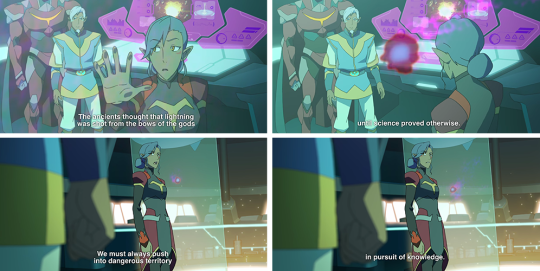
Above, Honvera rebukes Alfor’s caution: “The ancients thought that lightning was shot from the bows of the gods until science proved otherwise. We must always push into dangerous territory in pursuit of knowledge.”
In VLD, Honerva’s Frankenstein-like obsession with quintessence, and her willingness to push further—to break natural boundaries in pursuit of knowledge—is her undoing. Honerva’s tragedy does not stop with herself and her family, as the price of knowledge gained is paid for by the entire universe for 10,000 years.
Part II: The Quest for Secret & Sacred Knowledge In Space.
In Season 5 of VLD, the basic template of a Quest for Secret & Sacred Knowledge appears in the form of the journey to Oriande. The same basic quest template also appears in the Prometheus and Alien: Covenant films.
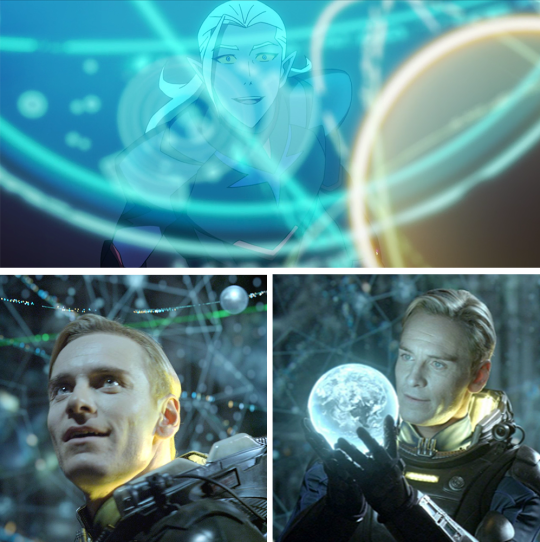
Above, a summary: A pretty, well-spoken, ageless, pale-haired man with a British accent is used-and-emotionally-neglected by his powerful father whom he grows to despise and is treated badly and distrusted by his father’s kind. The father is prideful and has a bit of god complex. After his father’s well-deserved death, the man embarks upon a Quest of Secret & Sacred Knowledge held in a far-off utopia guarded and/or inhabited by Ancient Keepers of Knowledge. His companion to this utopia is his love interest, a petite and well-spoken woman with a British accent who is stronger than she looks, and is instrumental to finding the star map that initiates the quest to begin with. The sought-after secret knowledge has themes of life and creation. These secrets are yielded through life sacrifice and prove to be dangerous in the wrong hands.
I’m not saying that VLD ripped off Prometheus and Alien: Covenant but here we are...
The starting premise of Prometheus is that an exploration mission to planet LV-223 is organized by Peter Weyland, an old and dying CEO who bankrupts his corporation to pay for this mission. He is desperate to find humanity’s creators—called “Engineers” by Elizabeth Shaw and Charlie Holloway—firm in the belief that they will grant him immortality. The location of LV-223 is revealed through the discoveries of star maps in the form of cave drawings by Shaw and Holloway.

Above: Upon arrival to LV-223, the crew discovers a temple and within it are urns containing a mysterious black goo, as well as long dead remains of some Engineers. They quickly discover that this black goo has strange and unexpected properties. It doesn’t go well for them, after all, this is the prequel to the Alien franchise.
youtube
Above, content warning: None. The video clip above shows the discovery of the mysterious urns within the Engineer temple.
So we’ve got cave drawings that function as a star map, a temple constructed by ancient creators keeping the secrets of life, and a mysterious substance that can create powerful monsters via its transmutational properties.
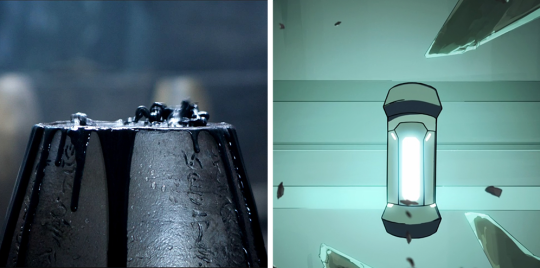
Above: in addition to being an unobtanium power source, some forms of quintessence can have transmutational properties as with the black goo in Prometheus.
Below: a xenomorph derived from a chain of gradual evolutions that began with the black goo and an unlucky victim, and Ranveig’s super weapon, the horror- monster-esque result of experiments with the strange quintessence.

In both Prometheus and Alien: Covenant, this black goo—called “Chemical A0-3959X.91 – 15”—is a weaponized mutagenic pathogen that delivers a modern sci-fi twist on transmutational alchemy and transformation potions. Chemical A0-3959X.91 – 15 evolves non-botanical life, by first destroying it, and then creating something new out of that which it comes into contact.
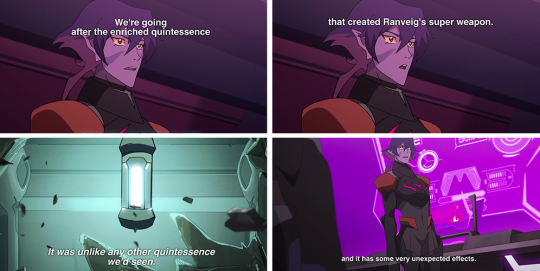
Above: Krolia tells Keith about the quintessence that the BoM have been tracking (two separate scenes). “We’re going after the enriched quintessence that created Ranveig’s super weapon. [...] It was unlike any other quintessence we’d seen. [...] and it has some very unexpected effects.”
How strangely familiar all of this is! Let’s continue.
The Engineers, creators of human life, and their morality:
Throughout Prometheus, the Engineers—the Ancient Keepers of Knowledge—are revealed to embody a Blue & Orange Morality and are the creators of human life (among others) and they sometimes return to judge their creations.

Above: An Engineer asks, “Why does he [Weyland] want more life? What makes this man so great as to ask such a thing?”
youtube
Above, content warning: Video clip of extended/deleted scene where David 8 speaks with an Engineer and Weyland asks for immortality. There is a quick decapitation (bloodless because David 8 is a Synthetic) and some quick impact deaths. No gore. Use the YouTube gear/settings icon to turn on subtitles to see what the Engineer is saying.
Addition/Edit: The video clip above doesn’t link anymore and Tumblr wont’ let me add another video, so here’s the URL until I can re-edit this properly to fix it.
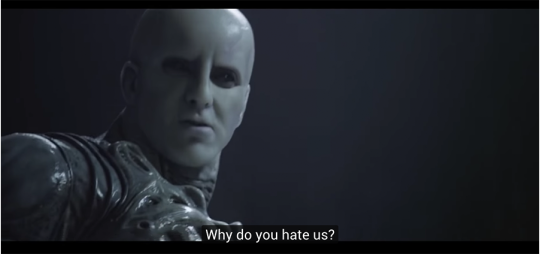
Above: the Engineer directs his cold stare at Elizabeth Shaw who wants answers as to why they were lured to LV-223 to find the weaponized pathogen. She asks “Why do you hate us?”
The Engineers created humanity and have a detached will to wipe the slate clean and start all over again, sacrificing their own lives in the act of new creation. Within their their beliefs and morality, creation and destruction are intertwined. It is death that begets life. What Elizabeth Shaw sees as hate, is just the Engineers’ way of perfecting their own flawed creations. Nothing personal.
The morality of the Engineers later corrupts David 8 (who was already morally gray) during his years of studying them, as he learns their ways during The Crossing, which takes place between Prometheus and Alien: Covenant.
Below: David 8 and Elizabeth Shaw operate the navigation system of the Engineer’s ship in The Crossing.
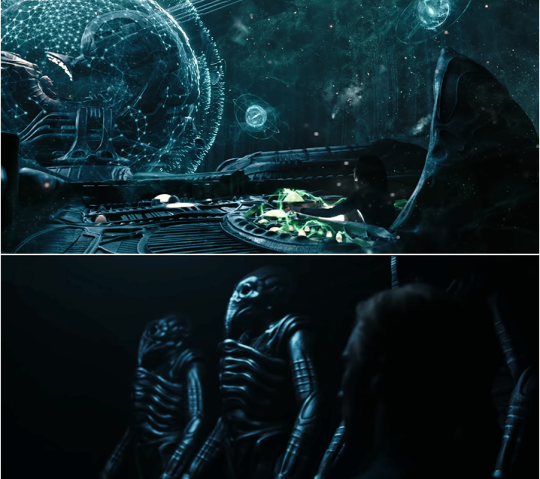
Above: after Shaw is put to sleep in a cryobed, David 8 is left alone to study the Engineers for the remainder of their journey. When they arrive, he has learned their ways and has come to a grim decision of what to do with their weaponized mutagenic pathogen.
youtube
Above content warning: None. This promo video ends just before David 8 unleashes the Engineers’ own weapon against them upon his arrival to their utopia.
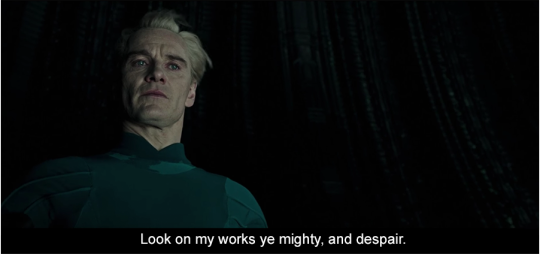
Above: If y’all thought Lotor was dramatic... David 8 overlooks the destruction and cries while reciting a line from Ozymandias. “Look on my works ye mighty, and despair.”
Below, content warning: Video clip with body horror and abstract gore, slightly obscured by dim lighting and desaturated colors during David 8’s destruction of the Engineers.
youtube
As these video clips and images show, the ways of the Engineers—their philosophy and morality—lead David 8 into crossing the Moral Event Horizon. He becomes both a God-Slayer (destruction of the Engineers) and a Creator of Life (cultivation and creation of the Xenomorphs).
About mid-way through Alien: Covenant, David 8 is revealed to have betrayed the person he loved, Elizabeth Shaw, by using her for organ harvesting. The harvesting was necessary for the creation and cultivated evolution of the perfect life-form: the Xenomorph (I’ll spare y’all the images of that).
Through his mastery of the Engineers' knowledge, David 8 becomes the Greater Scope Villain of the Alien franchise. His story is one of triumph. He wins against those who wronged him, against the father that used him and considered him soul-less (thus less than a human), against the humans that created him to be used, and against the Engineers that created a humanity that he sees as unworthy of the gift of creation in the first place. A gift denied to David 8 because he is a Synthetic. All it cost David 8 to gain this gift of knowledge was the sacrifice of the only person who was kind to him (and possibly loved him, that's unclear).
The loss-and-sacrifice of Shaw fulfills the Sacred Knowledge Quest rule that: when knowledge is gained, something is lost.

Above: an Engineer uses the black goo to transmute his own body in order to seed non-botanical life on Earth.
The off-screen sacrifice of Shaw’s life echoes the beginnings of human life shown in the opening of Prometheus where an Engineer seeds life on Earth by sacrificing himself via the pseudo-alchemical transmutation of his own body.
youtube
Above content warning: Abstractly graphic. Not bloody, but the Engineer’s body is slowly disintegrated while being transmuted by the black goo. No gore.
An eerily similar Quest for Sacred & Secret Knowledge mixed with horror appears in VLD, spread out between Lotor’s actions prior to the start of the series, the journey to Oriande in Season 5, and the events in Season 6.
The Life Givers and Altean Alchemy:

In VLD, the Keepers of the Secret & Sacred Knowledge of Altean Alchemy are called the “Life Givers” by Lotor, and the “Sages” by Allura. As shown in the image above, they are described by Lotor as “the first Alteans to unlock the secrets of Oriande, the beginning of Altean Alchemy.”
One of them—presumably a Life Giver—is later shown without corporeal form when speaking with Allura after she passes the White Lion’s trial. Allura is told that she is in the realm of her ancestors—the Alteans and Life Givers—implying that she is one of them for she is “home”.
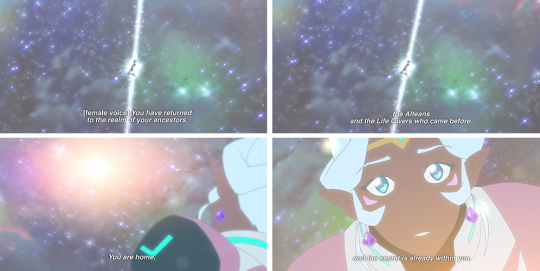
Above: the cosmic voice tells Allura “You have returned to the realm of your ancestors, the Alteans and the Life Givers who came before. [...] You are home, and the secret is already within you.”
For those keeping score: Life Givers = Engineers.
The morality of the Life Givers is unclear as story events—and the aforementioned bundle of Timeless tropes and concepts—suggest Blue & Orange morality, while the implied traits and other in-story associations thus far (ahead of S8) with the Alteans and Alfor suggest that the Life Givers of Oriande embody a morality of Perfectly Good Pureness in opposition to the Galra’s presumed Horribly Evil Darkness. It’s upon examining the actions and beliefs of the Alteans—and thus the Life Givers—that a superficial black-and-white morality starts to give way to a Blue & Orange morality that is incomprehensible in various ways (e.g. the White Lion’s strange condition for obtaining knowledge).
Like David 8, Lotor learns of the Life Givers’ ways prior to arrival at the utopia, only in his case, he does so without realizing it and his understanding is warped by being raised in the Galran belief system. Here, their ways—to give of one’s life, and/or that life must be sacrificed to obtain knowledge—are associated with the Alteans and Lotor's study of Alfor’s work, Altean culture, artifacts, and ancient drawings (until the story unambiguously shows otherwise). Unlike David 8, Lotor’s sacrifice and quintessence harvesting of those who loved-and-worshipped him occurs before entering the utopia (if the events described by Romelle are true). Also, unlike David 8, Lotor’s story is not one of triumph against those who wronged him and others, but like David 8, Lotor was on the path to attaining something greater than his nature would have otherwise allowed.

Above: David 8 delights in the unexpected unlocking of the Engineer’s star map, and both Lotor and Allura are shown the same way when Allura unlocks the star map to Oriande from the compass stone.
In both Prometheus and VLD, the clues to the location of the utopia comes from a combination of ancient cave drawings and navigation devices left behind. These clues form star maps and the like, but are mostly unusable until they are unlocked, by David 8 in Prometheus, and Allura in VLD. As shown above, their respective unlocking and reveals are very similar.
The big difference here is that in Prometheus, there are two star maps: (1) the initial star map—derived from cave drawing to reveal the location of planet LV-223—is discovered and deciphered by Elizabeth Shaw and Charlie Holloway; and (2) the star map in the navigation room that reveals the location of the Engineer’s home world (a utopia called ‘paradise’ in their language). Thus, in Prometheus, the Quest for Secret & Sacred Knowledge is divided into two parts, with the second part to be completed prior to Alien: Covenant in The Crossing.

Above: that’s one hell of a mouth on these monsters (Hammerpede and Deacon from Prometheus, and Ranveig’s super weapon from VLD).
Given how closely Oriande and Lotor’s role in that part of VLD’s story parallels David 8’s in Prometheus, I would not be surprised if Ranveig’s Super Weapon was informed by Xenomorphs, especially since the transmutational properties of the black goo would find a correlation in the strange effects of the quintessence found by Ranveig.

Above: Allura passes the White Lion’s trial by being non-violent and speaking to its philosopy. “I seek the secret of life. I give my own.”
For Allura’s part, unlike Shaw, she survives the Quest for Secret & Sacred Knowledge. Her willingness to self-sacrifice during the White Lion's trial, for the sake of knowledge, relates to Shaw’s unwilling sacrifice in Prometheus. Both sacrifices lead to knowledge. Allura for her own gain (in addition to Lotor’s), and Shaw for David’s gain.
The key here is that both stories demand a sacrifice of life for knowledge, and the knowledge obtained has to do with the power of creation and life with alchemical themes (transmutational).
That’s heavy stuff. It’s mythic level. These are themes found throughout humanity’s oldest stories, myths, and religions. It’s the stuff of Warring Gods, Capricious Fair Folk, Geas and Mystic Debts, and Divine Retribution, and Tragic Fates.
Which brings us back to Anon’s question about the White Lion:
“Why is the condition for obtaining the knowledge so stupid? Give up your life?”
Superficially, the White Lion is just another DotU reference. There’s nothing deep or meaningful about it on its own.
Thematically, the White Lion’s Trial is similar to the Blade of Marmora’s Trial. The BoM’s creed “Knowledge or Death” is informed by the Galra creed “Victory or Death”, both of which are contrasted by Allura’s words to the White Lion: “I give my own [life].”
It’s most likely that’s all there really is to the White Lion and Oriande, and thus there is nothing else here to dig at as far as the story is concerned. “Give up your life” for knowledge is merely a part of the aforementioned package of Timeless tropes and concepts that are frequently found in Quests for Secret & Sacred Knowledge and other Ur Stories.
But for the sake of meta, I’ll pretend that there is more to the White Lion and the Life Givers of Oriande.
To recap: within the context of Ur Stories, the White Lion and the Life Givers of Oriande are Keepers of Knowledge. The White Lion is the kind bound by some form of morality that dictates who gets access and how it tests those who seek it, while the Life Givers bestow it. Prometheus and Alien: Covenant are a recent example of this kind of story, and a similar tale plays out in VLD.
Part III: The Case for Blue & Orange Morality.
From the start, the White Lion’s requirements have their bias in Altean-ness, but not just any Altean-ness. A “worthy” Altean. Given that Alfor, Lotor, Allura, and Haggar were all worthy to enter Oriande, their past actions or goals/desires were less important, or not even a consideration. Thus, worthy Altean-ness is arbitrary from the outside, but must suit the Blue & Orange morality of the White Lion in some way. Additionally, only the worthy can pilot the lions of Voltron (depending upon where we are in the series and when the requirement lore is discussed or retconned), and yet none of them could enter Oriande. Why is that? What made Lotor—a half-Altean who Did Bad Things™—more worthy than Lance who was chosen to be the paladin of two different Lions? This arbitrary worthiness contradicts the symbolism of the Guardian being a “White Lion” that ties it to Voltron (and possibly the Lion Goddess worship of the Arusians). Such contradictions are reasonable to expect out of Blue & Orange morality.
However, if the White Lion and Oriande were meant to embody the Perfectly Good Pureness of the Alteans, then that raises a lot of questions about why Lotor and Haggar were able to enter while the paladins were not. While Haggar is shown to be using her magic, and possibly over-powering the White Lion and the Life Givers, I’ll explain why that might not be the case. Alternatively, this contradiction reveals a huge plot hole.
In the case of Blue & Orange morality, anyone being allowed to enter is questionable, as typically, Powerful Eternal Entities Protecting Sacred Knowledge who adhere to Blue & Orange morality often have their own motivations, plans, goals, etc that involve the use of the Knowledge Seeker in some way. In other words, the White Lion and the Life Givers may have their own agenda, and any who enter Oriande are at risk of being used to further it (either knowingly, unknowingly, cooperatively, or uncooperatively).
Oriande calls back to those Ur Stories, because one doesn't set up Blue & Orange morality behind a Quest for Secret & Sacred Knowledge in a setting like VLD without a plot twist revealing Something to embody that morality as an obstacle to the protagonists at the 11th Hour (if consistency in world-building and adherence to genre conventions were to apply). Thus, we are looking at Playthings of the Gods, or a Greater Scope Villain scenario that has something to do with Oriande. This also means that at least one of these four: Alfor, Lotor, Allura, and Haggar, were lured to Oriande for the purpose of Something Else.

Above: Haggar emerges from the temple, sparkling with divine purpose, and is restored as Honerva.
Haggar’s restoration into Honerva all but seals Blue & Orange morality for me. She got a huge pay-off from Oriande, and from the protagonist-centered morality PoV, she was the least worthy to enter, and so far appears to have paid no price. Additionally, in some stories with Blue & Orange morality, Haggar’s 10k years of reaping quintessence from the destruction of planets (and every living thing) would be seen as a necessary process to maintain the balance of creation. As in Prometheus, Death begets Life.
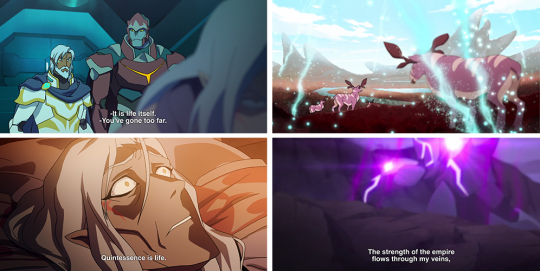
Above: Honerva equates quintessence with life twice in The Legend Begins. The Komar is used to reap quintessence from a planet in Taking Flight. And when Zarkon powers himself up during his fight with Lotor in Blood Duel, he does so with the quintessence that has been collected for the use of the Empire.
Thus, when Zarkon says “the strength of the Empire flows through my veins” he means that literally and symbolically. He is made stronger through all of the life energy reaped within his empire, every living thing which has died is within him. Through Honerva’s work, Death begets Life (a cursed life perhaps, but life all the same).
Why Perfectly Good Pureness doesn’t work:
If the White Lion and Oriande were meant to embody Perfectly Good Pureness, then that makes the entrance of Haggar and Lotor highly questionable.
Either that’s flawed writing, or there is something else is going on that’s not adding up:
Lotor is revealed to have harvested quintessence from Alteans (which may not be the full story), and Altean-ness is a pre-requisite to enter Oriande, and Allura is Altean while Lotor is half-Altean. But Allura is also implied to be a Life Giver and that Oriande is her home, meaning that the Life Givers and Altean-ness are closely-related. If what Romelle said about Lotor was true, by any stretch of Perfectly Good Pureness morality, the White Lion should not have given Lotor the all-clear signal in the form of Marks of the Chosen due to Lotor's past sin of evil acts against Alteans. So either his past with the Alteans at the Colony do not qualify as evil (which contradicts Perfectly Good Pureness), or those actions didn’t happen in the way that Romelle described them.
If Lotor wouldn’t have been worthy to enter Oriande due to his past actions, then that could mean that he was allowed to enter for the sake of having brought Allura there, his failure of the White Lion’s Trial foreseen and thus no risk of him gaining the sacred knowledge. This means that he was used by the Life Givers to serve their purpose.
Further, being half-Altean wasn’t a barrier to Lotor, which means that he must have something else in common with Allura to qualify in this scenario which brings us to...
If Life Givers and Altean-ness are closely related, and if Allura is both a Life Giver and an Altean, then either all Alteans are Life Givers, or only some are, as implied by Lotor in the temple. That it was those first Altean alchemists who to came to Oriande and they are the Life Givers. But the Life Giver that Allura speaks to says that the secret is already inside of her. Why would she even need to go there? Was that true of the first Altean alchemists as well? This smells a lot like Allura is host to a cosmic entity and those stories don’t usually end well for the host (e.g. Dark Phoenix from the X-Men). In which case, the Perfectly Good Pureness morality doesn’t work, as why are the Life Givers using Alteans as hosts? And if they use Alteans as hosts…do they discriminate against half-Alteans? And why do they hide their knowledge behind an arbitrary test?
Haggar should not have been able to get anywhere near Oriande for obvious reasons.
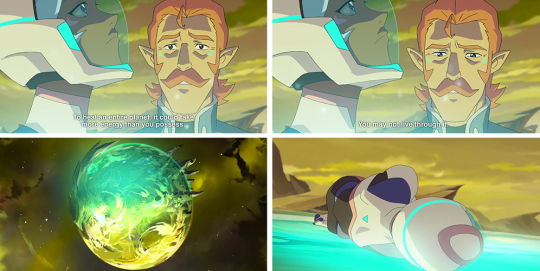
Above: Allura embodies the Life Givers’ philosophy when she risks herself to heal the dying Balmera in Rebirth. Coran says “To heal an entire planet, it could take more energy than you possess. You may not live through it.”
Even before entering Oriande, Allura had enough quintessence—life energy—to heal a dying Balmera. Do all Life Givers have that much quintessence within them? Does this mean that the Life Givers were on par with Allura prior to her entry to Oriande? If so, what power is Oriande giving them that they didn’t already possess? Within the context of Quests for Secret & Sacred Knowledge, it appears that the secret knowledge is about how to use that power to its fullest extent. Surely that comes with a price?
Anon also asks: “How did Haggar get that knowledge?”
Haggar gets the knowledge in the same way that Allura did, by being worthy to enter, and, either by knowing the philosophy behind the White Lion’s trial or by over-powering the White Lion and the Life Givers. The former can appear to be a stretch, but the latter doesn’t make a lot of sense.

Above: Haggar at Oriande, her own Marks of the Chosen, and the difference between her encounter with the Sage Statues and Allura and Lotor’s encounter.
In Season 6, Haggar arrives at Oriande’s location, her Marks of the Chosen appear, thus she gets the ‘all clear’ signal from the White Lion. Haggar is worthy of Oriande. She then enters the temple where we see her doing one of her casting circles as the Sage Statues (e.g. the Life Givers in statue form) are poised to attack.
In the case where the White Lion and Oriande embody Perfectly Good Pureness, it would be necessary for Haggar to over-power them in order to enter as she could not be considered worthy unless Blue & Orange morality applied. At the very least, Haggar was deemed worthy by the White Lion’s arbitrary requirements. So did Haggar over-power the Sage Statues, or did she offer them a gift as Allura did?

Above: Haggar and her druids transferring quintessence to Zarkon, and Allura and the Balmerans transfer quintessence to heal the Balmera.
We’ve seen Haggar and her druids use similar orientations and positions as Allura and the Balmerans do when channeling their quintessence into another being such as Zarkon, or in the case of Naxella, a planet. When they attack with quintessence, and when they reap quintessence via the Komar, their positions are different. This channeling position is used by Haggar in Oriande when she meets the Sage Statues (again, the Life Givers in statue form).
So either Haggar gave them a gift, or she over-powered them. But if Haggar can overpower the Life Givers…then why does she need the secrets of Oriande?
To put it another way, if Haggar can over-power beings capable of (at a bare minimum) restoring a Balmera as Allura did, but after they have ascended to be part of Oriande (so even more powerful right?) then what Secret & Sacred Knowledge could the Life Givers of Oriande possibly bestow upon her that would make any of that effort and risk worth it? Is there something else in Oriande that she may have been after instead?
What secrets are so powerful, that Haggar—who by this line of logic may as well be all-powerful herself—needs them to fulfill her goals?
These same secrets are also now known to Allura, though the argument can be made that Haggar-now-Honerva had much more time to study them properly. These secrets have unlocked Allura’s potential, giving her—as Lotor says during their battle in S6—“all the power in the universe”. Hypothetically, Honerva has unlocked this power within herself as well.
And this is why we've got a case of Blue and Orange morality. For so long as one fulfills some arbitrary requirements, then one is allowed in. The next parts, getting past the Life Givers in the form of the Sage Statues, and passing the White Lion’s Trial relate back to the Blade of Marmora. For the BoM, one has to be thinking like them to pass (Knowledge or Death). For the White Lion and the Life Givers, one has to understand the philosophy underlying their Blue & Orange morality, which in this case, is giving up life for knowledge. Piece of cake for Allura, quite likely easy for Haggar too, not so for Lotor. Understanding their philosophy is alignment agnostic, both the good and the evil can know it and put it to use.
In Lotor’s case, he failed the White Lion’s alignment-agnostic philosophy exam. Even though he learned their ways enough to replicate some of Alfor and Honerva's accomplishments, and got as far as he did, (and I’d argue to understand the bigger picture of what is necessary to bring peace to the universe). He failed because the Galra philosophy of “Victory or Death” came out in him as the White Lion’s threat triggered that philosophy in addition to his desperation to achieve his goal (which in S6E1 we see hints of his anxiousness towards not being delayed further from). He did not fail due to moral alignment.
From Lotor's PoV—as stated by Anon—“It seems natural to fight, when lives of people depend on your success.” This natural way can easily fall under the Galra’s “Victory or Death”, and leads Lotor to fail, therefore it must be at odds with the morality and/or philosophy of the White Lion and the Life Givers. If not, then it at the very least, it must be at odds with how the Life Givers intend for Altean Alchemy to be used, just as Prometheus’ use of the Gift of Fire went against how Zeus and the gods intended for it to be used.
Thus, Lotor is a Promethean character, setting him against Life Givers' and the White Lion’s morality as he wants to take their Gift (e.g. Altean Alchemy via Allura) for another use, as Anon said: “He needed that knowledge so his own “Voltrons" would work with Alteans from Colony.”
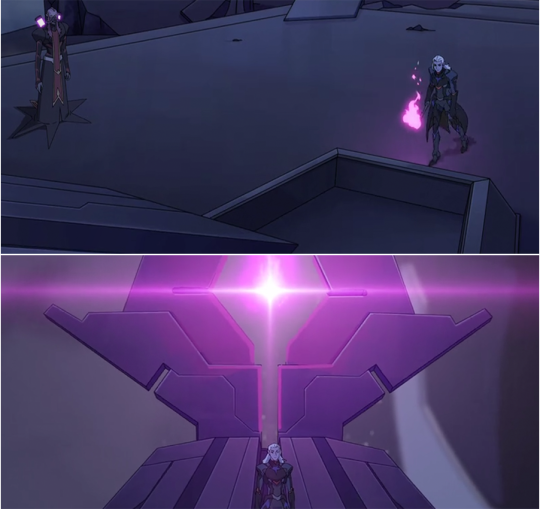
Above: Lotor lights the flame at Kral Zera and double-dipping into flame symbolism.
That other use, what amounts to Altean Alchemy For All, is one that the White Lion’s trial exists to prevent by way of only allowing worthy Alteans to enter. Those worthy Alteans are ‘sacred’, and it is not much of a stretch to assume that they may have once derived their social status from being the only Alteans who can wield this secret power.
While I’m not completely sold on “Voltrons with Alteans” being Lotor's reasoning (definitely for Honerva though), that still aligns with his Dark Savior obsession underlying his desire for power to defend the Alteans himself, or, to enable the Alteans to defend themselves (remember his words to the Puigian leader about how Voltron left the Puigians defenseless). However, Lotor's stated goal—giving unlimited quintessence to the universe for the sake of peace—is analogous to Prometheus taking Fire from Olympus so that the mortals could use its heat and improve their lot. Further, like Prometheus, Lotor is divinely punished for his actions, for via Allura, Lotor stole the means to unlimited quintessence for all (e.g. the Fire) from Oriande and the Life Givers (e.g. Olympus and the Gods).
Divine Punishment:
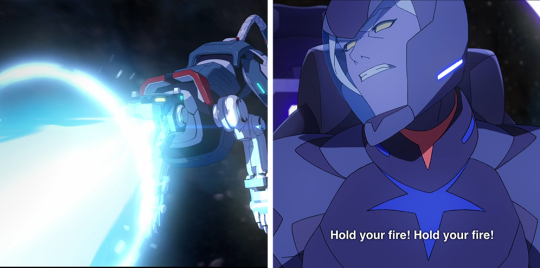
Above: Allura attacks first while Lotor pleads with her. Lotor responds by ordering his generals to hold their fire.
Lotor's divine punishment comes from Allura. Allura takes up a “fight first” instinct multiple times throughout the story, the same instinct that caused Lotor to fail the White Lion’s trial. Allura fights first even though she is from a race that we’re told are excellent diplomats, whose culture and mythological beings (e.g. White Lion and the Life Givers) appear to embody a “giving one’s life rather than fighting” philosophy. This philosophy is what motivated Allura to restore the Balmera at risk of her own life, but her fight first moments throughout the story contradict that philosophy, as well as her readiness to fight rather than embrace a diplomacy-first approach in the case of Ulaz and Kolivan. Allura embraces diplomacy-first when it is easy and convenient.
Two of these fight first times—yeeting Lotor when he was no threat, and attacking Lotor when he was pleading with her—occur after she gained the knowledge of Altean Alchemy from Oriande. I’m not saying that Allura was’t emotionally justified, but part of being the Special Sacred One, is that one is usually required to control those impulses in exchange for the sacred power and knowledge.
In stories where there is a “Here’s this Mythic Sacred Thing you got because of a Quest to a Special Place” event, there are usually conditions upon the continued use of the Thing. Acting against the precepts or philosophy or morality embodied by the Bestowers of the Thing is a Big Deal. It is such a Big Deal, that this conflict appears in stories from nearly every mythology or religion, even if only in the form of the smallest side-story of a minor hero or prophet (e.g. Enkidu from Gilgamesh, or “Don’t look back” for Orpheus and Eurydice).
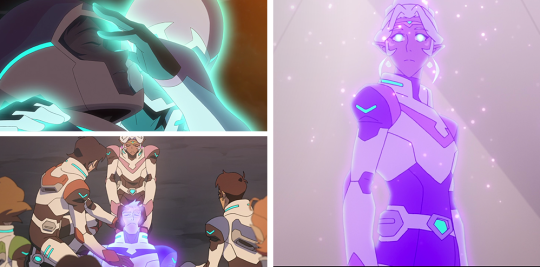
Above: Allura’s power over life on display.
Allura’s got this awesome power now, and it didn’t cost her anything.
That breaks the Quest for Secret & Sacred Knowledge story code (risking her life to not defend against the White Lion barely counts). Allura can bring Lance back to life, shift Shiro’s soul into the body of another person a clone, and myriad other all-powerful plot-friendly things. Yet there is no geas placed upon her? No requirement that she continue to embody the philosophy that allowed her to pass the White Lion’s trial in the first place?
It appears as though Allura's awesome power is inconsistent for when it’s available (cough Plot cough), as in Season 7, she’s a quintessence power house during the fight with Macidus, but she couldn’t save Sanda as she did with Lance?
In the context of Ur Stories, when a Seeker of Knowledge has gained a gift of knowledge and not immediately paid a price—such as when Odin gives an eye for a drink from Urd’s Well of Knowledge—then that Seeker usually has to continue to embody what made them worthy to get the gift in the first place. Or, they must complete some kind of Task or observe a taboo, otherwise they risk the wrath of those who bestowed the gift or lose access to the gift. As Allura does not yet appear to have lost her power, then she may have a Task to complete instead. Violating the seemingly pacifist philosophy of the Life Givers to deliver divine punishment to Lotor may have been permissible given the circumstances.
Finally—Part IV: Payment is Coming Due
While I still doubt that there is anything more to the White Lion than a nod to DotU combined with a basic Quest for Secret & Sacred Knowledge (thus explaining the White Lion’s strange condition for such knowledge), it’s still possible that this is leading to something mythic inline with Ur Stories, especially given VLD’s hellscape setting, dark tone, and love of tragedy. Season 8 could bring us a Playthings of the Gods scenario pitting Allura versus Honerva for reasons beyond the obvious (e.g. a plot twist), or, a tragic fate awaits Allura due to something as classic as Alfor flaking on a Task or Debt asked of him for the knowledge he gained at Oriande (another plot twist).
In many stories where a similar arc or backstory occurred, Alfor should have come back with a Task or a Debt to be called upon at some later date (often tragic and inconvenient). That Task could have been the creation of Voltron, that Debt could have been Allura’s life.
Remember the “I give my life” philosophy?
Time to pay up.
Alfor may have hidden Voltron and Allura from Zarkon, if doing so meant that they would avoid a Tragic Fate for which they were intended by the Life Givers, in exchange for bestowing the secrets of Altean Alchemy upon him. His actions then—in classic Greek tragedy fashion—made the situation immeasurably worse, and the universe paid the price.
Tragic endings are what happens when you back out on a Mystic Deal, or when you try to avoid Fate.
177 notes
·
View notes
Text
Interesting
Personally I really dislike the theory Lotor doesn’t know Honerva became Haggar because you have to consider like…

At the end of her life Honerva looked like this. She has Haggar’s hairstyle and Haggar’s fashion sense and is halfway to Haggar’s markings.
Are we really insinuating Lotor- who’s so attentive to detail that he was able to immediately smell a rat with Voltron not living up to their own legends and put his finger on the probable cause almost completely accurate to what was happening- went in a cyropod, and actually woke up with the question of “wow, gosh, where did my white-haired mother with that strange distinctive way her markings changed after she was exposed to the rift go, and who is this white haired woman with incredibly similar markings hanging around Zarkon that he shows clear favoritism for?”
Lotor talks respectfully about Honerva’s work. The implication to me is he was fond of her once. He looked up to her once.
And that, I think, perfectly contextualizes the level of not just fear and revulsion he has towards Haggar’s abusive behavior, but the sheer amount of unloaded bitterness he levers towards the even idea of her.
Because Haggar’s thrown away everything about her past self that he used to respect about her. Even regaining her memory she didn’t have a shred of remorse that we’ve seen and her cautiously, fearfully staring at her own face is contextualized with her immediately ordering someone’s torture and shortly afterwards setting Lotor up to, without exaggeration, ruin his life. Remembering Zarkon is her husband prompts some tiny echo of softness from her, but remembering Lotor is her son is something she doesn’t even acknowledge. Her expression doesn’t change when Zarkon strips Lotor of his status and declares him a fugitive to be killed on sight. Maybe that bothered her and she’s just covering it- but she literally made that possible. Every time Lotor and Zarkon have come into conflict that we’ve seen, Haggar unblinkingly takes Zarkon’s side even when it actively hurts Lotor, and her own intrusions, for her own reasons, are even more destructive.
Even calling Lotor a “mother’s boy” for his respect of Honerva irks me because everything we know about Honerva suggests she was probably kind of a cold parent who got worse and worse. It’s not just visually that she was practically Haggar at the point when Alfor confronts her- we see that she doesn’t acknowledge Kova any more as anything but a test subject she’s eager to talk about the implications of.
#voltron legendary defender#vld#Haggar#Honerva#Lotor#child abuse /#these guys are just really not good parents#vld meta
338 notes
·
View notes